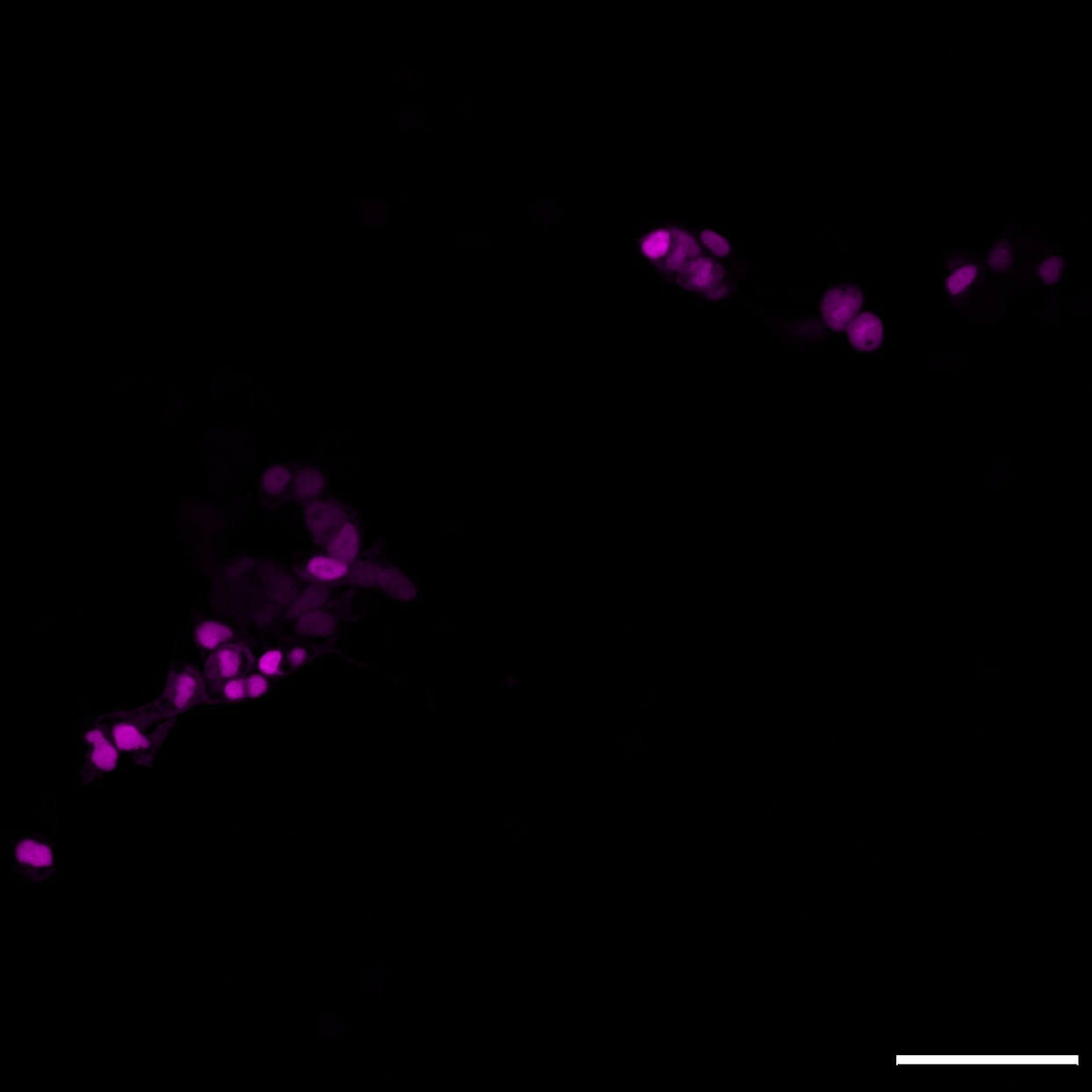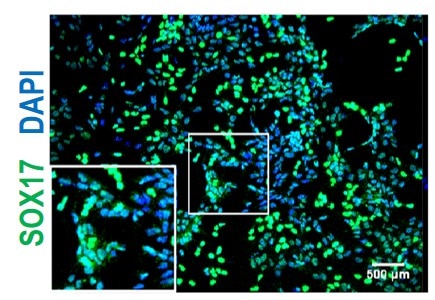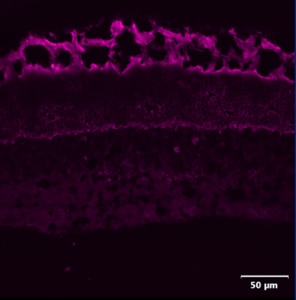Human SOX17 Antibody Summary
Asp177-Val414
Accession # Q9H6I2
Applications
Please Note: Optimal dilutions should be determined by each laboratory for each application. General Protocols are available in the Technical Information section on our website.
Scientific Data
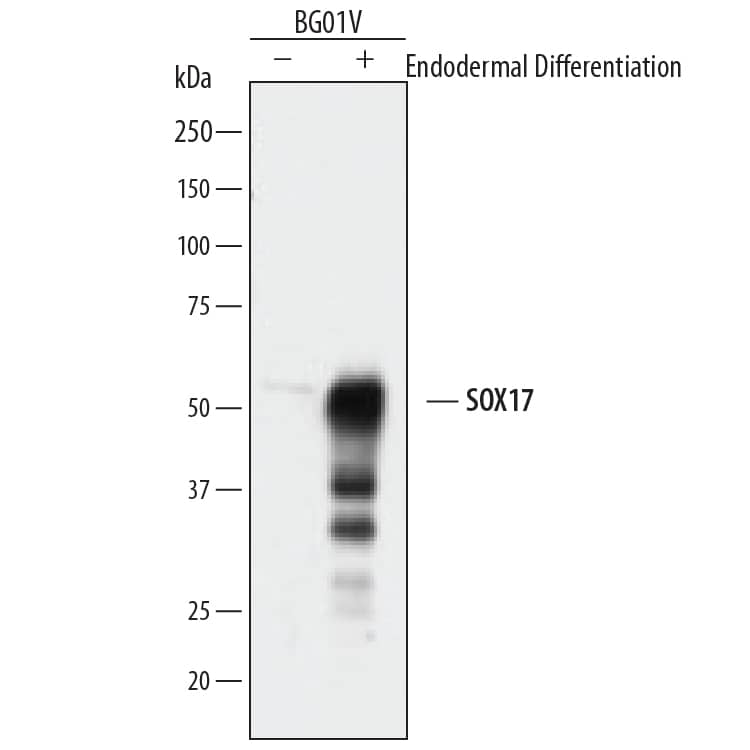 View Larger
View Larger
Detection of Human SOX17 by Western Blot. Western blot shows lysates of BG01V human embryonic stem cells untreated (-) or endoderm differentiated (+). PVDF membrane was probed with 1 µg/mL of Goat Anti-Human SOX17 Antigen Affinity-purified Polyclonal Antibody (Catalog # AF1924) followed by HRP-conjugated Anti-Goat IgG Secondary Antibody (HAF109). A specific band was detected for SOX17 at approximately 55 kDa (as indicated). This experiment was conducted under reducing conditions and using Immunoblot Buffer Group 1.
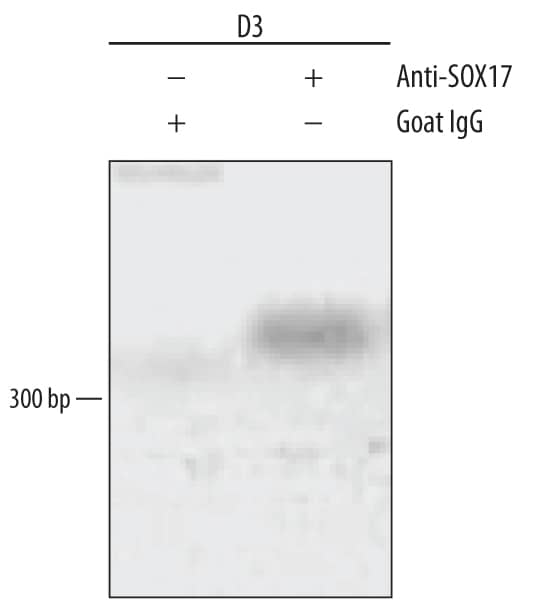 View Larger
View Larger
Detection of SOX17-regulated Genes by Chromatin Immunoprecipitation. Endoderm-differentiated D3 mouse embryonic stem cell line was fixed using formaldehyde, resuspended in lysis buffer, and sonicated to shear chromatin. SOX17/DNA complexes were immunoprecipitated using 5 µg Goat Anti-Human SOX17 Antigen Affinity-purified Polyclonal Antibody (Catalog # AF1924) or control antibody (AB-108-C) for 15 minutes in an ultrasonic bath, followed by Biotinylated Anti-Goat IgG Secondary Antibody (BAF109). Immunocomplexes were captured using 50 µL of MagCellect Streptavidin Ferrofluid (MAG999) and DNA was purified using chelating resin solution. Thep21promoter was detected by standard PCR.
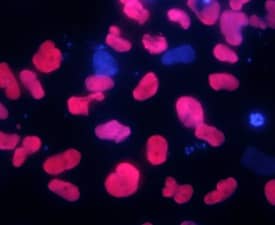 View Larger
View Larger
SOX17 in B16 Mouse Cell Line. SOX17 was detected in immersion fixed B16 mouse melanoma cell line using 10 µg/mL Goat Anti-Human SOX17 Antigen Affinity-purified Polyclonal Antibody (Catalog # AF1924) for 3 hours at room temperature. Cells were stained with the NorthernLights™ 557-conjugated Anti-Goat IgG Secondary Antibody (red; NL001) and counter-stained with DAPI (blue). View our protocol for Fluorescent ICC Staining of Cells on Coverslips.
 View Larger
View Larger
SOX17 in Human BG01V Cells. SOX17 was detected in immersion fixed endoderm differentiated BG01V human embryonic stem cells using 10 µg/mL Goat Anti-Human SOX17 Antigen Affinity-purified Polyclonal Antibody (Catalog # AF1924) for 3 hours at room temperature. Cells were stained with the NorthernLights™ 557-conjugated Anti-Goat IgG Secondary Antibody (red, upper panel; NL001) and counterstained with DAPI (blue, lower panel). View our protocol for Fluorescent ICC Staining of Cells on Coverslips.
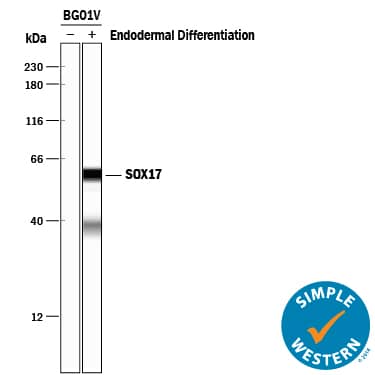 View Larger
View Larger
Detection of Human SOX17 by Simple WesternTM. Simple Western lane view shows lysates of BG01V human embryonic stem cells untreated (-) or endoderm differentiated (+), loaded at 0.2 mg/mL. A specific band was detected for SOX17 at approximately 59 kDa (as indicated) using 10 µg/mL of Goat Anti-Human SOX17 Antigen Affinity-purified Polyclonal Antibody (Catalog # AF1924) followed by 1:50 dilution of HRP-conjugated Anti-Goat IgG Secondary Antibody (Catalog # HAF109). This experiment was conducted under reducing conditions and using the 12-230 kDa separation system.
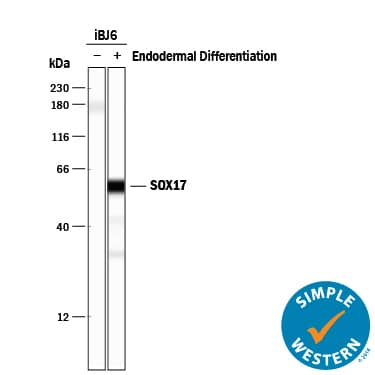 View Larger
View Larger
Detection of Human SOX17 by Simple WesternTM. Simple Western lane view shows lysates of iBJ6 human induced pluripotent stem cell line untreated (-) or endoderm differentiated (+), loaded at 0.2 mg/mL. A specific band was detected for SOX17 at approximately 58 kDa (as indicated) using 10 µg/mL of Goat Anti-Human SOX17 Antigen Affinity-purified Polyclonal Antibody (Catalog # AF1924) followed by 1:50 dilution of HRP-conjugated Anti-Goat IgG Secondary Antibody (Catalog # HAF109). This experiment was conducted under reducing conditions and using the 12-230 kDa separation system.
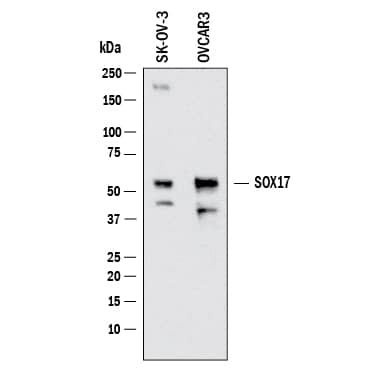 View Larger
View Larger
Detection of Human SOX17 by Western Blot. Western blot shows lysates of SK‑OV‑3 human ovarian adenocarcinoma cell line, OVCAR‑3 human ovarian carcinoma cell line. PVDF membrane was probed with 2 µg/mL of Goat Anti-Human SOX17 Antigen Affinity-purified Polyclonal Antibody (Catalog # AF1924) followed by HRP-conjugated Anti-Goat IgG Secondary Antibody (Catalog # HAF017). A specific band was detected for SOX17 at approximately 60 kDa (as indicated). This experiment was conducted under reducing conditions and using Western Blot Buffer Group 1.
 View Larger
View Larger
Detection of Human SOX17 by Immunocytochemistry/Immunofluorescence. Generation and characterization of systemic lupus erythematosus (SLE)‐specific human‐induced pluripotent stem cells (hiPSCs). Immunostaining of Otx2 (ectoderm marker), Sox17 (endoderm marker), Brachyury (mesoderm marker) and co‐staining with DAPI (blue) in embryoid bodies (EBs) derived from hiPSCs‐SLE. Scale bar, 50 μm. Image collected and cropped by CiteAb from the following publication (https://pubmed.ncbi.nlm.nih.gov/31536674), licensed under a CC-BY licence.
 View Larger
View Larger
Detection of Human SOX17 by Immunocytochemistry/Immunofluorescence. Concordant expression of developmental programs across organoids from human iPSC lines. IF staining of D29 kidney organoid (AS line, ML protocol) for SOX17 and CD31, markers of endothelial cells. Image collected and cropped by CiteAb from the following publication (https://pubmed.ncbi.nlm.nih.gov/31784515), licensed under a CC-BY licence.
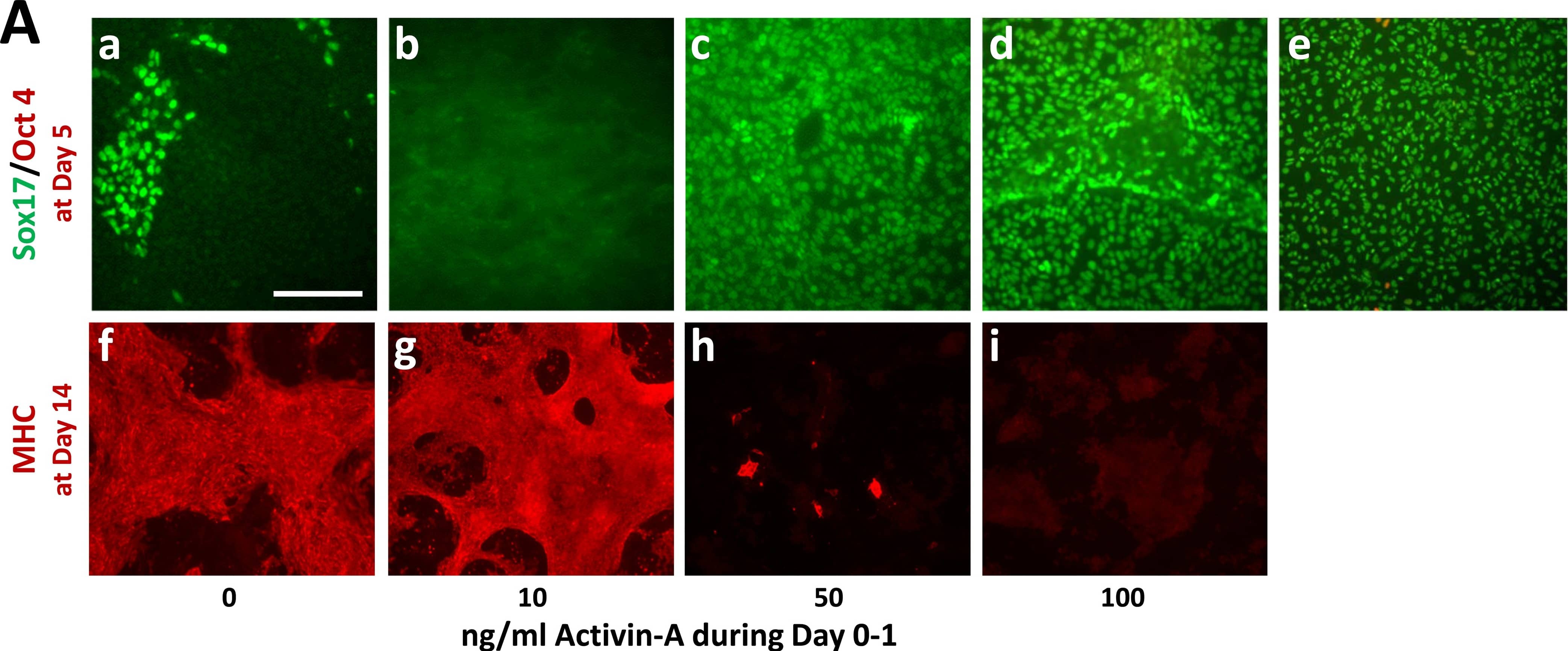 View Larger
View Larger
Detection of Human SOX17 by Immunocytochemistry/Immunofluorescence. Activin-A levels during Day 0–1 modulate cardiomyocyte (CM) vs. definitive endoderm (DE) differentiation. Pluripotent H1 ESCs were induced by changing medium to RPMI/B27 (no insulin), including CHIR (7.5 μmol/L) during Day 0–1 and IWP (5 μmol/L) during Days 3–5. Activin-A was included at the indicated levels during Day 0–1. Insulin (4,000 ng/ml) was included after Day 7. a-e shows cells double-immunostained on Day 5 for Oct4 (red) and Sox17 (green); e is a positive control wherein cells were induced to DE with Activin-A (50 ng/ml) and Bmp4 (10 ng/ml) during Days 0–5. f-i shows cells immunostained with MF20 mAb on Day 14 to detect cardiomyocytes. Scale bar: 200 μm. Image collected and cropped by CiteAb from the following publication (https://dx.plos.org/10.1371/journal.pone.0118670), licensed under a CC-BY licence.
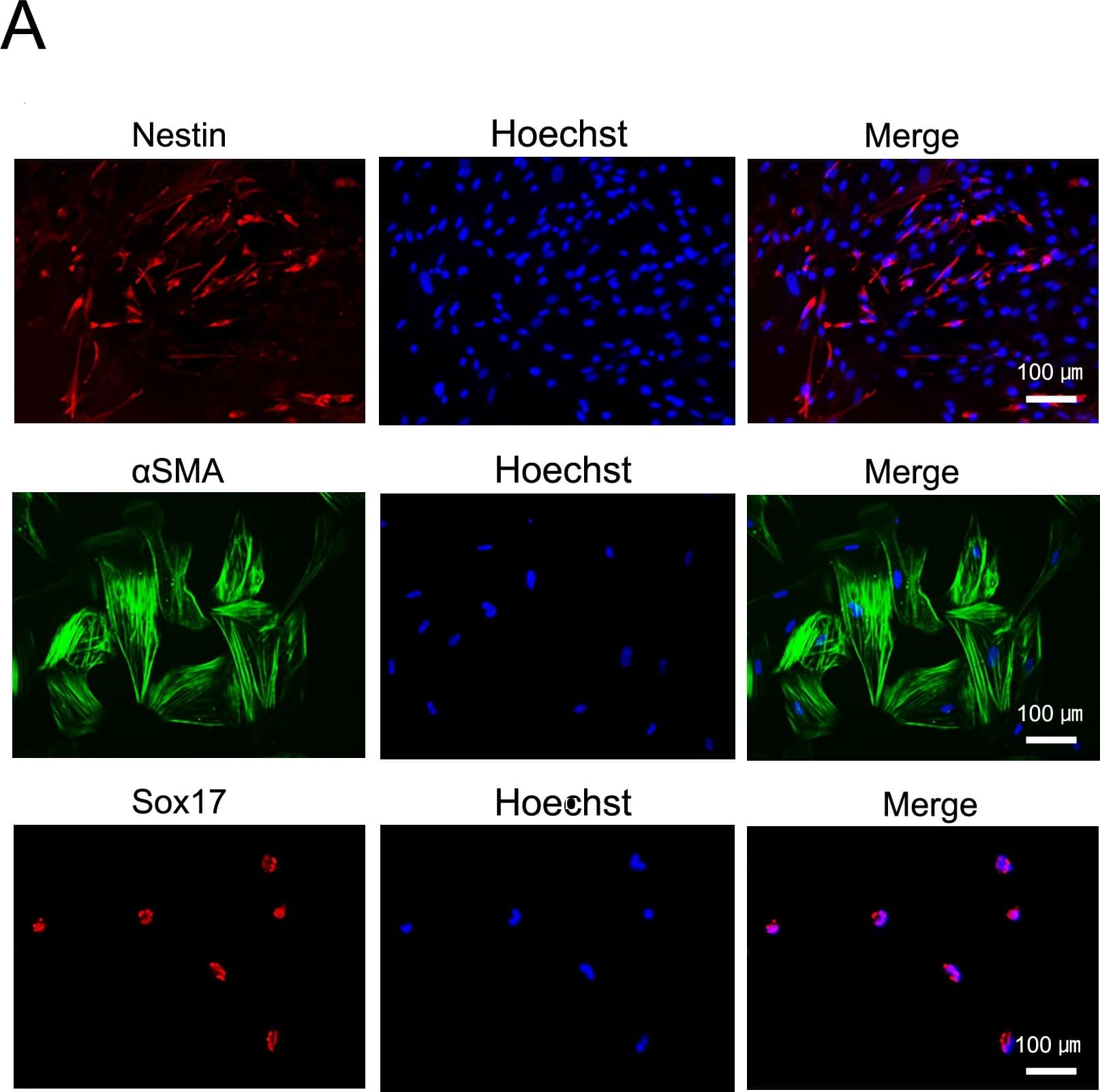 View Larger
View Larger
Detection of Human SOX17 by Immunocytochemistry/Immunofluorescence. In vitro and in-TiPSCs. Immunofluorescence staining for Sox17 (endodermal marker), alpha SMA (mesodermal marker), and Nestin (ectodermal marker) in each human TiPSCs1-derived differentiated cell in vitro. Image collected and cropped by CiteAb from the following publication (https://dx.plos.org/10.1371/journal.pone.0097397), licensed under a CC-BY licence.
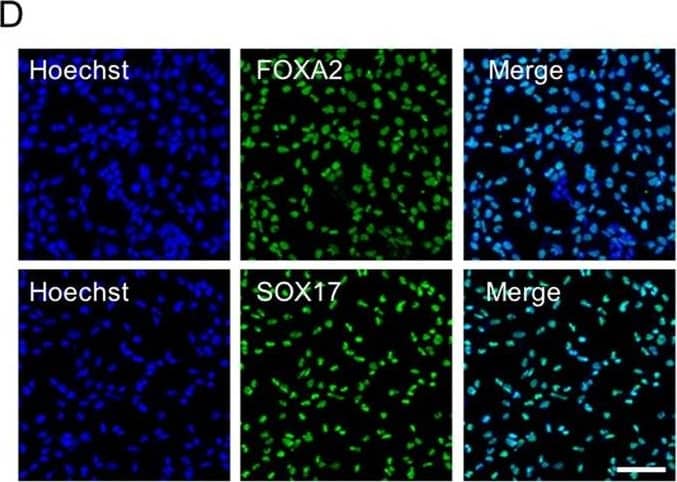 View Larger
View Larger
Detection of Human SOX17 by Immunocytochemistry/Immunofluorescence. Differentiation of hESCs into definitive endoderm cells by Activin A with CHIR99021. Immunofluorescence analysis of the expression of SOX17 and FoxA2 for Activin A with 2 µM CHIR99021-induced differentiated cells on day 3. Scale bar, 100 µm. Image collected and cropped by CiteAb from the following publication (https://pubmed.ncbi.nlm.nih.gov/31601782), licensed under a CC-BY licence.
 View Larger
View Larger
Detection of Mouse SOX17 by Western Blot. HIF-1 alpha activates transcription of Sox17. Western blot analysis in control human lung microvascular endothelial cells (HLMVECs) and HLMVECs for which CRISPR/Cas9 was used to delete HIFs. ECs were treated with the HIF prolyl hydroxylase inhibitor DMOG to induce HIF expression. DMOG (1 mM) increased HIF-1 alpha and HIF-2 alpha protein expression in control ECs but not in ECs lacking HIF-1 alpha or HIF-2 alpha. Induction of HIF expression was coupled to Sox17 upregulation. n = 3. Image collected and cropped by CiteAb from the following publication (https://pubmed.ncbi.nlm.nih.gov/31073164), licensed under a CC-BY licence.
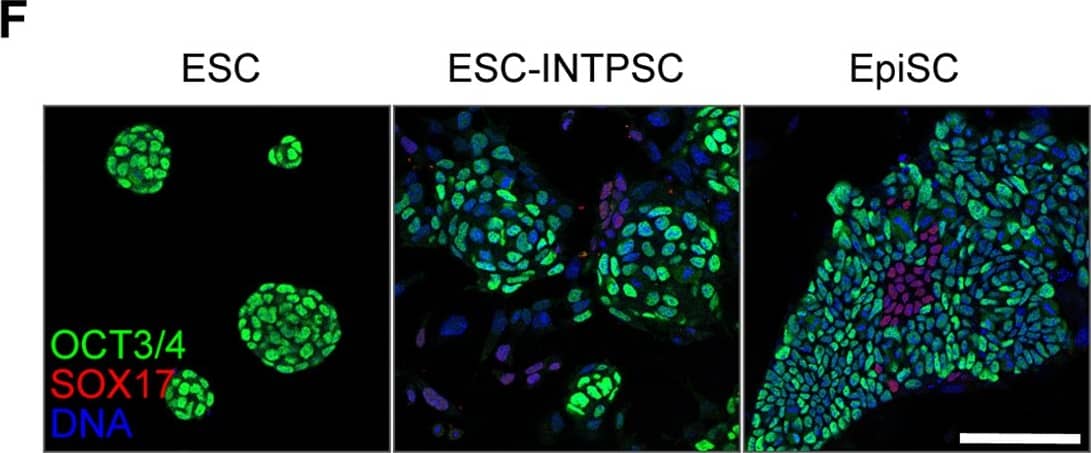 View Larger
View Larger
Detection of Mouse SOX17 by Immunocytochemistry/Immunofluorescence. Features of ESC-INTPSCs intermediate between ESCs and EpiSCs. Expression of OCT3/4 and SOX17. Scale bar, 100 µm. Image collected and cropped by CiteAb from the following publication (https://dx.plos.org/10.1371/journal.pone.0095329), licensed under a CC-BY licence.
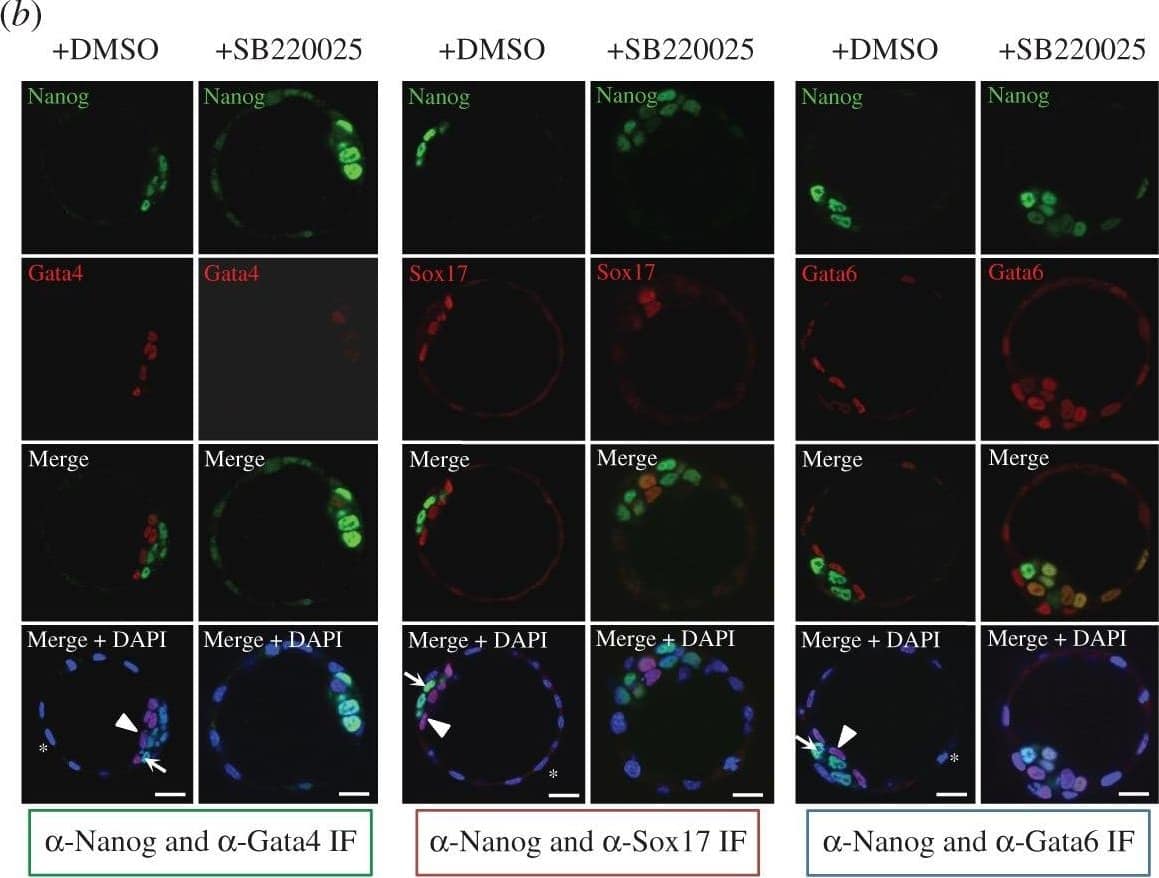 View Larger
View Larger
Detection of Mouse SOX17 by Immunocytochemistry/Immunofluorescence. p38-Mapk14/11 inhibition during murine blastocyst maturation blocks primitive endoderm (PrE) differentiation/maturation. Representative single confocal z-plane micrographs of vehicle control-treated (+DMSO) or p38-Mapk14/11 inhibited (+SB220025) late-blastocyst stage/equivalent embryos, immunofluorescently stained for indicated ICM cell lineage markers (Nanog in green and Gata4, Sox17 and Gata6 in red, plus DAPI DNA stain in blue). Examples of cells classified as TE, PrE and EPI are marked with an asterisk, arrowhead and arrow, respectively. Scale bar, 15 µm. Image collected and cropped by CiteAb from the following publication (https://pubmed.ncbi.nlm.nih.gov/27605380), licensed under a CC-BY licence.
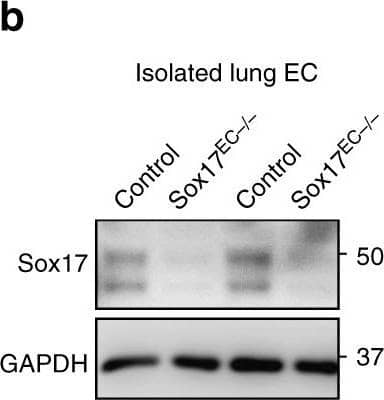 View Larger
View Larger
Detection of Mouse SOX17 by Western Blot. Endothelial cell (EC) specific deletion of Sox17 (Sox17EC−/−) in mice prevents endothelial regeneration. Western blot analysis of Sox17 protein expression in isolated ECs obtained from flushed lungs of Sox17EC−/− and control mice. n = 4. Image collected and cropped by CiteAb from the following publication (https://pubmed.ncbi.nlm.nih.gov/31073164), licensed under a CC-BY licence.
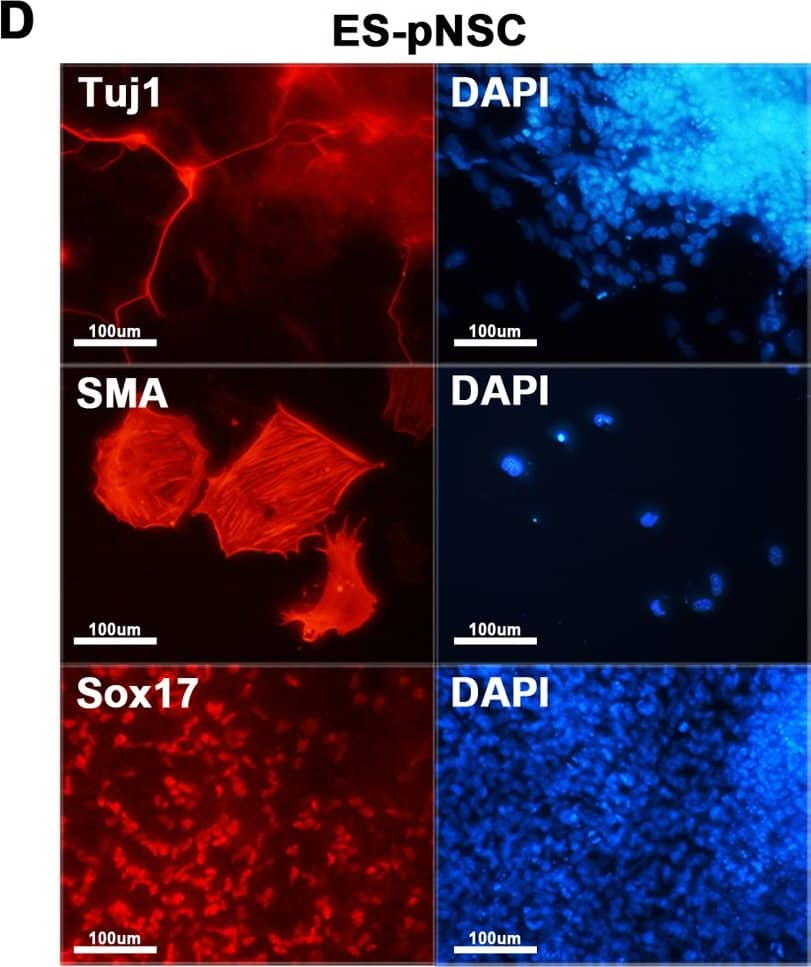 View Larger
View Larger
Detection of Mouse SOX17 by Immunocytochemistry/Immunofluorescence Characterization of hybrid cells.(A) Both ES-pNSC and pES-NSC hybrid cells are positive for alkaline phosphatase staining (100 ×). (B) RT-PCR analysis of Oct4, Nanog, Sox2, and Nestin expression in fusion partner and reprogrammed hybrid cells. Pluripotency markers, Oct4 and Nanog, which were not expressed in NSCs and pNSCs were expressed in GFP+ fusion hybrid cells. On the other hand, Nestin, which was expressed in NSCs and pNSCs was silenced after forming GFP+ fusion hybrid cells. (C) Immunocytochemistry analysis of Oct4 and Nanog in ES-pNSC and pES-NSC hybrid cells (100 ×). (D)In vitro differentiation of ES-pNSC and pES-NSC hybrid cells into ectoderm (Tuj1), mesoderm (SMA), and endoderm (Sox17) lineages (200 ×). (E) In vivo differentiation potential of ES-pNSC and pES-NSC hybrid cells through teratoma assay. These hybrid cells were contributed to secretory epithelium (ectoderm), cartilage (mesoderm) and gut epithelium (endoderm), which were stained with PAS, Asian blue, and hematoxylin eosin, respectively. Each tissue was indicated by arrow head. Image collected and cropped by CiteAb from the following publication (https://dx.plos.org/10.1371/journal.pone.0156491), licensed under a CC-BY license. Not internally tested by R&D Systems.
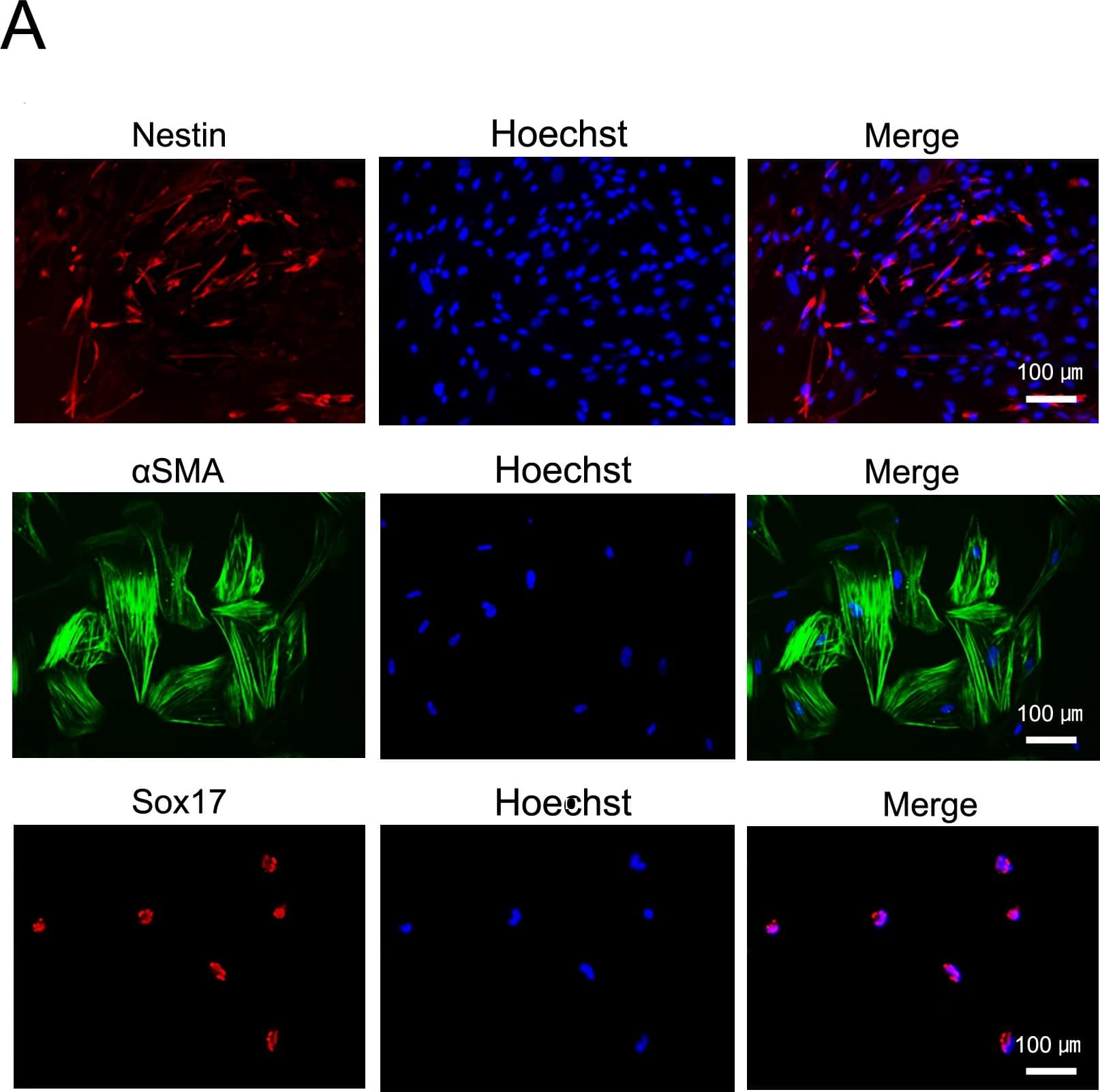 View Larger
View Larger
Detection of Human SOX17 by Immunocytochemistry/Immunofluorescence In vitro and in-TiPSCs.(A): Immunofluorescence staining for Sox17 (endodermal marker), alpha SMA (mesodermal marker), and Nestin (ectodermal marker) in each TiPSCs1-derived differentiated cell in vitro. (B): Gross morphology of representative teratomas derived from TiPSCs1 in vivo (hematoxylin and eosin staining). Image collected and cropped by CiteAb from the following publication (https://dx.plos.org/10.1371/journal.pone.0097397), licensed under a CC-BY license. Not internally tested by R&D Systems.
 View Larger
View Larger
Detection of Mouse SOX17 by Immunocytochemistry/Immunofluorescence Characterization of hybrid cells.(A) Both ES-pNSC and pES-NSC hybrid cells are positive for alkaline phosphatase staining (100 ×). (B) RT-PCR analysis of Oct4, Nanog, Sox2, and Nestin expression in fusion partner and reprogrammed hybrid cells. Pluripotency markers, Oct4 and Nanog, which were not expressed in NSCs and pNSCs were expressed in GFP+ fusion hybrid cells. On the other hand, Nestin, which was expressed in NSCs and pNSCs was silenced after forming GFP+ fusion hybrid cells. (C) Immunocytochemistry analysis of Oct4 and Nanog in ES-pNSC and pES-NSC hybrid cells (100 ×). (D)In vitro differentiation of ES-pNSC and pES-NSC hybrid cells into ectoderm (Tuj1), mesoderm (SMA), and endoderm (Sox17) lineages (200 ×). (E) In vivo differentiation potential of ES-pNSC and pES-NSC hybrid cells through teratoma assay. These hybrid cells were contributed to secretory epithelium (ectoderm), cartilage (mesoderm) and gut epithelium (endoderm), which were stained with PAS, Asian blue, and hematoxylin eosin, respectively. Each tissue was indicated by arrow head. Image collected and cropped by CiteAb from the following publication (https://dx.plos.org/10.1371/journal.pone.0156491), licensed under a CC-BY license. Not internally tested by R&D Systems.
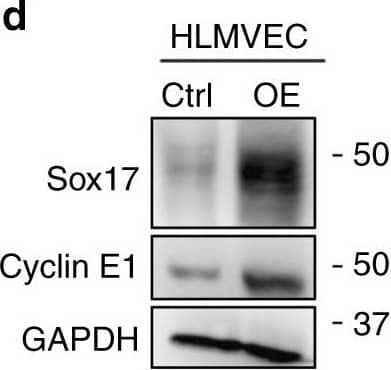 View Larger
View Larger
Detection of Mouse SOX17 by Western Blot Activation of Sox17 at onset of EC regeneration and Sox17-mediated Cyclin E1 expression. a qPCR analysis of gene expression in sorted CD31+ cells from mTmG-Scl mice before and after injury (12 mg/kg i.p.). Sox17, Vegfr2, and Ccne1 increased significantly at day 2 post-LPS compared to baseline. n = 3. Color scale: the fold change increases from red to white to green color. b Western blot analysis in fresh isolated ECs from wild-type mice and quantification c showed a 5-fold increase in Sox17 protein expression within 1 day following injury compared to baseline and followed by recovery within 3 days post-LPS. n = 3. d, e Western blot analysis of cultured HLMVECs in which Sox17 was overexpressed showed 2.5x fold increase in Cyclin E1 protein expression relative to control cells. n = 3. OE, overexpression. f Representation of the CCNE1 promoter region with Sox17 binding sites (circled numbers) and their sequences. g HLMVECs were retrovirally transduced with Sox17 or control plasmid for 3 days, and Ch-IP assay followed by qPCR was performed to amplify Sox17 binding sites in the CCNE1 promoter. n = 3. h 293T cells were transfected with a Sox17 overexpression plasmid containing CCNE1 luciferase reporter constructs. Luciferase values were normalized to Renilla luciferase control reporter values. A schematic representation of corresponding deletion constructs is presented in the right panel. n = 3 and duplicates per sample. **P < 0.01 and ***P < 0.001. Data are shown as mean ± SEM. Analysis was performed using one-way ANOVA for (c) and two-way ANOVA with Bonferroni post-tests for (e, g, h) Image collected and cropped by CiteAb from the following publication (https://pubmed.ncbi.nlm.nih.gov/31073164), licensed under a CC-BY license. Not internally tested by R&D Systems.
 View Larger
View Larger
Detection of Human SOX17 by Immunocytochemistry/Immunofluorescence Generation and characterization of systemic lupus erythematosus (SLE)‐specific human‐induced pluripotent stem cells (hiPSCs). (A) Dermal fibroblasts derived from patient with SLE were reprogrammed into iPSCs using Sendai virus vectors and three clones (#1, #2 and #3) were characterized. RT‐PCR confirms the loss of transgenes in hiPSCs‐SLE (lanes 1, 2 and 3), presence (lane 4) in infected fibroblasts (ipF‐SLE) and absence of Sendai viral transgenes in parental fibroblasts (pF‐SLE) (lane 5). Full‐length gels are presented in File S2. (B) The hiPSCs‐SLE colonies expressed alkaline phosphatase. Scale bar, 500 μm. (C) RT‐qPCR analysis of pluripotency genes OCT4, NANOG, SOX2 and REX1 was performed in fibroblasts and in hiPSCs derived from patient with SLE. All expression values are normalized to GAPDH and relative donor fibroblasts. Data are mean ± SEM and all statistical analysis was made between hiPSCs‐SLE clones and relative fibroblasts by Student's t test showing P‐values ≤ .05 in each comparison. (D) PluriTest assays combines novelty score (blue) on x‐axis and pluripotency score (red) on y‐axis. hiPSCs‐SLE localize in the red cloud suggesting the empirical distribution of pluripotent cells compared to non‐pluripotent blue cloud. (E) Representative images of M‐FISH staining show normal karyotypes of hiPSCs‐SLE clones. (F) Immunofluorescence analysis of pluripotent stem cell markers Nanog (green), Oct4 (red) and co‐staining with DAPI (blue) in hiPSCs‐SLE. Scale bar, 50 μm. (G) Representative images of floating and adherent EBs derived from hiPSCs‐SLE at differentiation day 8 and 18, respectively. Scale bar, 500 μm. (H) RT‐qPCR results confirm the capability of hiPSCs‐SLE to differentiate into all three germ layers. The expression levels of GATA4, HAND1 and PAX6 in EBs are relative to undifferentiated hiPSCs. All expression values are normalized to GAPDH and relative hiPSCs. Data are mean ± SEM and all statistical analysis was made between EBs‐SLE and relative hiPSCs‐SLE clones by Student's t test showing P‐values ≤ .05 in each comparison. (I) Immunostaining of Otx2 (ectoderm marker), Sox17 (endoderm marker), Brachyury (mesoderm marker) and co‐staining with DAPI (blue) in EBs derived from hiPSCs‐SLE. Scale bar, 50 μm Image collected and cropped by CiteAb from the following publication (https://pubmed.ncbi.nlm.nih.gov/31536674), licensed under a CC-BY license. Not internally tested by R&D Systems.
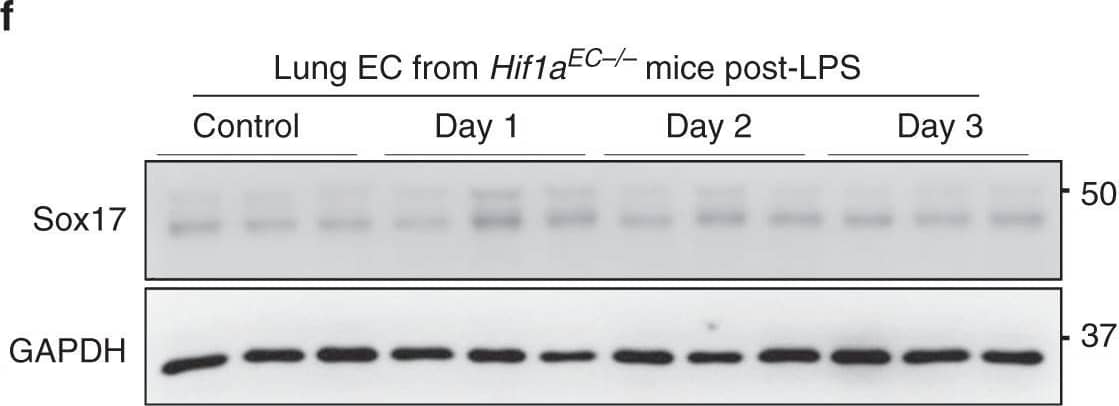 View Larger
View Larger
Detection of Mouse SOX17 by Western Blot soHIF-1 alpha signaling induces Sox17 expression. a MPO activity of flushed lung sample from mice challenged with LPS (12 mg/kg i.p.) for 6 and 24 h. n = 3. b Western blot analysis of wild-type mice lung before and after LPS-induced injury (12 mg/kg i.p.) and its quantification c showed that HIF-1 alpha protein expression increased within 6 h post-LPS and remained increased until day 2. n = 3. d Western blot analysis in freshly isolated ECs from Hif1afl/fl mice and quantification e showed significantly increased Sox17 protein expression after injury when compared to baseline levels. n = 3. f Western blot analysis in freshly isolated ECs from Hif1aEC−/− mice and quantification g showed no significant difference in Sox17 protein expression before and after injury. n = 3. **P < 0.01 and ***P < 0.001. Data are shown as mean ± SEM. Analysis was performed using one-way ANOVA for (b, c, e, g). Image collected and cropped by CiteAb from the following publication (https://pubmed.ncbi.nlm.nih.gov/31073164), licensed under a CC-BY license. Not internally tested by R&D Systems.
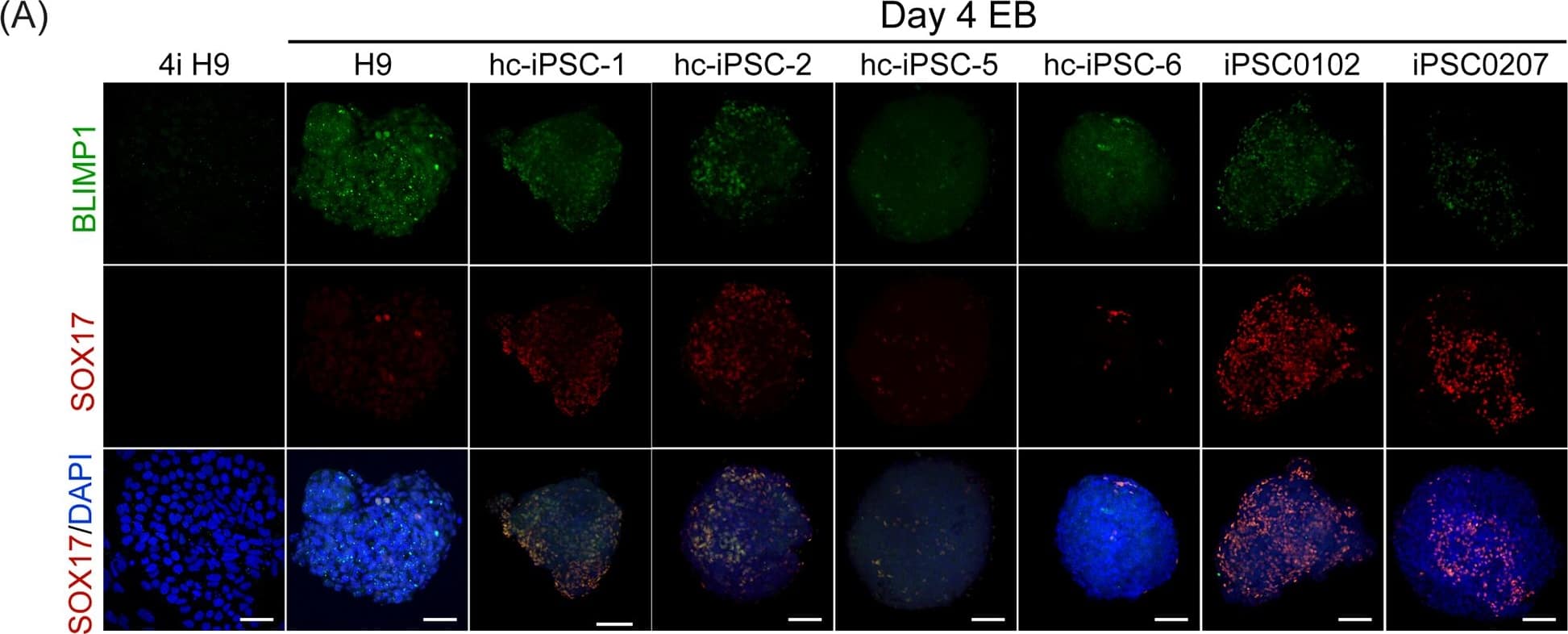 View Larger
View Larger
Detection of Human SOX17 by Immunocytochemistry/Immunofluorescence PGCLCs derived from hc-iPSCs.Immunofluorescent staining of (A) BLIMP1 (green color) and (B) OCT4 (green color) in 4-day-old EBs cultured with PGC induction medium on hc-iPSC-1, -2, -5 and -6 (third to fifth column), PBMC derived iPSC0102 and iPSC0207 (right two column). H9 hESCs (left column) adapted in 4i medium was also detected for BLIMP1 and OCT4 antibodies. Noted that there was no BLIMP1 signals detected in undifferentiated H9 in 4i condition. All samples were doubly stained with SOX17 antibody (red color) sequentially. DAPI was used for counterstain (blue). Scale bar = 50μm. (C) Quantification of immunofluoresent staining of PGCLCs. BLIMP1/SOX17 and OCT4/SOX17 double positive cells were counted for PGCLCs and normalized with the number of DAPI. Percentage of PGCLCs per EB of all lines was presented and significance was compared with control hESC H9. ** indicates P<0.005. *** indicates P<0.001. Image collected and cropped by CiteAb from the following publication (https://dx.plos.org/10.1371/journal.pone.0165715), licensed under a CC-BY license. Not internally tested by R&D Systems.
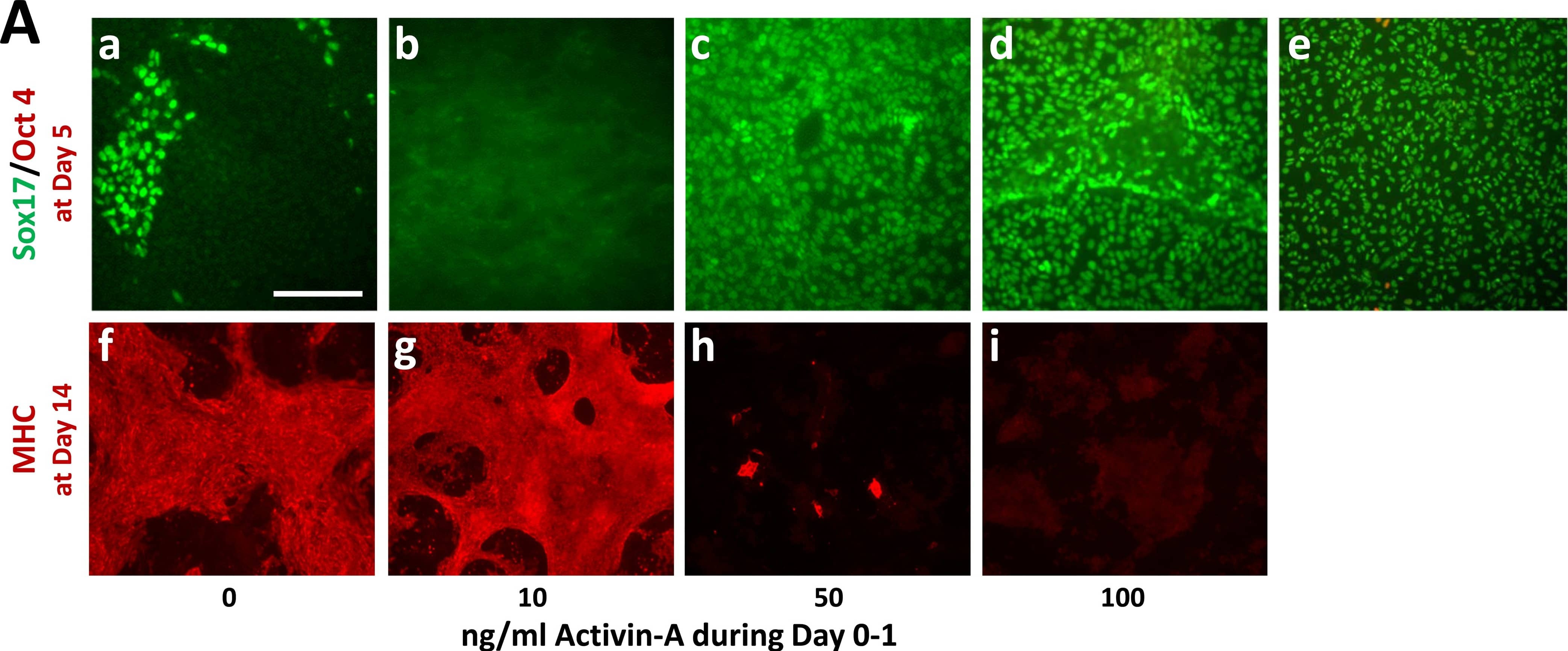 View Larger
View Larger
Detection of Human SOX17 by Immunocytochemistry/Immunofluorescence Activin-A levels during Day 0–1 modulate CM vs. DE differentiation.Pluripotent H1 ESCs were induced by changing medium to RPMI/B27 (no insulin), including CHIR (7.5 μmol/L) during Day 0–1 and IWP (5 μmol/L) during Days 3–5. Activin-A was included at the indicated levels during Day 0–1. Insulin (4,000 ng/ml) was included after Day 7. Panel A, a-e shows cells double-immunostained on Day 5 for Oct4 (red) and Sox17 (green); e is a positive control wherein cells were induced to DE with Activin-A (50 ng/ml) and Bmp4 (10 ng/ml) during Days 0–5. Panel A f-i shows cells immunostained with MF20 mAb on Day 14 to detect cardiomyocytes. Panel B depicts the effect of Activin-A levels during Day 0–1 on cardiomyocyte differentiation at Day 14, determined by flow cytometry using anti-cTnT. Cultures treated with 10 ng/ml Activin-A began to rhythmically contract at Day 6. Cells treated with 50 or 100 ng/ml Activin-A did not beat at any time. Bars indicate the average values combined from multiple experiments. Vertical lines = ±SEM. P-values were calculated by Student’s t-test. The p-value over the bar denoting 10 ng/ml Activin-A is relative to cells treated with CHIR only (0 ng/ml Activin-A), whereas the p-values over the bars denoting 50 and 100 ng/ml Activin-A are relative to cells treated with 10 ng/ml Activin-A. The size bar in Aa, which pertains to panels a-i, = 200 μm. Image collected and cropped by CiteAb from the following publication (https://dx.plos.org/10.1371/journal.pone.0118670), licensed under a CC-BY license. Not internally tested by R&D Systems.
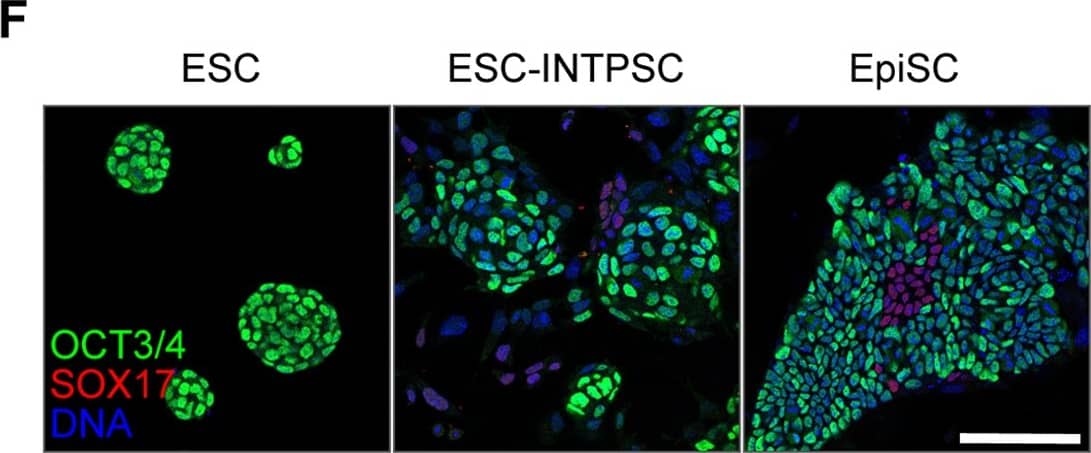 View Larger
View Larger
Detection of Mouse SOX17 by Immunocytochemistry/Immunofluorescence Features of ESC-INTPSCs intermediate between ESCs and EpiSCs.(A) Comparison of gene expression in ESCs, EpiSCs, and ESC-INTPSCs. (B) The number of AP-positive colonies formed in the LIF/2i condition four days after 1000 cells were seeded per dish. (C) Proliferation of ESCs, EpiSCs, and ESC-INTPSCs with or without JAKi. (D) Expression of ESRRB and FOXA2. White arrows indicate ESRRB- and FOXA2-double–positive cells. Scale bar, 100 µm. (E) Percentage of ESRRB-positive or ESRRB- and FOXA2-double–positive cells in ESCs, ESC-INTPSCs, and EpiSCs. (F) Expression of OCT3/4 and SOX17. Scale bar, 100 µm. (G) The number of Oct3/4-GFP–positive or –negative colonies derived from single cells at day 4 and 8. Image collected and cropped by CiteAb from the following publication (https://dx.plos.org/10.1371/journal.pone.0095329), licensed under a CC-BY license. Not internally tested by R&D Systems.
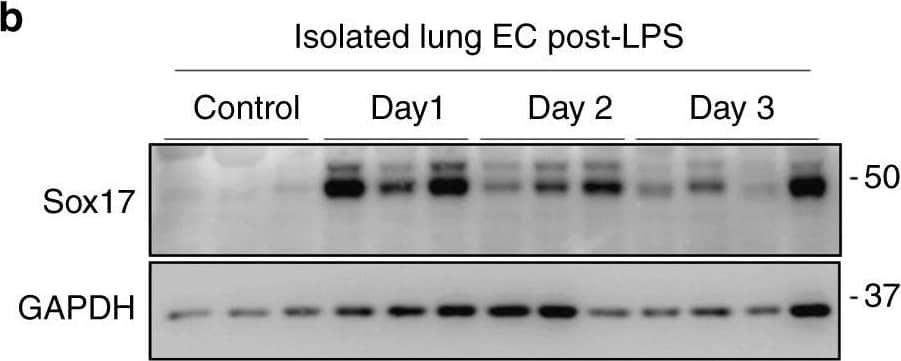 View Larger
View Larger
Detection of Mouse SOX17 by Western Blot Activation of Sox17 at onset of EC regeneration and Sox17-mediated Cyclin E1 expression. a qPCR analysis of gene expression in sorted CD31+ cells from mTmG-Scl mice before and after injury (12 mg/kg i.p.). Sox17, Vegfr2, and Ccne1 increased significantly at day 2 post-LPS compared to baseline. n = 3. Color scale: the fold change increases from red to white to green color. b Western blot analysis in fresh isolated ECs from wild-type mice and quantification c showed a 5-fold increase in Sox17 protein expression within 1 day following injury compared to baseline and followed by recovery within 3 days post-LPS. n = 3. d, e Western blot analysis of cultured HLMVECs in which Sox17 was overexpressed showed 2.5x fold increase in Cyclin E1 protein expression relative to control cells. n = 3. OE, overexpression. f Representation of the CCNE1 promoter region with Sox17 binding sites (circled numbers) and their sequences. g HLMVECs were retrovirally transduced with Sox17 or control plasmid for 3 days, and Ch-IP assay followed by qPCR was performed to amplify Sox17 binding sites in the CCNE1 promoter. n = 3. h 293T cells were transfected with a Sox17 overexpression plasmid containing CCNE1 luciferase reporter constructs. Luciferase values were normalized to Renilla luciferase control reporter values. A schematic representation of corresponding deletion constructs is presented in the right panel. n = 3 and duplicates per sample. **P < 0.01 and ***P < 0.001. Data are shown as mean ± SEM. Analysis was performed using one-way ANOVA for (c) and two-way ANOVA with Bonferroni post-tests for (e, g, h) Image collected and cropped by CiteAb from the following publication (https://pubmed.ncbi.nlm.nih.gov/31073164), licensed under a CC-BY license. Not internally tested by R&D Systems.
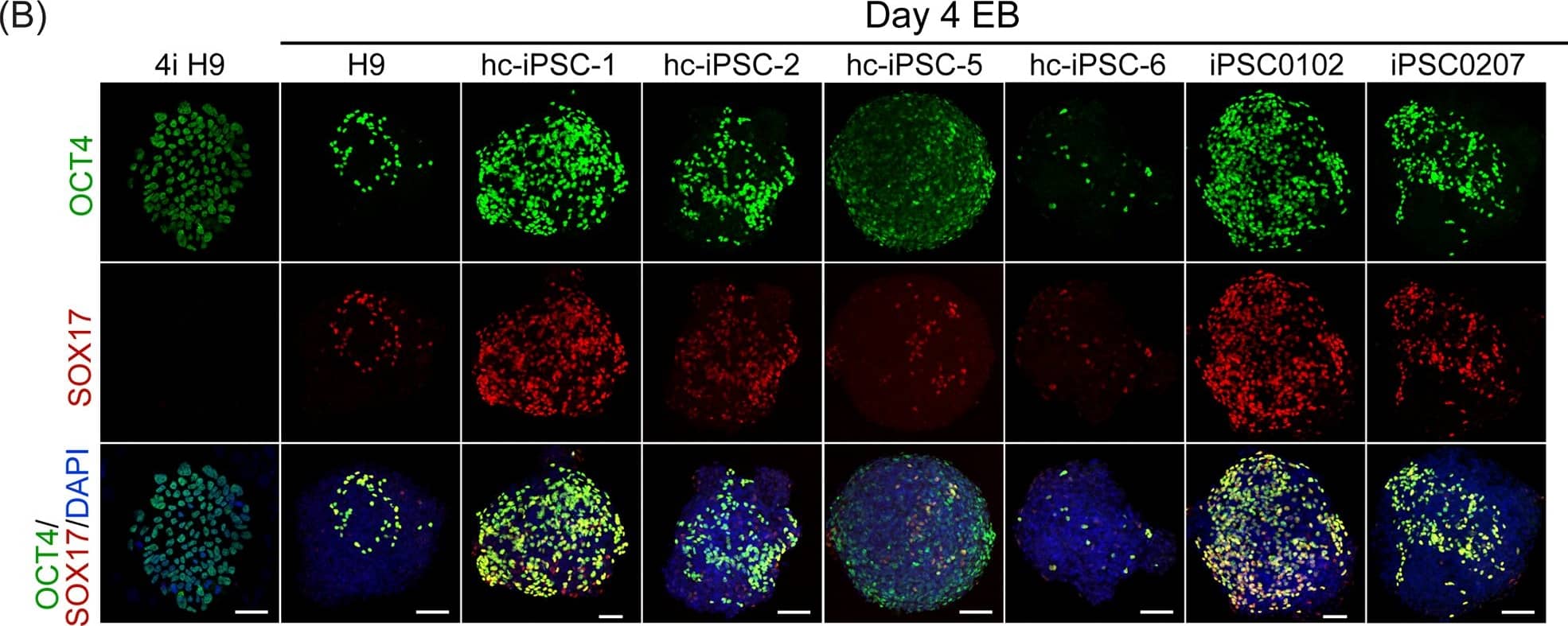 View Larger
View Larger
Detection of Human SOX17 by Immunocytochemistry/Immunofluorescence PGCLCs derived from hc-iPSCs.Immunofluorescent staining of (A) BLIMP1 (green color) and (B) OCT4 (green color) in 4-day-old EBs cultured with PGC induction medium on hc-iPSC-1, -2, -5 and -6 (third to fifth column), PBMC derived iPSC0102 and iPSC0207 (right two column). H9 hESCs (left column) adapted in 4i medium was also detected for BLIMP1 and OCT4 antibodies. Noted that there was no BLIMP1 signals detected in undifferentiated H9 in 4i condition. All samples were doubly stained with SOX17 antibody (red color) sequentially. DAPI was used for counterstain (blue). Scale bar = 50μm. (C) Quantification of immunofluoresent staining of PGCLCs. BLIMP1/SOX17 and OCT4/SOX17 double positive cells were counted for PGCLCs and normalized with the number of DAPI. Percentage of PGCLCs per EB of all lines was presented and significance was compared with control hESC H9. ** indicates P<0.005. *** indicates P<0.001. Image collected and cropped by CiteAb from the following publication (https://dx.plos.org/10.1371/journal.pone.0165715), licensed under a CC-BY license. Not internally tested by R&D Systems.
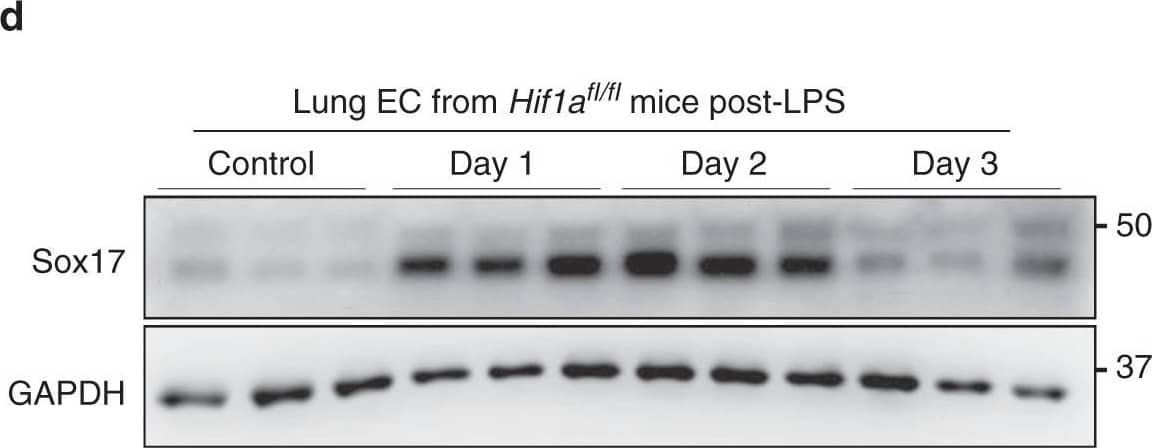 View Larger
View Larger
Detection of Mouse SOX17 by Western Blot soHIF-1 alpha signaling induces Sox17 expression. a MPO activity of flushed lung sample from mice challenged with LPS (12 mg/kg i.p.) for 6 and 24 h. n = 3. b Western blot analysis of wild-type mice lung before and after LPS-induced injury (12 mg/kg i.p.) and its quantification c showed that HIF-1 alpha protein expression increased within 6 h post-LPS and remained increased until day 2. n = 3. d Western blot analysis in freshly isolated ECs from Hif1afl/fl mice and quantification e showed significantly increased Sox17 protein expression after injury when compared to baseline levels. n = 3. f Western blot analysis in freshly isolated ECs from Hif1aEC−/− mice and quantification g showed no significant difference in Sox17 protein expression before and after injury. n = 3. **P < 0.01 and ***P < 0.001. Data are shown as mean ± SEM. Analysis was performed using one-way ANOVA for (b, c, e, g) Image collected and cropped by CiteAb from the following publication (https://pubmed.ncbi.nlm.nih.gov/31073164), licensed under a CC-BY license. Not internally tested by R&D Systems.
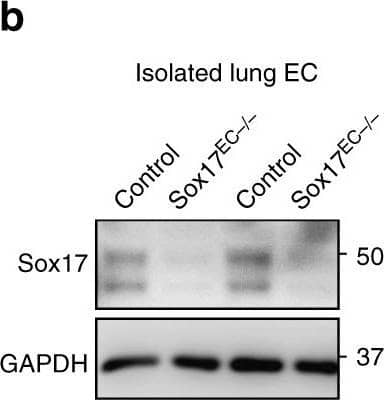 View Larger
View Larger
Detection of Mouse SOX17 by Western Blot EC specific deletion of Sox17 (Sox17EC−/−) in mice prevents endothelial regeneration. a Schematic diagram of Sox17fl/fl mice crossed with Scl-CreERT2 to delete Sox17 in ECs. After tamoxifen feeding for five days and rest for another four weeks, mice are challenged with LPS (sub-lethal 8 mg/kg, i.p.) for analysis. b Western blot analysis of Sox17 protein expression in isolated ECs obtained from flushed lungs of Sox17EC−/− and control mice. n = 4. c Quantification of b shows 80% deletion of Sox17 in ECs of Sox17EC−/− mice compared to control mice. n = 4. d Time course of lung transvascular permeability following LPS challenge in Sox17EC−/− and Sox17fl/fl mice. n = 4. While control mouse lungs showed increased endothelial permeability at day 1 post-LPS and then recovered to baseline by day 5, Sox17EC−/− mice showed prolonged endothelial barrier leakiness post-LPS. e Time course of changes in lung transvascular permeability following LPS challenge was also carried out in Sox17fl/fl mice crossed with Cdh5-CreERT2 mice. n = 4. Similar as in d, these Sox17EC−/− mice also showed persistent leakiness post-LPS while control mice fully recovered. f Survival curve of LPS challenge in Sox17EC−/− and control mice. n = 8 per group. At this sub-lethal dose, all control mice survived whereas half of Sox17EC−/− mice died on day 2 post-LPS with increased mortality on day 3. By day 5, the death rate for control mice is 0 while for Sox17EC−/− mice is 60%. g Flow cytometry analysis of CD31+CD45− ECs among whole lung population in mice following injury. n = 4. In contrast to control mice in which CD31+CD45− EC population gradually recovered with day 3 post-LPS after initial loss of ECs, Sox17EC−/− mice showed significantly delayed restoration of ECs post-LPS period. h Quantification of BrdU+ nuclei in each field of 425 μm2 area in flushed lung cryo-sections from mice following injury. n = 4 mice per group and 6 replicates per sample. Slides are co-stained with CD31-AF488, BrdU-APC, and DAPI. At day 3 post-LPS, the control group showed a significantly higher number of BrdU+ECs compared to baseline. However, Sox17EC−/− mice showed markedly reduced level of BrdU+ECs, indicating reduced EC proliferation. i To assess whether expression of Sox17 in ECs can restore lung endothelial integrity, studies were performed in Sox17EC−/− mice to overexpress Sox17 protein. We used a mixture of 50 μg plasmid (mouse Cdh5 promoter—Flag —Sox17) encapsulated in liposomes, which were injected i.v. 3 h after LPS challenge. j At day 3 post-LPS, liposome vector-treated Sox17EC−/− mice showed marked EC barrier leakiness as assessed by lung transvascular permeability of albumin whereas the Sox17-rescued mice showed markedly reduced endothelial permeability. n = 4. OE, overexpression. *P < 0.05, **P < 0.01 and ***P < 0.001. Data are shown as mean ± SEM. Analysis was performed using two-tailed Student’s t-test for (c, j), two-way ANOVA with Bonferroni post-tests for (d, e, g, h) and Log-rank (Mantel-Cox) test for (f) Image collected and cropped by CiteAb from the following publication (https://pubmed.ncbi.nlm.nih.gov/31073164), licensed under a CC-BY license. Not internally tested by R&D Systems.
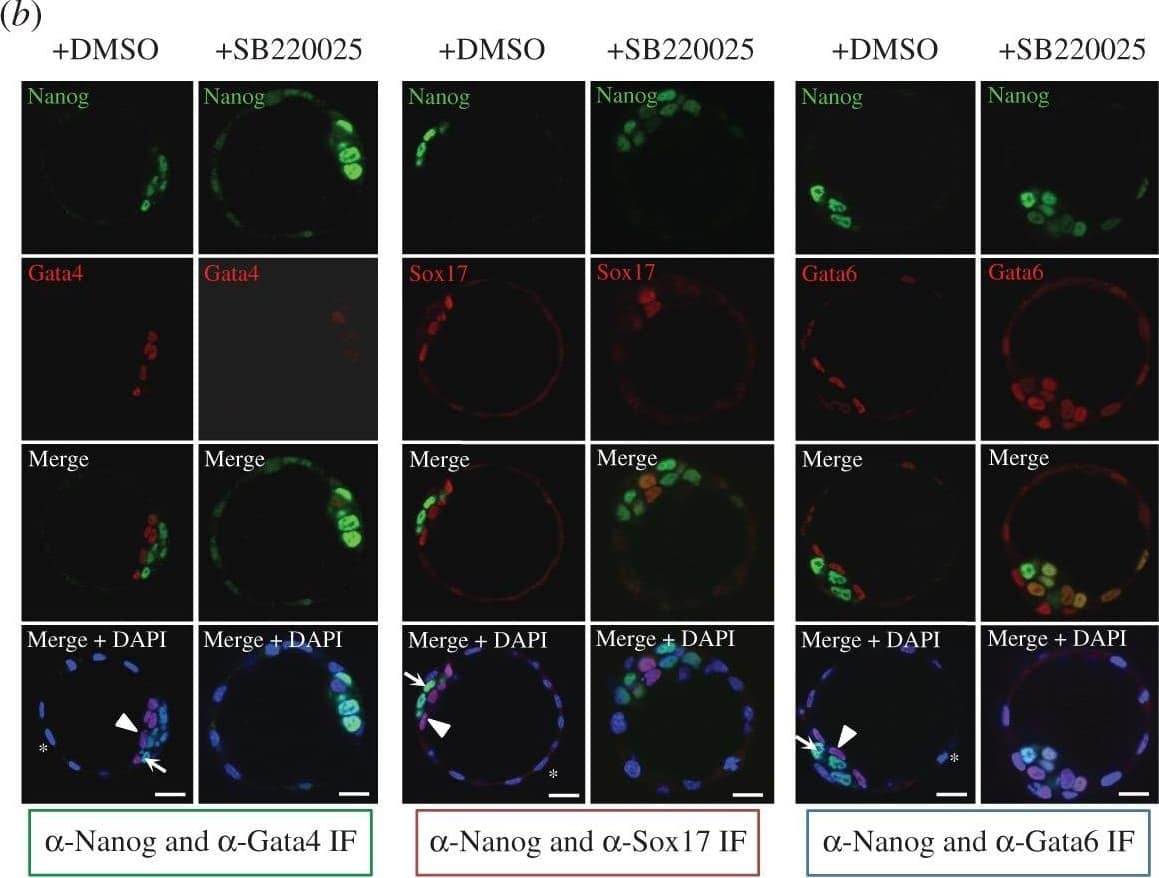 View Larger
View Larger
Detection of Mouse SOX17 by Immunocytochemistry/Immunofluorescence p38-Mapk14/11 inhibition during blastocyst maturation blocks PrE differentiation/maturation. (a) Experimental schema of p38-Mapk14/11 inhibition (+SB220025), plus vehicle control (+DMSO), and the details of antibodies used to analyse ICM cell lineage marker protein expression by immunofluorescence (IF) in late blastocysts (E4.5); Nanog and Gata4 (+DMSO n = 27, +SB220025 n = 33)—green, Nanog and Sox17 (+DMSO n = 18, +SB220025 n = 20)—red, and Nanog and Gata6 (+DMSO n = 24, +SB220025 n = 27)—blue. (b) Representative single confocal z-plane micrographs of vehicle control-treated (+DMSO) or p38-Mapk14/11 inhibited (+SB220025) late-blastocyst stage/equivalent embryos, immunofluorescently stained for indicated ICM cell lineage markers (Nanog in green and Gata4, Sox17 and Gata6 in red, plus DAPI DNA stain in blue). Examples of cells classified as TE, PrE and EPI are marked with an asterisk, arrowhead and arrow, respectively. Scale bar, 15 µm. (c) Pie charts of the relative cell lineage contribution in vehicle control (+DMSO) and p38-Mapk14/11 inhibited (+SB220025) blastocysts as judged by IF to detect the stated ICM lineage marker proteins. Blue, trophectoderm (TE); yellow, epiblast (EPI—ICM exhibiting exclusive Nanog expression); green, primitive endoderm (PrE—ICM exhibiting exclusive Gata4/6 or Sox17 expression, as appropriate); orange, uncommitted ICM cells (exhibiting co-expression of both Nanog and Gata4/6 or Sox17, as appropriate); and grey, ICM cells negative for either assayed marker. (d) Bar charts show average number of cells allocated to each specified ICM lineage, as judged by the indicated IF staining regime employed. Error bars represent s.e.m. and asterisks denote statistical significant differences in cell number between the vehicle control (+DMSO, black bars) and p38-Mapk14/11 inhibited (+SB220025, grey bars) embryo groups, according to two-tailed Student's t-test, with *p < 0.05 and **p < 0.005 confidence intervals. Yellow asterisk denotes increase in cells positively immunofluorescently staining for both EPI and PrE ICM markers using anti-Nanog and anti-Gata6 (an early PrE marker) antibodies. All individual embryo data used in the preparation of this figure are contained within the electronic supplementary material, table S3. Image collected and cropped by CiteAb from the following publication (https://pubmed.ncbi.nlm.nih.gov/27605380), licensed under a CC-BY license. Not internally tested by R&D Systems.
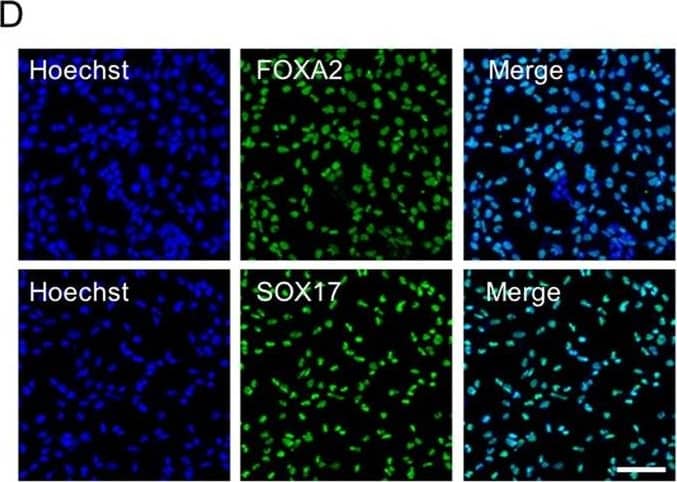 View Larger
View Larger
Detection of Human SOX17 by Immunocytochemistry/Immunofluorescence Differentiation of hESCs into definitive endoderm cells by Activin A with CHIR99021.a The relative primitive streak (BRACHYRUY, MESP1, and MIXL1) gene expression of the day 1 differentiated cells by adding Activin A (100 ng/mL) with CHIR99021 (2–5 µM) or Wnt3a (25–100 ng/mL) treatments were determined by real-time quantitative PCR (qPCR). None, no WNT signaling pathway activators were used on day 1 for PS differentiation (Activin A only). b, c After 1 day, the medium was changed to Activin A (100 ng/mL) and 1 × CTS-B27 to induce DE differentiation. The definitive endoderm (FOXA2 and SOX17) and mesoderm (MESP2 and HAND1) relative gene expression levels were determined by qPCR. d Immunofluorescence analysis of the expression of SOX17 and FoxA2 for Activin A with 2 µM CHIR99021-induced differentiated cells on day 3. e, f The expression of SOX17 and FoxA2 for Activin A with 2 µM CHIR99021-induced differentiated cells was determined by flow cytometry on day 3. Isotype control antibodies were used as controls. At a specific gene expression, datum points lacking common letters differ, p < 0.05. Data are represented as the mean ± SD. Scale bar, 100 µm Image collected and cropped by CiteAb from the following publication (https://pubmed.ncbi.nlm.nih.gov/31601782), licensed under a CC-BY license. Not internally tested by R&D Systems.
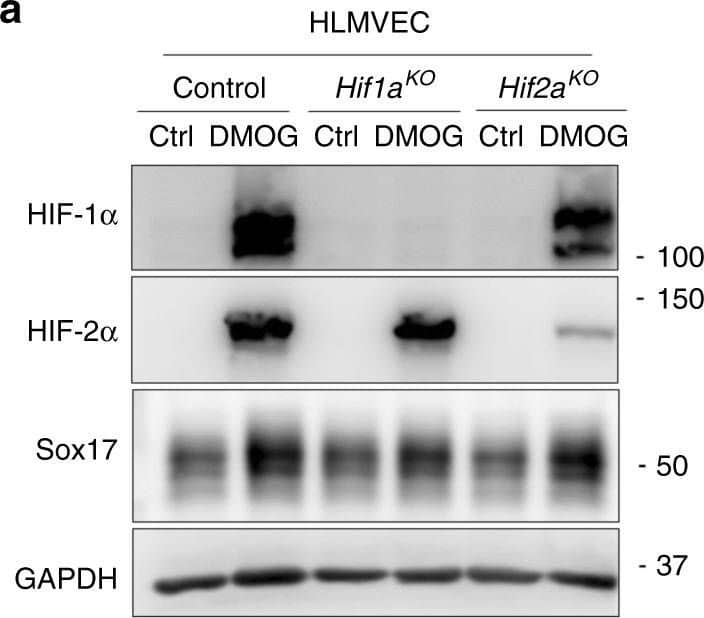 View Larger
View Larger
Detection of Mouse SOX17 by Western Blot HIF-1 alpha activates transcription of Sox17. a Western blot analysis in control HLMVECs and HLMVECs for which CRISPR/Cas9 was used to delete HIFs. ECs were treated with the HIF prolyl hydroxylase inhibitor DMOG to induce HIF expression. DMOG (1 mM) increased HIF-1 alpha and HIF-2 alpha protein expression in control ECs but not in ECs lacking HIF-1 alpha or HIF-2 alpha. Induction of HIF expression was coupled to Sox17 upregulation. n = 3. b Quantification of a showed that protein expression of HIF-1 alpha and HIF-2 alpha in ECs was significantly increased by DMOG treatment. Sox17 showed a 2.5-fold increase in Sox17 expression control DMSO treated ECs. The increase in Sox17 was significantly reduced in HIF-1 alpha -deleted ECs but preserved in HIF-2 alpha -deleted ECs, indicating the importance of HIF-1 alpha in mediating Sox17 expression. n = 3. c Representation of the SOX17 promoter region with 3 HREs indicated by circled numbers, and their respective sequences are displayed. d HLMVECs were exposed to normoxia or 1% O2 (hypoxia) for 8 h. Ch-IP assay followed by qPCR was performed to amplify the HRE regions in the SOX17 promoter. Studies were performed in ECs exposed to either normoxia or hypoxia. n = 3. e 293T cells were transfected with a HIF-1 alpha overexpression plasmid containing SOX17 luciferase reporter constructs. Luciferase values were normalized to Renilla luciferase control reporter values. A schematic representation of corresponding deletion constructs is presented in the right panel. n = 3 and duplicates per sample. Results show that hypoxia activation of SOX17 HRE3 was required for Sox17 expression. **P < 0.01 and ***P < 0.001. Data are shown as mean ± SEM. Analysis was performed using two-way ANOVA with Bonferroni post-tests for (b, d, e) Image collected and cropped by CiteAb from the following publication (https://pubmed.ncbi.nlm.nih.gov/31073164), licensed under a CC-BY license. Not internally tested by R&D Systems.
 View Larger
View Larger
Detection of Human SOX17 by Immunocytochemistry/Immunofluorescence Concordant expression of developmental programs across organoids from four human iPSC lines. a Heatmap of expression patterns for major nephrogenesis markers across organoid differentiation time points (iPSC D0, D7, D15, and D29, averaged across four cell lines, ML protocol) and human adult kidney. Expression values were row-normalized to obtain z-scores; red color indicates positive z-scores. b Canonical (NPHS2) and data-derived (CLDN5) podocyte marker genes superimposed in tSNE plots from D15 organoids (N2 line, ML protocol). c IF staining of D15 kidney organoid (N2 line, ML protocol) for CLDN5 as a marker of early podocyte differentiation derived from the single-cell data. Additional canonical podocyte markers (NPHS1, WT1) and DAPI staining as shown. d IF staining of D29 kidney organoid (AS line, ML protocol) for SOX17 and CD31, markers of endothelial cells. Image collected and cropped by CiteAb from the following publication (https://pubmed.ncbi.nlm.nih.gov/31784515), licensed under a CC-BY license. Not internally tested by R&D Systems.
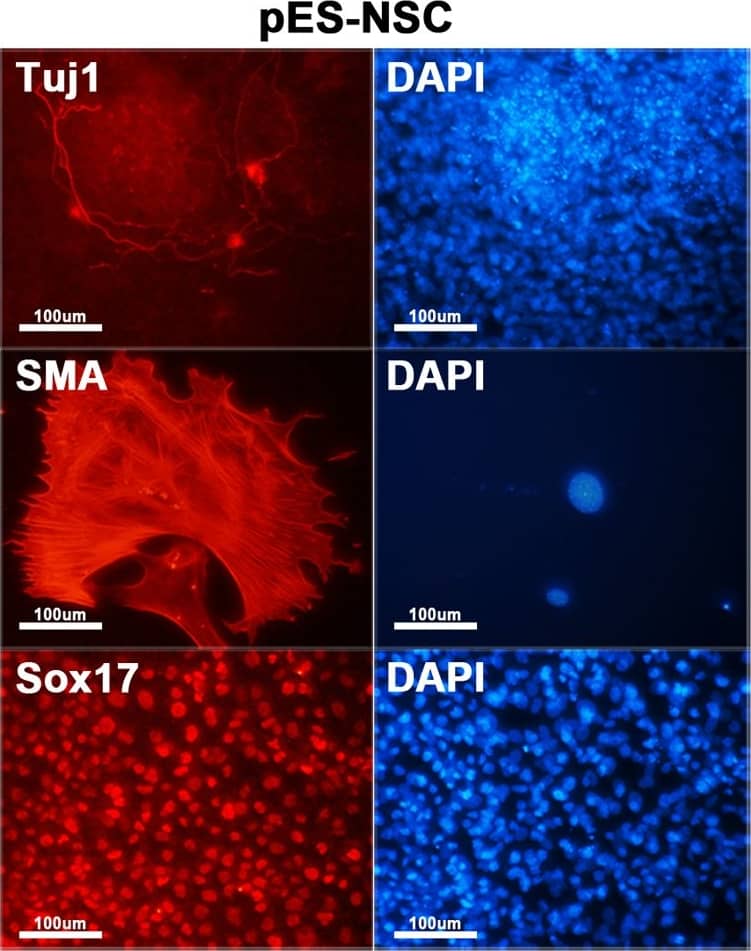 View Larger
View Larger
Detection of Mouse Human SOX17 Antibody by Immunocytochemistry/ Immunofluorescence Characterization of hybrid cells.(A) Both ES-pNSC and pES-NSC hybrid cells are positive for alkaline phosphatase staining (100 ×). (B) RT-PCR analysis of Oct4, Nanog, Sox2, and Nestin expression in fusion partner and reprogrammed hybrid cells. Pluripotency markers, Oct4 and Nanog, which were not expressed in NSCs and pNSCs were expressed in GFP+ fusion hybrid cells. On the other hand, Nestin, which was expressed in NSCs and pNSCs was silenced after forming GFP+ fusion hybrid cells. (C) Immunocytochemistry analysis of Oct4 and Nanog in ES-pNSC and pES-NSC hybrid cells (100 ×). (D)In vitro differentiation of ES-pNSC and pES-NSC hybrid cells into ectoderm (Tuj1), mesoderm (SMA), and endoderm (Sox17) lineages (200 ×). (E) In vivo differentiation potential of ES-pNSC and pES-NSC hybrid cells through teratoma assay. These hybrid cells were contributed to secretory epithelium (ectoderm), cartilage (mesoderm) and gut epithelium (endoderm), which were stained with PAS, Asian blue, and hematoxylin eosin, respectively. Each tissue was indicated by arrow head. Image collected and cropped by CiteAb from the following publication (https://pubmed.ncbi.nlm.nih.gov/27232503), licensed under a CC-BY license. Not internally tested by R&D Systems.
 View Larger
View Larger
Detection of Mouse Human SOX17 Antibody by Immunocytochemistry/ Immunofluorescence Characterization of hybrid cells.(A) Both ES-pNSC and pES-NSC hybrid cells are positive for alkaline phosphatase staining (100 ×). (B) RT-PCR analysis of Oct4, Nanog, Sox2, and Nestin expression in fusion partner and reprogrammed hybrid cells. Pluripotency markers, Oct4 and Nanog, which were not expressed in NSCs and pNSCs were expressed in GFP+ fusion hybrid cells. On the other hand, Nestin, which was expressed in NSCs and pNSCs was silenced after forming GFP+ fusion hybrid cells. (C) Immunocytochemistry analysis of Oct4 and Nanog in ES-pNSC and pES-NSC hybrid cells (100 ×). (D)In vitro differentiation of ES-pNSC and pES-NSC hybrid cells into ectoderm (Tuj1), mesoderm (SMA), and endoderm (Sox17) lineages (200 ×). (E) In vivo differentiation potential of ES-pNSC and pES-NSC hybrid cells through teratoma assay. These hybrid cells were contributed to secretory epithelium (ectoderm), cartilage (mesoderm) and gut epithelium (endoderm), which were stained with PAS, Asian blue, and hematoxylin eosin, respectively. Each tissue was indicated by arrow head. Image collected and cropped by CiteAb from the following publication (https://pubmed.ncbi.nlm.nih.gov/27232503), licensed under a CC-BY license. Not internally tested by R&D Systems.
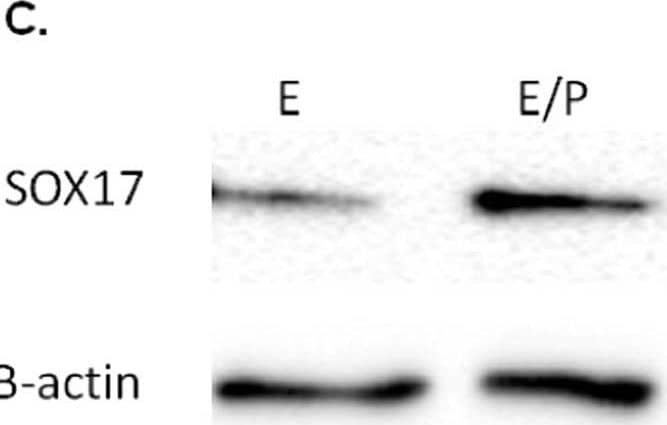 View Larger
View Larger
Detection of Human Human SOX17 Antibody by Western Blot Localisation of Sox17 staining in proliferative and secretory phase endometrial tissue and regulation by hormones. Within the proliferative (A) and secretory (B) endometrium, Sox17 localized to the glandular (open arrowheads) and luminal (closed arrowheads) epithelium, with staining appearing in an irregular, patchy, pattern. Smaller inset boxes show relevant IgG negative controls. Imaged at 20x magnification, scale bar = 50 μm. Treatment of endometrial luminal epithelial (ECC-1) cells with 10−8 M estrogen (estradiol)/10−7 M progesterone (medroxyprogesterone acetate) (, *p < 0.05) resulted in an upregulation of Sox17 protein, when compared to untreated, estradiol only (■, E) treatment groups. (C,D) Data presented as mean ± SEM, n = 5. Representative Western immunoblot shown. Image collected and cropped by CiteAb from the following publication (https://pubmed.ncbi.nlm.nih.gov/31664088), licensed under a CC-BY license. Not internally tested by R&D Systems.
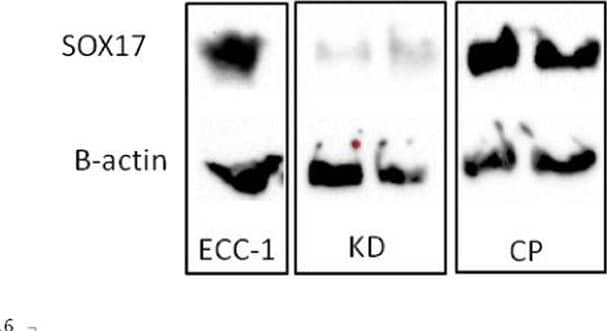 View Larger
View Larger
Detection of Human Human SOX17 Antibody by Western Blot Knockdown of SOX17 results in reduced expression in endometrial luminal epithelial cells. Transfection of ECC-1 cells with a CRISPR/Cas9 SOX17 knock down plasmid resulted in decreased SOX17 expression (KD1-5) when compared to untransfected control ECC-1 cells (ECC-1) and ECC-1 cells transfected with a control plasmid (CP). Analysed by Western immunoblot, representative blot shown. Image collected and cropped by CiteAb from the following publication (https://pubmed.ncbi.nlm.nih.gov/31664088), licensed under a CC-BY license. Not internally tested by R&D Systems.
Reconstitution Calculator
Preparation and Storage
- 12 months from date of receipt, -20 to -70 °C as supplied.
- 1 month, 2 to 8 °C under sterile conditions after reconstitution.
- 6 months, -20 to -70 °C under sterile conditions after reconstitution.
Background: SOX17
SOX17 is a member of the SOX family of transcription factors that bind DNA via a high mobility group (HMG) domain. SOX17 is suggested to play an important role in endoderm development (1, 2).
- Kanai-Azuma, M. et al. (2002) Development 129:2367.
- Katoh, M. et al. (2002) Int. J. Mol. Med. 9:153.
Product Datasheets
Citations for Human SOX17 Antibody
R&D Systems personnel manually curate a database that contains references using R&D Systems products. The data collected includes not only links to publications in PubMed, but also provides information about sample types, species, and experimental conditions.
483
Citations: Showing 1 - 10
Filter your results:
Filter by:
-
Cell-Cycle Control of Bivalent Epigenetic Domains Regulates the Exit from Pluripotency
Authors: Amar M. Singh, Yuhua Sun, Li Li, Wenjuan Zhang, Tianming Wu, Shaying Zhao et al.
Stem Cell Reports
-
Distinct Molecular Trajectories Converge to Induce Naive Pluripotency
Authors: Hannah T. Stuart, Giuliano G. Stirparo, Tim Lohoff, Lawrence E. Bates, Masaki Kinoshita, Chee Y. Lim et al.
Cell Stem Cell
-
Alternative Progenitor Cells Compensate to Rebuild the Coronary Vasculature in Elabela- and Apj-Deficient Hearts
Authors: Sharma B, Ho L, Ford GH et al.
Dev. Cell
-
Scalable generation of 3D pancreatic islet organoids from human pluripotent stem cells in suspension bioreactors
Authors: Samuel D. Pollock, Israeli M. Galicia-Silva, Mai Liu, Zoe L. Gruskin, Juan R. Alvarez-Dominguez
STAR Protoc
-
Cell Types of the Human Retina and Its Organoids at Single-Cell Resolution
Authors: Cowan CS, Renner M, De Gennaro M et al.
Cell
-
Differential regulation of alternate promoter regions in Sox17 during endodermal and vascular endothelial development
Authors: Trinh LT, Osipovich AB, Sampson L et al.
iScience
-
SMAD4 maintains the fluid shear stress set point to protect against arterial-venous malformations
Authors: Kuheli Banerjee, Yanzhu Lin, Johannes Gahn, Julio Cordero, Purnima Gupta, Islam Mohamed et al.
Journal of Clinical Investigation
-
Characterization of multitype colonies originating from porcine blastocysts produced in vitro
Authors: Jong-Nam Oh, Jinsol Jeong, Mingyun Lee, Gyung Cheol Choe, Dong-Kyung Lee, Kwang-Hwan Choi et al.
Frontiers in Cell and Developmental Biology
-
Resetting Transcription Factor Control Circuitry toward Ground-State Pluripotency in Human.
Authors: Takashima Y, Guo G, Loos R et al.
Cell
-
Generation of an induced pluripotent stem cell line (NCHi010-A) from a 6-year-old female with Down syndrome and without congenital heart disease
Authors: Yu Y, Alonzo M, Ye S et al.
Stem Cell Research
-
Single-cell analysis of embryoids reveals lineage diversification roadmaps of early human development
Authors: Yi Zheng, Robin Zhexuan Yan, Shiyu Sun, Mutsumi Kobayashi, Lifeng Xiang, Ran Yang et al.
Cell Stem Cell
-
Spatial profiling of early primate gastrulation in utero
Authors: Sophie Bergmann, Christopher A. Penfold, Erin Slatery, Dylan Siriwardena, Charis Drummer, Stephen Clark et al.
Nature
-
A simple, efficient, and reliable endoderm differentiation protocol for human embryonic stem cells using crotonate
Authors: Yi Fang, Xiaoling Li
STAR Protocols
-
The toxin biliatresone causes mouse extrahepatic cholangiocyte damage and fibrosis through decreased glutathione and SOX17
Authors: Orith Waisbourd‐Zinman, Hong Koh, Shannon Tsai, Pierre‐Marie Lavrut, Christine Dang, Xiao Zhao et al.
Hepatology
-
Generation of kidney organoids from human pluripotent stem cells
Authors: Minoru Takasato, Pei X Er, Han S Chiu, Melissa H Little
Nature Protocols
-
Matched miRNA and mRNA signatures from an hESC-based in vitro model of pancreatic differentiation reveal novel regulatory interactions
Authors: Xiaoyan Liao, Haipeng Xue, Yu-Chieh Wang, Kristopher L. Nazor, Shuren Guo, Neha Trivedi et al.
Journal of Cell Science
-
Gene targeting and subsequent site-specific transgenesis at the beta -actin (ACTB) locus in common marmoset embryonic stem cells
Authors: Seiji Shiozawa, Kenji Kawai, Yohei Okada, Ikuo Tomioka, Takuji Maeda, Akifumi Kanda et al.
Stem Cells and Development
-
MCRS1 is essential for epiblast development during early mouse embryogenesis
Authors: Wei Cui, Agnes Cheong, Yongsheng Wang, Yuran Tsuchida, Yong Liu, Kimberly D Tremblay et al.
Reproduction
-
Peripheral Neuron-Organoid Interaction Induces Colonic Epithelial Differentiation via Non-Synaptic Substance P Secretion
Authors: Che YH, Choi IY, Song CE et al.
International Journal of Stem Cells
-
A human ESC-based screen identifies a role for the translated lncRNA LINC00261 in pancreatic endocrine differentiation
Authors: Bjoern Gaertner, Sebastiaan van Heesch, Valentin Schneider-Lunitz, Jana Felicitas Schulz, Franziska Witte, Susanne Blachut et al.
eLife
-
Spatial Stem Cell Fate Engineering via Facile Morphogen Localization
Authors: Jin G, Floy ME, Simmons AD et al.
Advanced healthcare materials
-
Rat post-implantation epiblast-derived pluripotent stem cells produce functional germ cells
Authors: Kenyu Iwatsuki, Mami Oikawa, Hisato Kobayashi, Christopher A. Penfold, Makoto Sanbo, Takuya Yamamoto et al.
Cell Reports Methods
-
In vivo reprogrammed pluripotent stem cells from teratomas share analogous properties with their in vitro counterparts
Authors: Hyun Woo Choi, Jong Soo Kim, Yean Ju Hong, Hyuk Song, Han Geuk Seo, Jeong Tae Do
Scientific Reports
-
Effects of low doses of methylmercury (MeHg) exposure on definitive endoderm cell differentiation in human embryonic stem cells
Authors: Bai Li, Xiaolei Jin, Hing Man Chan
Archives of Toxicology
-
CCN1 interlinks integrin and Hippo pathway to autoregulate tip cell activity
Authors: Park MH, Kim AK, Manandhar S et al.
Elife
-
Loss of Pluripotency in Human Embryonic Stem Cells Directly Correlates with an Increase in Nuclear Zinc
Authors: Janet L. Wolford, Yasmin Chishti, Qiaoling Jin, Jesse Ward, Liaohai Chen, Stefan Vogt et al.
PLoS ONE
-
FGFR-mediated ERK1/2 signaling contributes to mesendoderm and definitive endoderm formation in vitro
Authors: Hwee Hui Lau, Nur Shabrina Amirruddin, Larry Sai Weng Loo, Jun Wei Chan, Elhadi Iich, Vidhya Gomathi Krishnan et al.
iScience
-
Totipotency segregates between the sister blastomeres of two-cell stage mouse embryos
Authors: E. Casser, S. Israel, A. Witten, K. Schulte, S. Schlatt, V. Nordhoff et al.
Scientific Reports
-
Origin and segregation of the human germline
Authors: Aracely Castillo-Venzor, Christopher A Penfold, Michael D Morgan, Walfred WC Tang, Toshihiro Kobayashi, Frederick CK Wong et al.
Life Science Alliance
-
The number of primitive endoderm cells in the inner cell mass is regulated by platelet-derived growth factor signaling in porcine preimplantation embryos
Authors: Jong-Nam Oh, Mingyun Lee, Gyung Cheol Choe, Dong-Kyung Lee, Kwang-Hwan Choi, Seung-Hun Kim et al.
Animal Bioscience
-
Remdesivir impairs mouse preimplantation embryo development at therapeutic concentrations
Authors: Yusuke Marikawa, Vernadeth B. Alarcon
Reproductive Toxicology
-
Pioneer Factor-Nucleosome Binding Events during Differentiation Are Motif Encoded
Authors: Michael P. Meers, Derek H. Janssens, Steven Henikoff
Molecular Cell
-
A time frame permissive for Protein Kinase D2 activity to direct angiogenesis in mouse embryonic stem cells
Authors: Martin Müller, Jana Schröer, Ninel Azoitei, Tim Eiseler, Wendy Bergmann, Ralf Köhntop et al.
Scientific Reports
-
Human pluripotent reprogramming with CRISPR activators
Authors: Jere Weltner, Diego Balboa, Shintaro Katayama, Maxim Bespalov, Kaarel Krjutškov, Eeva-Mari Jouhilahti et al.
Nature Communications
-
Probing the missing mature B-cell proteomic landscape in differentiating patient iPSC-derived cells
Authors: Vethe H, Bjorlykke Y, Ghila LM et al.
Sci Rep
-
Arginine 65 methylation of Neurogenin 3 by PRMT1 is required for pancreatic endocrine development of hESCs
Authors: Gahyang Cho, Kwangbeom Hyun, Jieun Choi, Eunji Shin, Bumsoo Kim, Hail Kim et al.
Experimental & Molecular Medicine
-
SOX17-mediated LPAR4 expression plays a pivotal role in cardiac development and regeneration after myocardial infarction
Authors: Jin-Woo Lee, Choon-Soo Lee, HyunJu Son, Jaewon Lee, Minjun Kang, Jinho Chai et al.
Experimental & Molecular Medicine
-
Repression of arterial genes in hemogenic endothelium is sufficient for haematopoietic fate acquisition
Authors: Carlos O. Lizama, John S. Hawkins, Christopher E. Schmitt, Frank L. Bos, Joan P. Zape, Kelly M. Cautivo et al.
Nature Communications
-
TET1 facilitates specification of early human lineages including germ cells
Authors: Fei-Man Hsu, Qiu Ya Wu, Emily B. Fabyanic, Alex Wei, Hao Wu, Amander T. Clark
iScience
-
BARHL2 Methylation Using Gastric Wash DNA or Gastric Juice Exosomal DNA is a Useful Marker For Early Detection of Gastric Cancer in an H. pylori -Independent Manner
Authors: Hiroyuki Yamamoto, Yoshiyuki Watanabe, Ritsuko Oikawa, Ryo Morita, Yoshihito Yoshida, Tadateru Maehata et al.
Clinical and Translational Gastroenterology
-
Highly conserved and cis-acting lncRNAs produced from paralogous regions in the center of HOXA and HOXB clusters in the endoderm lineage
Authors: Neta Degani, Yoav Lubelsky, Rotem Ben-Tov Perry, Elena Ainbinder, Igor Ulitsky
PLOS Genetics
-
The fetal lineage is susceptible to Zika virus infection within days of fertilization
Authors: Jennifer L. Watts, Amy Ralston
Development
-
iPSC-derived beta cells model diabetes due to glucokinase deficiency.
Authors: Hua H, Shang L, Martinez H et al.
J Clin Invest
-
SOXF factors regulate murine satellite cell self-renewal and function through inhibition of beta-catenin activity.
Authors: Alonso-Martin S, Aurade F, Mademtzoglou D et al.
Elife
-
DNA Methylation Restricts Lineage-specific Functions of Transcription Factor Gata4 during Embryonic Stem Cell Differentiation
Authors: Masaaki Oda, Yuichi Kumaki, Masaki Shigeta, Lars Martin Jakt, Chisa Matsuoka, Akiko Yamagiwa et al.
PLoS Genetics
-
Efficient and scalable generation of primordial germ cells in 2D culture using basement membrane extract overlay
Authors: Arend W. Overeem, Yolanda W. Chang, Ioannis Moustakas, Celine M. Roelse, Sanne Hillenius, Talia Van Der Helm et al.
Cell Reports Methods
-
Dimethyl fumarate reduces hepatocyte senescence following paracetamol exposure
Authors: Jose Meseguer-Ripolles, Baltasar Lucendo-Villarin, Carl Tucker, Sofia Ferreira-Gonzalez, Natalie Homer, Yu Wang et al.
iScience
-
Induced Pluripotent Stem Cells Derived From Two Idiopathic Azoospermia Patients Display Compromised Differentiation Potential for Primordial Germ Cell Fate
Authors: Fang Fang, Zili Li, Qian Zhao, Zhen Ye, Xiuli Gu, Feng Pan et al.
Frontiers in Cell and Developmental Biology
-
A single cell characterisation of human embryogenesis identifies pluripotency transitions and putative anterior hypoblast centre
Authors: Matteo A. Molè, Tim H. H. Coorens, Marta N. Shahbazi, Antonia Weberling, Bailey A. T. Weatherbee, Carlos W. Gantner et al.
Nature Communications
-
A six-inhibitor culture medium for improving naïve-type pluripotency of porcine pluripotent stem cells
Authors: Ye Yuan, Jinkyu Park, Yuchen Tian, Jungmin Choi, Rolando Pasquariello, Andrei P. Alexenko et al.
Cell Death Discovery
-
Concerted cell divisions in embryonic visceral endoderm guide anterior visceral endoderm migration
Authors: Francesco Antonica, Lorenzo Carlo Orietti, Richard Lester Mort, Magdalena Zernicka-Goetz
Developmental Biology
-
A defined Oct4 level governs cell state transitions of pluripotency entry and differentiation into all embryonic lineages
Authors: Aliaksandra Radzisheuskaya, Gloryn Le Bin Le Bin Chia, Rodrigo L. dos Santos, Thorold W. Theunissen, L. Filipe C. Castro, Jennifer Nichols et al.
Nature Cell Biology
-
Teratogen screening using transcriptome profiling of differentiating human embryonic stem cells
Authors: Yoav Mayshar, Ofra Yanuka, Nissim Benvenisty
Journal of Cellular and Molecular Medicine
-
A Combined Model of Human iPSC Derived Liver Organoids and Hepatocytes Reveals Ferroptosis in DGUOK Mutant mtDNA Depletion Syndrome
Authors: Koponen A
Adv Sci (Weinh)
-
CDX2-induced intestinal metaplasia in human gastric organoids derived from induced pluripotent stem cells
Authors: Takahiro Koide, Michiyo Koyanagi-Aoi, Keiichiro Uehara, Yoshihiro Kakeji, Takashi Aoi
iScience
-
GATA transcription factors, SOX17 and TFAP2C, drive the human germ-cell specification program
Authors: Yoji Kojima, Chika Yamashiro, Yusuke Murase, Yukihiro Yabuta, Ikuhiro Okamoto, Chizuru Iwatani et al.
Life Science Alliance
-
Generation of fourteen isogenic cell lines for Parkinsons disease-associated leucine-rich repeat kinase (LRRK2)
Authors: Beylina A, Langston R, Rosen D et al.
Stem Cell Research
-
Characterization of porcine extraembryonic endoderm cells
Authors: Qiao‐Yan Shen, Shuai Yu, Ying Zhang, Zhe Zhou, Zhen‐Shuo Zhu, Qin Pan et al.
Cell Proliferation
-
Metabolic control of primed human pluripotent stem cell fate and function by the miR-200c–SIRT2 axis
Authors: Young Cha, Min-Joon Han, Hyuk-Jin Cha, Janet Zoldan, Alison Burkart, Jin Hyuk Jung et al.
Nature Cell Biology
-
Incomplete DNA methylation underlies a transcriptional memory of the somatic cell in human iPS cells
Authors: Yuki Ohi, Han Qin, Chibo Hong, Laure Blouin, Jose M. Polo, Tingxia Guo et al.
Nature Cell Biology
-
Efficient differentiation of human primordial germ cells through geometric control reveals a key role for Nodal signaling
Authors: Kyoung Jo, Seth Teague, Bohan Chen, Hina Aftab Khan, Emily Freeburne, Hunter Li et al.
eLife
-
Mouse Sox17 haploinsufficiency leads to female subfertility due to impaired implantation
Authors: Yoshikazu Hirate, Hitomi Suzuki, Miyuri Kawasumi, Hinako M. Takase, Hitomi Igarashi, Philippe Naquet et al.
Scientific Reports
-
Functional evaluation of PDGFB-variants in idiopathic basal ganglia calcification, using patient-derived iPS cells
Authors: SI Sekine, M Kaneko, M Tanaka, Y Ninomiya, H Kurita, M Inden, M Yamada, Y Hayashi, T Inuzuka, J Mitsui, H Ishiura, A Iwata, H Fujigasaki, H Tamaki, R Tamaki, S Kito, Y Taguchi, K Tanaka, N Atsuta, G Sobue, T Kondo, H Inoue, S Tsuji, I Hozumi
Sci Rep, 2019-04-05;9(1):5698.
-
The transcription factor Rreb1 regulates epithelial architecture, invasiveness, and vasculogenesis in early mouse embryos
Authors: Sophie M Morgani, Jie Su, Jennifer Nichols, Joan Massagué, Anna-Katerina Hadjantonakis
eLife
-
Tumor suppressor SMARCB1 suppresses super-enhancers to govern hESC lineage determination
Authors: Lee F Langer, James M Ward, Trevor K Archer
eLife
-
Bilineage embryo-like structure from EPS cells can produce live mice with tetraploid trophectoderm
Authors: Kuisheng Liu, Xiaocui Xu, Dandan Bai, Yanhe Li, Yalin Zhang, Yanping Jia et al.
Protein & Cell
-
Conditional deletion of Sox17 reveals complex effects on uterine adenogenesis and function
Authors: A Guimarães-, T Neff, AJ Dupuy, MJ Goodheart
Dev Biol, 2016-04-19;0(0):.
-
Pluripotent Stem Cell Models of Shwachman-Diamond Syndrome Reveal a Common Mechanism for Pancreatic and Hematopoietic Dysfunction
Authors: Tulpule A, Kelley JM, Lensch MW et al.
Cell Stem Cell
-
Pannexin 1 Influences Lineage Specification of Human iPSCs
Authors: Rebecca J. Noort, Grace A. Christopher, Jessica L. Esseltine
Frontiers in Cell and Developmental Biology
-
Wnt5a and Wnt11 regulate mammalian anterior-posterior axis elongation
Authors: Philipp Andre, Hai Song, Wantae Kim, Andreas Kispert, Yingzi Yang
Development
-
Polarity inversion reorganizes the stem cell compartment of the trophoblast lineage
Authors: Hatice O. Ozguldez, Niraimathi Govindasamy, Rui Fan, Hongyan Long, Karina Mildner, Dagmar Zeuschner et al.
Cell Reports
-
Spatial Environment Affects HNF4A Mutation-Specific Proteome Signatures and Cellular Morphology in hiPSC-Derived beta -Like Cells
Authors: Manuel Carrasco, Chencheng Wang, Anne M. Søviknes, Yngvild Bjørlykke, Shadab Abadpour, Joao A. Paulo et al.
Diabetes
-
Low wnt/beta-catenin signaling determines leaky vessels in the subfornical organ and affects water homeostasis in mice
Authors: Benz, F;Wichitnaowarat, V;Lehmann, M;Germano, RF;Mihova, D;Macas, J;Adams, RH;Taketo, MM;Plate, KH;Guerit, S;Vanhollebeke, B;Liebner, S;
Elife
-
Generation of human embryonic stem cell line with heterozygous RB1 deletion by CRIPSR/Cas9 nickase
Authors: Jian Tu, Zijun Huo, Mo Liu, Donghui Wang, An Xu, Ruoji Zhou et al.
Stem Cell Research
-
Differences in definitive endoderm induction approaches using growth factors and small molecules
Authors: Mariia S. Bogacheva, Sofia Khan, Liisa K. Kanninen, Marjo Yliperttula, Alan W. Leung, Yan-Ru Lou
Journal of Cellular Physiology
-
Cell surface fluctuations regulate early embryonic lineage sorting
Authors: Ayaka Yanagida, Elena Corujo-Simon, Christopher K. Revell, Preeti Sahu, Giuliano G. Stirparo, Irene M. Aspalter et al.
Cell
-
Characterization of an induced pluripotent stem cell line (UMi040-A) bearing an auditory neuropathy spectrum disorder-associated variant in TMEM43
Authors: Tang PC, V Roche M, Young Um S et al.
Stem cell research
-
Foxa2 mediates critical functions of prechordal plate in patterning and morphogenesis and is cell autonomously required for early ventral endoderm morphogenesis
Authors: Zachary Harrelson, Klaus H. Kaestner, Sylvia M. Evans
Biology Open
-
Elimination of Mutant mtDNA by an Optimized mpTALEN Restores Differentiation Capacities of Heteroplasmic MELAS-iPSCs
Authors: Yahata N, Boda H, Hata R
Molecular therapy. Methods & clinical development
-
The blood vasculature instructs lymphatic patterning in a SOX7‐dependent manner
Authors: Ivy K N Chiang, Matthew S Graus, Nils Kirschnick, Tara Davidson, Winnie Luu, Richard Harwood et al.
The EMBO Journal
-
Protocol to generate mouse oviduct epithelial organoids for viral transduction and whole-mount 3D imaging
Authors: Matthew J. Ford, Keerthana Harwalkar, Yojiro Yamanaka
STAR Protocols
-
A Micropatterned Human‐Specific Neuroepithelial Tissue for Modeling Gene and Drug‐Induced Neurodevelopmental Defects
Authors: Geetika Sahni, Shu‐Yung Chang, Jeremy Teo Choon Meng, Jerome Zu Yao Tan, Jean Jacques Clement Fatien, Carine Bonnard et al.
Advanced Science
-
MED20 is essential for early embryogenesis and regulates NANOG expression
Authors: Wei Cui, Chelsea Marcho, Yongsheng Wang, Rinat Degani, Morgane Golan, Kimberly D. Tremblay et al.
Reproduction
-
Zeb2 Regulates Cell Fate at the Exit from Epiblast State in Mouse Embryonic Stem Cells
Authors: Agata Stryjewska, Ruben Dries, Tim Pieters, Griet Verstappen, Andrea Conidi, Kathleen Coddens et al.
Stem Cells
-
Generation of an induced pluripotent stem cell (iPSC) line (EXSURGi001-A) from a patient homozygous for the p.Ala165Thr mutation in the MTARC1 gene
Authors: Tang, P;Keshi, E;Wilken, S;Wutsdorff, L;Mougnekabol, J;Pratschke, J;Sauer, IM;Haep, N;
Stem cell research
Species: Human
Sample Types: Embryoid Bodies
Applications: Immunohistochemistry -
Generation of induced pluripotent stem cells from a schizophrenia patient with heterozygous 1q21.1 deletion
Authors: Okumura, H;Hayashi, Y;Arioka, Y;Kushima, I;Mori, D;Ozaki, N;
Stem cell research
Species: Human
Sample Types: Whole Cells
Applications: Immunocytochemistry -
Generation of a human induced pluripotent stem cell line (FDIBSi001-A) from a patient with ADNP syndrome carrying ADNP mutation (c. 2059 T>C)
Authors: Mengnan, W;Yan, C;Qiong, X;Man, X;
Stem cell research
Species: Human
Sample Types: Whole Cells
Applications: Flow Cytometry, Immunocytochemistry -
Mechano-osmotic signals control chromatin state and fate transitions in pluripotent stem cells
Authors: McCreery, KP;Stubb, A;Stephens, R;Fursova, NA;Cook, A;Kruse, K;Michelbach, A;Biggs, LC;Keikhosravi, A;Nykänen, S;Hydén-Granskog, C;Zou, J;Lackmann, JW;Niessen, CM;Vuoristo, S;Miroshnikova, YA;Wickström, SA;
bioRxiv : the preprint server for biology
Species: Human
Sample Types: Whole Cells, Embryo
Applications: Immunohistochemistry, Immunocytochemistry -
Morphogenic, molecular, and cellular adaptations for unidirectional airflow in the chicken lung
Authors: Gerner-Mauro, KN;Ellis, LV;Wang, G;Nayak, R;Lwigale, PY;Poché, RA;Chen, J;
bioRxiv : the preprint server for biology
Species: Chicken
Sample Types: Whole Tissue
Applications: Immunohistochemistry -
Generation of hereditary spastic paraplegia patient-derived induced pluripotent stem cell line UJSi003-A
Authors: Sun, T;Chen, B;Zhang, D;Xu, X;Gao, J;Sun, J;Wei, M;
Stem cell research
Species: Human
Sample Types: Whole Cells
Applications: Immunohistochemistry -
Generation of an induced pluripotent stem cell line (NCHi016-A) from a 5-year-old female with pulmonary atresia with intact ventricular septum and one-and-half ventricle palliation
Authors: Qin, H;Yu, Y;Ye, S;Alonzo, M;Garg, V;Zhao, MT;
Stem cell research
Species: Human
Sample Types: Whole Cells
Applications: Immunocytochemistry -
Generation of two induced pluripotent stem cell lines from patients with Li-Fraumeni Syndrome carrying TP53 mutation
Authors: Sun, J;Ren, L;Canel Rivero, G;Xu, L;Ladabaum, U;C Wu, J;
Stem cell research
Species: Human
Sample Types: Whole Cells
Applications: Immunocytochemistry -
Generation of two induced pluripotent stem cell lines from patients with Williams syndrome
Authors: Dai, Y;Zhu, W;Flores Banuelos, AG;Li, J;Mukherjee, S;Algaze, C;Wu, JC;
Stem cell research
Species: Human
Sample Types: Whole Cells
Applications: Immunocytochemistry -
?-catenin mediates endodermal commitment of human ES cells via distinct transactivation functions
Authors: Ma, X;Dai, L;Tan, C;Li, J;He, X;Wang, Y;Xue, J;Huang, M;Ren, J;Xia, Y;Wu, Q;Zhao, H;Chan, WY;Feng, B;
Cell & bioscience
Species: Human
Sample Types: Whole Cells
Applications: Immunocytochemistry -
Temporally resolved single cell transcriptomics in a human model of amniogenesis
Authors: Sekulovski, N;Carleton, AE;Rengarajan, AA;Lin, CW;Juga, LN;Whorton, AE;Schmidt, JK;Golos, TG;Taniguchi, K;
bioRxiv : the preprint server for biology
Species: Human
Sample Types: Organoid
Applications: Immunocytochemistry -
Cellular adaptation to cancer therapy along a resistance continuum
Authors: França, GS;Baron, M;King, BR;Bossowski, JP;Bjornberg, A;Pour, M;Rao, A;Patel, AS;Misirlioglu, S;Barkley, D;Tang, KH;Dolgalev, I;Liberman, DA;Avital, G;Kuperwaser, F;Chiodin, M;Levine, DA;Papagiannakopoulos, T;Marusyk, A;Lionnet, T;Yanai, I;
Nature
Species: Human
Sample Types: Whole Tissue
Applications: Immunohistochemistry -
CRISPR/Cas9-based GLA knockout to generate the female Fabry disease human induced pluripotent stem cell line MHHi001-A-15
Authors: Juchem, M;Lehmann, N;Behrens, YL;Bär, C;Thum, T;Hoepfner, J;
Stem cell research
Species: Human
Sample Types: Whole Cells
Applications: Flow Cytometry -
Tissue-intrinsic beta-catenin signals antagonize Nodal-driven anterior visceral endoderm differentiation
Authors: Schumacher, S;Fernkorn, M;Marten, M;Chen, R;Kim, YS;Bedzhov, I;Schröter, C;
Nature communications
Species: Human
Sample Types: Whole Cells
Applications: Immunocytochemistry -
Generation of nine induced pluripotent stem cell lines from six young children with autism spectrum disorder and three matched control subjects from the Qatari population
Authors: Ltaief, SM;Elsayed, AK;Al-Shammari, AR;
Stem cell research
Species: Human
Sample Types: Whole Cells
Applications: Immunocytochemistry -
A single-cell transcriptome atlas of human euploid and aneuploid blastocysts
Authors: Wang, S;Leng, L;Wang, Q;Gu, Y;Li, J;An, Y;Deng, Q;Xie, P;Cheng, C;Chen, X;Zhou, Q;Lu, J;Chen, F;Liu, L;Yang, H;Wang, J;Xu, X;Hou, Y;Gong, F;Hu, L;Lu, G;Shang, Z;Lin, G;
Nature genetics
Species: Human
Sample Types: Embryo
Applications: Immunohistochemistry -
Generation of iPSC line NCHi015-A from a patient with truncus arteriosus carrying heterozygous variants in KMT2D and NOTCH1
Authors: Wang, J;Bering, J;Alonzo, M;Ye, S;Texter, K;Garg, V;Zhao, MT;
Stem cell research
Species: Human
Sample Types: Whole Cells
Applications: Immunocytochemistry -
Characterization of a human induced pluripotent stem cell line (FDCHi015-A) derived from PBMCs of a patient harbouring ALDOB mutation
Authors: Yin, T;Liao, Y;Li, X;Wang, H;Wu, B;Dong, X;
Stem cell research
Species: Human
Sample Types: Whole Cells
Applications: Immunocytochemistry -
Generation of a human induced pluripotent stem cell line from a patient with GM3 synthase deficiency using self-replicating RNA vector
Authors: Tonin, R;Feo, F;Falliano, S;Giunti, L;Calamai, M;Procopio, E;Mari, F;Sciruicchio, V;Conti, V;Fanelli, I;Bambi, F;Guerrini, R;Morrone, A;
Stem cell research
Species: Human
Sample Types: Whole Cells
Applications: Immunocytochemistry -
Orthogonal analysis of mitochondrial function in Parkinson's disease patients
Authors: Barnhoorn, S;Milanese, C;Li, T;Dons, L;Ghazvini, M;Sette, M;Farina, S;Sproviero, D;Payan-Gomez, C;Mastroberardino, PG;
Cell death & disease
Species: Human
Sample Types: Whole Cells
Applications: Immunocytochemistry -
An iPSC model for POLR3A-associated spastic ataxia: Generation of three unrelated patient cell lines
Authors: Manibarathi, K;Pham, T;Hengel, H;Synofzik, M;Nagel, M;Schüle, R;
Stem cell research
Species: Human
Sample Types: Whole Cells
Applications: Immunocytochemistry -
Generation of human induced pluripotent stem cell line MHHi029-A from a male Fabry disease patient carrying c.959A > T mutation
Authors: Jahn, C;Juchem, M;Sonnenschein, K;Gietz, A;Buchegger, T;Lachmann, N;Göhring, G;Behrens, YL;Bär, C;Thum, T;Hoepfner, J;
Stem cell research
Species: Human
Sample Types: Whole Cells
Applications: Flow Cytometry, Immunocytochemistry -
Generation of homozygous and heterozygous REEP1 knockout induced pluripotent stem cell lines by CRISPR/Cas9 gene editing
Authors: Korneck, M;Leonhardt, A;Schöls, L;Hauser, S;
Stem cell research
Species: Human
Sample Types: Transfected Whole Cells
Applications: Immunocytochemistry -
Generation of an induced pluripotent stem cell line (UMi043-A) from an African American patient with Alzheimer's disease carrying an ABCA7 deletion (p.Arg578Alafs)
Authors: Cukier, HN;Simon, SA;Tang, E;Golightly, CG;Laverde-Paz, MJ;Adams, LD;Starks, TD;Vance, JM;Cuccaro, ML;Haines, JL;Byrd, GS;Pericak-Vance, MA;Dykxhoorn, DM;
Stem cell research
Species: Human
Sample Types: Whole Cells
-
Generation of a human induced pluripotent stem cell line (FDCHi012-A) from a patient with DYRK1A-related intellectual disability syndrome carrying DYRK1A mutation (c.1024G > T)
Authors: Ge, Y;Cheng, Y;Yin, T;Peng, X;Xiong, Z;Wu, B;Wang, H;Xiong, M;Zhou, W;
Stem cell research
Species: Human
Sample Types: Whole Cells
Applications: Immunocytochemistry -
Characterization of heterozygous ATTR Tyr114Cys amyloidosis-specific induced pluripotent stem cells
Authors: Ouchi, K;Isono, K;Ohya, Y;Shiraki, N;Tasaki, M;Inomata, Y;Ueda, M;Era, T;Kume, S;Ando, Y;Jono, H;
Heliyon
Species: Human
Sample Types: Whole Cells
Applications: Immunocytochemistry -
Generation of two hiPSCs lines of two patients carrying truncating mutations in the dimerization domain of filamin C
Authors: Daya, NM;Döring, K;Zhuge, H;Volke, L;Stab, V;Dietz, J;Athamneh, M;Roos, A;Zaehres, H;Güttsches, AK;Mavrommatis, L;Vorgerd, M;
Stem cell research
Species: Human
Sample Types: Whole Cells
Applications: Flow Cytometry, Immunocytochemistry -
Generation of the human induced pluripotent stem cell line (IBKMOLi003-A) from PBMCs of a vascular Ehlers-Danlos syndrome (vEDS) patient carrying the heterozygous nonsense mutation c.430C > T (p.Q105*) in the COL3A1 gene
Authors: Höpperger, S;Spathopoulou, A;Mayer-Suess, L;Suarez-Cubero, M;Sillaber, K;Spreiz, A;Kiechl, S;Edenhofer, F;Fellner, L;
Stem cell research
Species: Human
Sample Types: Whole Cells
Applications: Flow Cytometry, Immunocytochemistry -
Smad4 is essential for epiblast scaling and morphogenesis after implantation, but nonessential prior to implantation in the mouse
Authors: Kruger, RE;Frum, T;Brumm, AS;Hickey, SL;Niakan, KK;Aziz, F;Shammami, MA;Roberts, JG;Ralston, A;
bioRxiv : the preprint server for biology
Species: Mouse
Sample Types: Whole Tissue
Applications: Immunohistochemistry -
Single-cell multi-omics analysis of human testicular germ cell tumor reveals its molecular features and microenvironment
Authors: Lu, X;Luo, Y;Nie, X;Zhang, B;Wang, X;Li, R;Liu, G;Zhou, Q;Liu, Z;Fan, L;Hotaling, JM;Zhang, Z;Bo, H;Guo, J;
Nature communications
Species: Human
Sample Types: Whole Tissue
Applications: IHC -
Generation of induced pluripotent stem cell line from a patient suffering from arterial calcification due to deficiency of CD73 (ACDC)
Authors: Tripathi, D;Manhas, A;Noishiki, C;Wu, D;Adkar, S;Sallam, K;Fukaya, E;Leeper, NJ;Sayed, N;
Stem cell research
Species: Human
Sample Types: Whole Tissue
Applications: IHC -
Generation of a human induced pluripotent stem cell line (SMUSHi002-A) from an ALS patient carrying a heterozygous mutation c.1562G > A in the FUS gene
Authors: Tang, M;Xiong, M;Zhou, W;Lei, J;Huang, M;Huang, C;Wang, F;Liu, J;Li, J;Xu, X;
Stem cell research
Species: Human
Sample Types: Whole Cells
Applications: IHC/IF, Flow Cytometry -
Preclinical and dose-ranging assessment of hESC-derived dopaminergic progenitors for a clinical trial on Parkinson's disease
Authors: Park, S;Park, CW;Eom, JH;Jo, MY;Hur, HJ;Choi, SK;Lee, JS;Nam, ST;Jo, KS;Oh, YW;Lee, J;Kim, S;Kim, DH;Park, CY;Kim, SJ;Lee, HY;Cho, MS;Kim, DS;Kim, DW;
Cell stem cell
Species: Xenograft
Sample Types: Whole Tissue
Applications: Immunohistochemistry -
Generation of two induced pluripotent stem cell lines from a 33-year-old central core disease patient with a heterozygous dominant c.14145_14156delCTACTGGGACA (p.Asn4715_Asp4718del) deletion in the RYR1 gene
Authors: Driver, K;Vo, C;Scriba, CK;Saker, S;Larmonier, T;Malfatti, E;Romero, NB;Ravenscroft, G;Laing, NG;Taylor, RL;Clayton, JS;
Stem cell research
Species: Human
Sample Types: Whole Cells
Applications: ICC -
Regulation of CTCF loop formation during pancreatic cell differentiation
Authors: Lyu, X;Rowley, MJ;Kulik, MJ;Dalton, S;Corces, VG;
Nature communications
Species: Human
Sample Types: Whole Cells
Applications: ICC -
Using extended growth of cattle embryos in culture to gain insights into bovine developmental events on embryonic days 8 to 10
Authors: Isaac, E;Berg, DK;Pfeffer, PL;
Theriogenology
Species: Bovine
Sample Types: Embryo
Applications: IHC -
Generation of two human iPSC lines (HIMRi002-A and HIMRi003-A) derived from Caveolinopathy patients with rippling muscle disease
Authors: Boeing, A;Mavrommatis, L;Daya, NM;Zhuge, H;Volke, L;Kocabas, A;Kneifel, M;Athamneh, M;Krause, K;Südkamp, N;Döring, K;Theiss, C;Roos, A;Zaehres, H;Güttsches, AK;Vorgerd, M;
Stem cell research
Species: Human
Sample Types: Whole Cells
Applications: ICC -
Global mapping of RNA-chromatin contacts reveals a proximity-dominated connectivity model for ncRNA-gene interactions
Authors: Limouse, C;Smith, OK;Jukam, D;Fryer, KA;Greenleaf, WJ;Straight, AF;
Nature communications
Species: Human
Sample Types: Whole Cells
Applications: ICC -
Generation and characterization of novel human induced pluripotent stem cell (iPSC) lines originating from five asymptomatic individuals carrying the PLN-R14del pathogenic variant and a non-carrier relative
Authors: Balducci, V;Scardigli, F;Harakalova, M;Peter van Tintelen, J;Doevendans, PA;Costa, KD;Turnbull, IC;P G Sluijter, J;Stillitano, F;
Stem cell research
Species: Human
Sample Types: Whole Cells
Applications: ICC -
RBL2-E2F-GCN5 guide cell fate decisions during tissue specification by regulating cell-cycle-dependent fluctuations of non-cell-autonomous signaling
Authors: Militi, S;Nibhani, R;Jalali, M;Pauklin, S;
Cell reports
Species: Human
Sample Types: Whole Cells
Applications: ICC -
3D-cultured blastoids model human embryogenesis from pre-implantation to early gastrulation stages
Authors: Karvas, RM;Zemke, JE;Ali, SS;Upton, E;Sane, E;Fischer, LA;Dong, C;Park, KM;Wang, F;Park, K;Hao, S;Chew, B;Meyer, B;Zhou, C;Dietmann, S;Theunissen, TW;
Cell stem cell
Species: Human
Sample Types: Protein
Applications: Immunocytochemistry -
Generation of an induced pluripotent stem cell line (NCHi010-A) from a 6-year-old female with Down syndrome and without congenital heart disease
Authors: Yu Y, Alonzo M, Ye S et al.
Stem Cell Research
-
Peripheral Neuron-Organoid Interaction Induces Colonic Epithelial Differentiation via Non-Synaptic Substance P Secretion
Authors: Che YH, Choi IY, Song CE et al.
International Journal of Stem Cells
-
Generation of iPSC line NCHi012-A from a patient with Alagille syndrome and heterozygous pathogenic variant in the JAG1 gene
Authors: Cunningham, D;Stanberry, I;Ye, S;Alonzo, M;Zhao, MT;Garg, V;Lilly, B;
Stem cell research
Species: Human
Sample Types: Whole Cells
Applications: ICC -
Influence of FGF4 and BMP4 on FGFR2 dynamics during the segregation of epiblast and primitive endoderm cells in the pre-implantation mouse embryo
Authors: Goissis, MD;Bradshaw, B;Posfai, E;Rossant, J;
PloS one
Species: Mouse
Sample Types: Embryo
Applications: IHC -
Transcriptional and epigenomic profiling identifies YAP signaling as a key regulator of intestinal epithelium maturation
Authors: Pikkupeura, LM;Bressan, RB;Guiu, J;Chen, Y;Maimets, M;Mayer, D;Schweiger, PJ;Hansen, SL;Maciag, GJ;Larsen, HL;Lõhmussaar, K;Pedersen, MT;Teves, JMY;Bornholdt, J;Benes, V;Sandelin, A;Jensen, KB;
Science advances
Species: Human
Sample Types: Whole Tissue
Applications: IHC -
Transcriptome-based chemical screens identify CDK8 as a common barrier in multiple cell reprogramming systems
Authors: Li, J;Bai, Y;Liu, Y;Song, Z;Yang, Y;Zhao, Y;
Cell reports
Species: Human
Sample Types: Whole Cells
Applications: ICC -
Generation and characterization of a human iPSC line (JUFMDOi007-A) from a patient with Usher syndrome due to mutation in USH2A
Authors: T Ukaji, M Takahashi-, D Arai, H Tsutsumi, S Tajima, W Akamatsu, F Matsumoto, K Ikeda, SI Usami, K Kamiya
Stem Cell Research, 2023-04-17;69(0):103100.
Species: Human
Sample Types: Whole Cells
Applications: ICC -
Generation of two induced pluripotent stem cell lines from spinal muscular atrophy type 1 patients carrying no functional copies of SMN1 gene
Authors: W Zeng, X Kong, C Alamana, Y Liu, J Guzman, PD Pang, JW Day, JC Wu
Stem Cell Research, 2023-04-17;69(0):103095.
Species: Human
Sample Types: Transduced Whole Cells
Applications: ICC -
Transient suppression of SUMOylation in embryonic stem cells generates embryo-like structures
Authors: JC Cossec, T Traboulsi, S Sart, Y Loe-Mie, M Guthmann, IA Hendriks, I Theurillat, ML Nielsen, ME Torres-Pad, CN Baroud, A Dejean
Cell Reports, 2023-04-15;42(4):112380.
Species: Mouse
Sample Types: Complex Sample Type
Applications: Immunohistochemistry -
Cynomolgus monkey embryo model captures gastrulation and early pregnancy
Authors: J Li, Q Zhu, J Cao, Y Liu, Y Lu, Y Sun, Q Li, Y Huang, S Shang, X Bian, C Li, L Zhang, Y Wang, Y Nie, J Fu, W Li, MA Mazid, Y Jiang, W Jia, X Wang, Y Sun, MA Esteban, Q Sun, F Zhou, Z Liu
Cell Stem Cell, 2023-04-06;30(4):362-377.e7.
Species: Primate - Macaca fascicularis (Crab-eating Monkey or Cynomolgus Macaque)
Sample Types: Embryo
Applications: Immunohistochemistry -
Generation of two human NRF2 knockout iPSC clones using CRISPR/Cas9 editing
Authors: S Merkert, A Haase, J Dahlmann, G Göhring, FH Waqas, F Pessler, U Martin, R Olmer
Stem Cell Research, 2023-04-01;69(0):103090.
Species: Human
Sample Types: Transfected Whole Cells
Applications: ICC -
Efficient generation of induced pluripotent stem cell lines from peripheral blood mononuclear cells
Authors: Y Gao, Y Cheng, J Wen, D Xiao, J Xu, C Cai, J Hu
Stem Cell Research, 2023-03-28;69(0):103088.
Species: Human
Sample Types: Transduced Whole Cells
Applications: Flow Cytometry -
Generation of three induced Pluripotent Stem Cell lines from individuals with Hypomyelination with Atrophy of Basal Ganglia and Cerebellum caused by a c.745G>A (p.D249N) autosomal dominant mutation in TUBB4A
Authors: AA Almad, L Garcia, A Takanohash, A Gagne, W Yang, J Ann McGuir, D French, A Vanderver
Stem Cell Research, 2023-03-26;69(0):103083.
Species: Human
Sample Types: Whole Cells
Applications: Flow Cytometry, ICC -
Establishment of TUBB3-mCherry knock-in human pluripotent stem cell line using CRISPR/Cas9 (SNUe003-A-4)
Authors: AH Kim, HM Lee, HS Kim, J Jung, H Seol, E Choi, S Lee, Y Min Choi, JK Jun, HS Kim, J Jang
Stem Cell Research, 2023-03-08;69(0):103064.
Species: Human
Sample Types: Whole Cells
Applications: Flow Cytometry, ICC -
Epigenetic and transcriptional regulations prime cell fate before division during human pluripotent stem cell differentiation
Authors: P Madrigal, S Deng, Y Feng, S Militi, KJ Goh, R Nibhani, R Grandy, A Osnato, D Ortmann, S Brown, S Pauklin
Nature Communications, 2023-01-25;14(1):405.
Species: Human
Sample Types: Whole Cells
Applications: ICC -
Single-cell transcriptomic analysis of endometriosis
Authors: MAS Fonseca, M Haro, KN Wright, X Lin, F Abbasi, J Sun, L Hernandez, NL Orr, J Hong, Y Choi-Kuaea, HM Maluf, BL Balzer, A Fishburn, R Hickey, I Cass, HS Goodridge, M Truong, Y Wang, MD Pisarska, HQ Dinh, A El-Naggar, DG Huntsman, MS Anglesio, MT Goodman, F Medeiros, M Siedhoff, K Lawrenson
Nature Genetics, 2023-01-09;0(0):.
Species: Human
Sample Types: Whole Tissue
Applications: IHC -
Using CRISPR/Cas9 to generate a heterozygous COL2A1 p.R719C iPSC line (MCRIi019-A-6) model of human precocious osteoarthritis
Authors: KM Yammine, S Mirda Abul, L Sampurno, JF Bateman, SR Lamandé, MD Shoulders
Stem Cell Research, 2023-01-06;67(0):103020.
Species: Human
Sample Types: Whole Cells
Applications: Flow Cytometry, ICC -
SOX17-positive rete testis epithelium is required for Sertoli valve formation and normal spermiogenesis in the male mouse
Authors: A Uchida, K Imaimatsu, H Suzuki, X Han, H Ushioda, M Uemura, K Imura-Kish, R Hiramatsu, HM Takase, Y Hirate, A Ogura, M Kanai-Azum, A Kudo, Y Kanai
Nature Communications, 2022-12-21;13(1):7860.
Species: Mouse
Sample Types: Whole Tissue
Applications: IHC -
Generation of a human iPSC line (CIBi014-A) from a patient with Parkinson's disease carrying a novel heterozygotic PARK8 (LRRK2) mutation
Authors: L Li, X Si, J Yang, M Lei, H Liu, J Ruan, H Fu, W Li, H Yang, X Lei, H Sang
Stem Cell Research, 2022-12-09;66(0):102995.
Species: Human
Sample Types: Whole Cells
Applications: ICC -
Generation of three induced pluripotent stem cell lines carrying different variants of the BDNF (Val66Met) polymorphism
Authors: S Horschitz, J Frank, P Koch
Stem Cell Research, 2022-12-05;66(0):102989.
Species: Human
Sample Types: Whole Cells
Applications: ICC -
Generation of an induced pluripotent stem cell line (IPCASi001-A) from an autism spectrum disorder individual without intellectual disability
Authors: L Yang, S Lu, Z Yang, J Yao, P Zhou, M Zhao
Stem Cell Research, 2022-12-05;66(0):102994.
Species: Human
Sample Types: Whole Cells
Applications: ICC -
PGCLCs of human 45,XO reveal pathogenetic pathways of neurocognitive and psychosocial disorders
Authors: D Shang, T Lan, Y Wang, X Li, Q Liu, H Dong, B Xu, H Cheng, R Zhou
Cell & bioscience, 2022-12-01;12(1):194.
Species: Human
Sample Types: Embryo
Applications: IHC/IF -
Analysis of Influenza A virus infection in human induced pluripotent stem cells (hiPSCs) and their derivatives
Authors: K Ruangrung, W Chakritbud, S Thongon, S Rungarunle, M Wattanapan, C Boonarkart, O Suptawiwat, N Sirinontha, DR Smith, P Auewarakul
Virus research, 2022-11-19;323(0):199009.
Species: Human
Sample Types: Whole Tissue
Applications: IHC -
Generation of induced pluripotent stem cells from three individuals with Huntington's disease
Authors: DC Miller, P Lisowski, S Lickfett, B Mlody, M Bünning, C Genehr, C Ulrich, EE Wanker, S Diecke, J Priller, A Prigione
Stem Cell Research, 2022-11-17;65(0):102976.
Species: Human
Sample Types: Whole Cells
Applications: Flow Cytometry, ICC -
Paracrine interactions through FGFR1 and FGFR2 receptors regulate the development of preimplantation mouse chimaeric embryo
Authors: K Krawczyk, K Wilczak, K Szczepa?sk, M Maleszewsk, A Suwi?ska
Oncogene, 2022-11-16;12(11):220193.
Species: Mouse
Sample Types: Embryos
Applications: IHC -
Developmental Potency and Metabolic Traits of Extended Pluripotency Are Faithfully Transferred to Somatic Cells via Cell Fusion-Induced Reprogramming
Authors: JH Song, J Choi, YJ Hong, H La, TK Hong, K Hong, JT Do
Cells, 2022-10-17;11(20):.
Species: Mouse
Sample Types: Whole Cells
Applications: ICC -
7-Dehydrocholesterol-derived oxysterols cause neurogenic defects in Smith-Lemli-Opitz syndrome
Authors: H Tomita, KM Hines, JM Herron, A Li, DW Baggett, L Xu
Elife, 2022-09-16;11(0):.
Species: Mouse
Sample Types: Whole Tissue
Applications: IHC -
RNA-based generation of iPSCs from a boy carrying the mutation m.9185�T>C in the mitochondrial gene MT-ATP6 and from his healthy mother
Authors: T Steiner, A Zink, MT Henke, G Cecchetto, M Buenning, A Rossi, M Schuelke, A Prigione
Stem Cell Research, 2022-09-15;64(0):102920.
Species: Human
Sample Types: Organoid
Applications: IHC -
Generation of two TMEM16A knockout iPSC clones each from a healthy human iPSC line, from a Cystic Fibrosis patient specific line with p.Phe508del mutation and from the gene corrected iPSC line
Authors: MC Jaboreck, JL Lühmann, M Mielenz, F Stanke, G Göhring, U Martin, R Olmer, S Merkert
Stem Cell Research, 2022-09-14;64(0):102918.
Species: Human
Sample Types: Whole Cells
Applications: IHC -
Modeling human extraembryonic mesoderm cells using naive pluripotent stem cells
Authors: TXA Pham, A Panda, H Kagawa, SK To, C Ertekin, G Georgolopo, SSFA van Knippe, RN Allsop, A Bruneau, JS Chui, L Vanheer, A Janiszewsk, J Chappell, M Oberhuemer, RS Tchinda, I Talon, S Khodeer, J Rossant, F Lluis, L David, N Rivron, BP Balaton, V Pasque
Cell Stem Cell, 2022-09-01;29(9):1346-1365.e10.
Species: Human
Sample Types: Whole Cells
Applications: ICC -
SOX transcription factors direct TCF-independent WNT/beta-catenin responsive transcription to govern cell fate in human pluripotent stem cells
Authors: S Mukherjee, DM Luedeke, L McCoy, M Iwafuchi, AM Zorn
Cell Reports, 2022-08-23;40(8):111247.
Species: Human
Sample Types: Cell Lysates, Whole Cells
Applications: IF, Western Blot -
Generation of an induced pluripotent stem cell line NCHi003-A from a 11-year-old male with pulmonary atresia with intact ventricular septum (PA-IVS)
Authors: J Contreras, M Alonzo, S Ye, H Lin, L Hernandez-, KL McBride, K Texter, V Garg, MT Zhao
Stem Cell Research, 2022-08-10;64(0):102893.
Species: Human
Sample Types: Whole Cells
Applications: Flow Cytometry, ICC -
Characterization of an iPSC line NCHi006-A from a patient with hypoplastic left heart syndrome (HLHS)
Authors: M Alonzo, J Contreras, S Ye, H Lin, L Hernandez-, KL McBride, K Texter, V Garg, MT Zhao
Stem Cell Research, 2022-08-09;64(0):102892.
Species: Human
Sample Types: Whole Cells
Applications: Flow Cytometry, ICC -
Production of a human iPSC line from an early-onset Parkinson's disease patient with a novel CHCHD2 gene truncated mutation
Authors: Z Jiang, XJ Gu, WM Su, QQ Duan, JY Lin, B Cao, HF Shang, YP Chen
Stem Cell Research, 2022-08-04;64(0):102881.
Species: Human
Sample Types: Whole Cells
Applications: Flow Cytometry, ICC -
Establishment of induced pluripotent stem cells from a patient with 16p13.11 duplication and VPS13B deletion
Authors: H Okumura, Y Arioka, I Kushima, D Mori, N Ozaki
Stem Cell Research, 2022-08-03;64(0):102884.
Species: Human
Sample Types: Whole Cells
Applications: Flow Cytometry, ICC -
Generation of a human induced pluripotent stem cell line carrying the TYR c.575C>A (p.Ser192Tyr) and c.1205G>A (p.Arg402Gln) variants in homozygous state using CRISPR-Cas9 genome editing
Authors: J Liu, GC Black, SJ Kimber, PI Sergouniot
Stem Cell Research, 2022-07-30;64(0):102880.
Species: Human
Sample Types: Whole Cells
Applications: Flow Cytometry, ICC -
Extensive co-binding and rapid redistribution of NANOG and GATA6 during emergence of divergent lineages
Authors: JJ Thompson, DJ Lee, A Mitra, S Frail, RK Dale, PP Rocha
Nature Communications, 2022-07-23;13(1):4257.
Species: Mouse
Sample Types: Whole Cells
Applications: IHC -
Methionine metabolism regulates pluripotent stem cell pluripotency and differentiation through zinc mobilization
Authors: EZ Sim, T Enomoto, N Shiraki, N Furuta, S Kashio, T Kambe, T Tsuyama, A Arakawa, H Ozawa, M Yokoyama, M Miura, S Kume
Cell Reports, 2022-07-19;40(3):111120.
Species: Human
Sample Types: Whole Cells
Applications: ICC -
Generation of a RRAGA knockout human iPSC line GIBHi002-A-5 using CRISPR/Cas9 technology
Authors: Y Sun, J Fu, J Yang, J Zhao, J Rong
Oncogene, 2022-07-11;63(0):102859.
Species: Human
Sample Types: Whole Cells
Applications: Flow Cytometry, ICC -
Definition of germ layer cell lineage alternative splicing programs reveals a critical role for Quaking in specifying cardiac cell fate
Authors: WS Fagg, N Liu, U Braunschwe, KL Pereira de, X Chen, FS Ditmars, SG Widen, JP Donohue, K Modis, WK Russell, JH Fair, MT Weirauch, BJ Blencowe, MA Garcia-Bla
Nucleic Acids Research, 2022-05-20;50(9):5313-5334.
Species: Human
Sample Types: Cell Lysates, Whole Cells
Applications: ICC, Western Blot -
Generation of a human iPSC line CIBi011-A from amniocytes of a healthy fetus
Authors: Y Shi, S Wu, B Yang, B Yu, Y Yan, J Yang, M Chu, X Hu
Stem Cell Research, 2022-05-04;62(0):102801.
Species: Human
Sample Types: Whole Cells
Applications: ICC -
Transcription Factor 4 loss-of-function is associated with deficits in progenitor proliferation and cortical neuron content
Authors: F Papes, AP Camargo, JS de Souza, VMA Carvalho, RA Szeto, E LaMontagne, JR Teixeira, SH Avansini, SM Sánchez-Sá, TS Nakahara, CN Santo, W Wu, H Yao, BMP Araújo, PENF Velho, GG Haddad, AR Muotri
Nature Communications, 2022-05-02;13(1):2387.
Species: Human
Sample Types: Organoids
Applications: IHC -
Generation of a human induced pluripotent stem cell line FMUPDCi001-A from a patient with mental retardation, autosomal recessive 36 (MRT36) carrying the variants c.219dupA and c.587C�>�T in ADAT3
Authors: X Hu, S Xiong, X Zhou, L Sun
Stem Cell Research, 2022-04-04;61(0):102777.
Species: Human
Sample Types: Spheroid
Applications: ICC -
Generation of alphaMHC-EGFP knock-in in human pluripotent stem cell line, SNUe003-A-3 using CRISPR/Cas9-based gene targeting
Authors: HM Lee, AH Kim, S Hwang, J Jung, H Seol, JJ Sung, SM Jeong, YM Choi, JK Jun, HS Kim, J Jang
Stem Cell Research, 2022-04-04;61(0):102779.
Species: Human
Sample Types: Transfected Whole Cells
Applications: ICC -
Generation of two iPSC lines from hypertrophic cardiomyopathy patients carrying MYBPC3 and PRKAG2 variants
Authors: A Manhas, JWS Jahng, CD Vera, SP Shenoy, JW Knowles, JC Wu
Stem Cell Research, 2022-03-31;61(0):102774.
Species: Human
Sample Types: Whole Cells
Applications: ICC -
Elimination of Reprogramming Transgenes Facilitates the Differentiation of Induced Pluripotent Stem Cells into Hepatocyte-like Cells and Hepatic Organoids
Authors: J Jeong, TH Kim, M Kim, YK Jung, KS Kim, S Shim, H Jang, WI Jang, SB Lee, D Choi
Biology, 2022-03-23;11(4):.
Species: Human
Sample Types: Transduced Whole Cells
Applications: ICC -
Generation of the induced pluripotent stem cell line UKWNLi005-A derived from a patient with the GLA mutation c.376A�>�G of unknown pathogenicity in Fabry disease
Authors: M Breyer, T Klein, K Klug, E Klopocki, N Üçeyler
Stem Cell Research, 2022-03-14;61(0):102747.
Species: Human
Sample Types: Whole Cells
Applications: ICC -
Generation of four iPSC lines from four patients with Leigh syndrome carrying homoplasmic mutations m.8993T�>�G or m.8993T�>�C in the mitochondrial gene MT-ATP6
Authors: C Lorenz, A Zink, MT Henke, S Staege, B Mlody, M Bünning, E Wanker, S Diecke, M Schuelke, A Prigione
Stem Cell Research, 2022-03-08;61(0):102742.
Species: Human
Sample Types: Whole Cells
Applications: ICC -
Generation of a MSX1 knockout human embryonic stem cell line using CRISPR/Cas9 technology
Authors: W Chiu, A Li, T Wang, W Li, X Zhang
Stem Cell Research, 2022-02-26;60(0):102729.
Species: Human
Sample Types: Whole Cells
Applications: ICC -
ASPP2 maintains the integrity of mechanically stressed pseudostratified epithelia during morphogenesis
Authors: C Royer, E Sandham, E Slee, F Schneider, CB Lagerholm, J Godwin, N Veits, H Hathrell, F Zhou, K Leonaviciu, J Garratt, T Narendra, A Vincent, C Jones, T Child, K Coward, C Graham, M Fritzsche, X Lu, S Srinivas
Nature Communications, 2022-02-17;13(1):941.
Species: Mouse
Sample Types: Whole Tissue
Applications: IHC -
A balanced Oct4 interactome is crucial for maintaining pluripotency
Authors: D Han, G Wu, R Chen, HCA Drexler, CM MacCarthy, KP Kim, K Adachi, D Gerovska, L Mavrommati, I Bedzhov, MJ Araúzo-Bra, HR Schöler
Science Advances, 2022-02-16;8(7):eabe4375.
Species: Human
Sample Types: Whole Cells
Applications: ICC -
GM-CSF perturbs cell identity in mouse pre-implantation embryos
Authors: T Pock, K Schulte, S Schlatt, M Boiani, V Nordhoff
PLoS ONE, 2022-02-10;17(2):e0263793.
Species: Mouse
Sample Types: Embryos
Applications: IHC -
Establishment of human induced pluripotent stem cell line MUi028-A from normal fetal skin fibroblasts
Authors: S Chumchuen, C Satirapod, A Tangprasit, S Hongeng
Stem Cell Research, 2022-01-19;60(0):102675.
Species: Human
Sample Types: Whole Cells
Applications: ICC -
Generation of a B2M homozygous knockout human somatic cell nuclear transfer-derived embryonic stem cell line using the CRISPR/Cas9 system
Authors: OH Lee, S Lee, M Park, S Moon, S Hwang, B Kim, CY Kim, DR Lee, SH Shim, KH Park, HM Chung, Y Choi
Stem Cell Research, 2021-12-27;59(0):102643.
Species: Human
Sample Types: Whole Cells
Applications: Flow Cytometry, ICC -
Generation of three iPSC lines from dilated cardiomyopathy patients carrying a pathogenic LMNA variant
Authors: C Lee, S Cho, C Lai, S Shenoy, R Vagelos, JC Wu
Stem Cell Research, 2021-12-21;59(0):102638.
Species: Human
Sample Types: Whole Cells
Applications: Flow Cytometry, ICC -
The proteome, not the transcriptome, predicts that oocyte superovulation affects embryonic phenotypes in mice
Authors: L Taher, S Israel, HCA Drexler, W Makalowski, Y Suzuki, G Fuellen, M Boiani
Scientific Reports, 2021-12-09;11(1):23731.
Species: Mouse
Sample Types: Embryo
Applications: IHC -
Stage-specific regulation of DNA methylation by TET enzymes during human cardiac differentiation
Authors: Y Lan, KM Banks, H Pan, N Verma, GR Dixon, T Zhou, B Ding, O Elemento, S Chen, D Huangfu, T Evans
Cell Reports, 2021-12-07;37(10):110095.
Species: Human
Sample Types: Cell Lysates, Whole Cells
Applications: Flow Cytometry, ICC, Western Blot -
Predicting master transcription factors from pan-cancer expression data
Authors: Reddy J, Fonseca MAS, Corona RI et al.
Science Advances
-
Simultaneous high-efficiency base editing and reprogramming of patient fibroblasts
Authors: S Jalil, T Keskinen, R Maldonado, J Sokka, R Trokovic, T Otonkoski, K Wartiovaar
Stem Cell Reports, 2021-11-24;0(0):.
Species: Human
Sample Types: Embryoid Bodies
Applications: IHC -
Generation and characterization of three induced pluripotent stem cell lines (NUIGi046-A, NUIGi046-B, NUIGi046-C) from a 51-year-old healthy individual
Authors: M Liu, N Ge, Y Han, J Reilly, M Yang, F Yang, J Krawczyk, V McInerney, T O'Brien, T Prendivill, S Shen
Stem Cell Research, 2021-11-24;57(0):102607.
Species: Human
Sample Types: Whole Cells
Applications: ICC -
Generation of two induced pluripotent stem cell lines from Brugada syndrome affected patients carrying SCN5A mutations
Authors: N Belbachir, C Lai, JW Rhee, Y Zhuge, MV Perez, K Sallam, JC Wu
Stem Cell Research, 2021-11-23;57(0):102605.
Species: Human
Sample Types: Whole Cells
Applications: Flow Cytometry, ICC -
Lef1 restricts ectopic crypt formation and tumor cell growth in intestinal adenomas
Authors: S Heino, S Fang, M Lähde, J Högström, S Nassiri, A Campbell, D Flanagan, A Raven, M Hodder, N Nasreddin, HH Xue, M Delorenzi, S Leedham, TV Petrova, O Sansom, K Alitalo
Science Advances, 2021-11-17;7(47):eabj0512.
Species: Mouse
Sample Types: Whole Tissue
Applications: IHC -
Sequence logic at enhancers governs a dual mechanism of endodermal organ fate induction by FOXA pioneer factors
Authors: RJ Geusz, A Wang, DK Lam, NK Vinckier, KD Alysandrat, DA Roberts, J Wang, S Kefalopoul, A Ramirez, Y Qiu, J Chiou, KJ Gaulton, B Ren, DN Kotton, M Sander
Nature Communications, 2021-11-17;12(1):6636.
Species: Human
Sample Types: Whole Cells
Applications: IHC -
Generation of heart-forming organoids from human pluripotent stem cells
Authors: L Drakhlis, SB Devadas, R Zweigerdt
Nature Protocols, 2021-11-10;0(0):.
Species: Human
Sample Types: Organoids
Applications: IHC -
Generation of Primordial Germ Cell-like Cells from iPSCs Derived from Turner Syndrome Patients
Authors: AF de Souza, FF Bressan, NCG Pieri, RC Botigelli, T Revay, SK Haddad, DT Covas, ES Ramos, WA King, FV Meirelles
Cells, 2021-11-10;10(11):.
Species: Human
Sample Types: Whole Cells
Applications: ICC -
Patient-Specific iPSC-Derived Neural Differentiated and Hepatocyte-like Cells, Carrying the Compound Heterozygous Mutation p.V1023Sfs*15/p.G992R, Present the "Variant" Biochemical Phenotype of Niemann-Pick Type C1 Disease
Authors: C Völkner, M Liedtke, R Untucht, A Hermann, MJ Frech
International Journal of Molecular Sciences, 2021-11-10;22(22):.
Species: Human
Sample Types: Whole Cells
Applications: ICC -
Modulating mesendoderm competence during human germ layer differentiation
Authors: JR Valcourt, RE Huang, S Kundu, D Venkatasub, RE Kingston, S Ramanathan
Cell Reports, 2021-11-09;37(6):109990.
Species: Human
Sample Types: Whole Cells
Applications: IF -
Developmental capacity is unevenly distributed among single blastomeres of 2-cell and 4-cell stage mouse embryos
Authors: K Krawczyk, E Kosyl, K Cz??cik-?y, T Wyszomirsk, M Maleszewsk
Scientific Reports, 2021-11-02;11(1):21422.
Species: Mouse
Sample Types: Embryo
Applications: IHC -
A human ESC line for efficient CRISPR editing of pluripotent stem cells
Authors: E Sintov, D Gerace, DA Melton
Stem Cell Research, 2021-11-02;57(0):102591.
Species: Human
Sample Types: Whole Cells
Applications: Flow Cytometry, ICC -
CHD8 safeguards early neuroectoderm differentiation in human ESCs and protects from apoptosis during neurogenesis
Authors: S Ding, X Lan, Y Meng, C Yan, M Li, X Li, J Chen, W Jiang
Cell Death & Disease, 2021-10-22;12(11):981.
Species: Human
Sample Types: Whole Cells
Applications: ICC -
Coactivation of GSK3beta and IGF-1 Attenuates Amyotrophic Lateral Sclerosis Nerve Fiber Cytopathies in SOD1 Mutant Patient-Derived Motor Neurons
Authors: HC Ting, HI Yang, HJ Harn, IM Chiu, HL Su, X Li, MF Chen, TJ Ho, CA Liu, YJ Tsai, TW Chiou, SZ Lin, CY Chang
Cells, 2021-10-16;10(10):.
Species: Human
Sample Types: Whole Cells
Applications: ICC -
Uncovering the Metabolic and Stress Responses of Human Embryonic Stem Cells to FTH1 Gene Silencing
Authors: L Scaramuzzi, V Lucchino, S Scalise, M Lo Conte, C Zannino, A Sacco, F Biamonte, EI Parrotta, FS Costanzo, G Cuda
Cells, 2021-09-15;10(9):.
Species: Human
Sample Types: Whole Cells
Applications: ICC -
Functional human iPSC-derived alveolar-like cells cultured in a miniaturized 96?Transwell air-liquid interface model
Authors: T Bluhmki, S Traub, AK Müller, S Bitzer, E Schruf, MT Bammert, M Leist, F Gantner, JP Garnett, R Heilker
Scientific Reports, 2021-08-23;11(1):17028.
Species: Human
Sample Types: Whole Cells
Applications: IHC -
Rapid target validation in a Cas9-inducible hiPSC derived kidney model
Authors: Y Shamshirga, A Jonebring, A Svensson, I Leefa, M Bohlooly-Y, M Firth, KJ Woollard, A Hofherr, IM Rogers, R Hicks
Scientific Reports, 2021-08-16;11(1):16532.
Species: Human
Sample Types: Whole Cells
Applications: IHC -
Generation of pulmonary arterial hypertension patient-specific induced pluripotent stem cell lines from three unrelated patients with a heterozygous missense mutation in exon 12, a heterozygous in-frame deletion in exon 3 and a missense mutation in exon 11 of the BMPR2 gene
Authors: A Usman, A Haase, S Merkert, G Göhring, G Hansmann, H Gall, R Schermuly, U Martin, R Olmer
Stem Cell Research, 2021-08-05;55(0):102488.
Species: Human
Sample Types: Whole Cells
Applications: IHC -
Characterizing the Low-Dose Effects of Methylmercury on the Early Stages of Embryo Development Using Cultured Human Embryonic Stem Cells
Authors: B Li, C Qiao, X Jin, HM Chan
Environmental health perspectives, 2021-07-30;129(7):77007.
Species: Human
Sample Types: Cell Lysates
Applications: Western Blot -
Global Transcriptional Analyses of the Wnt-Induced Development of Neural Stem Cells from Human Pluripotent Stem Cells
Authors: BC Liu, FY Liu, XY Gao, YL Chen, QQ Meng, YL Song, XH Li, SQ Bao
International Journal of Molecular Sciences, 2021-07-12;22(14):.
Species: Human
Sample Types: Whole Cells
Applications: ICC -
Human iPSC lines from a Christianson syndrome patient with NHE6 W523X mutation, a biologically-related control, and CRISPR/Cas9 gene-corrected isogenic controls
Authors: L Ma, M Schmidt, EM Morrow
Stem Cell Research, 2021-06-18;54(0):102435.
Species: Human
Sample Types: Whole Cells
Applications: ICC -
Generating an iPSC line (with isogenic control) from the PBMCs of an ACTA1 (p.Gly148Asp) nemaline myopathy patient
Authors: PJ Houweling, CA Coles, CF Tiong, B Nielsen, A Graham, P McDonald, A Suter, AT Piers, R Forbes, MM Ryan, SE Howden, SR Lamandé, KN North
Stem Cell Research, 2021-06-17;54(0):102429.
Species: Human
Sample Types: Whole Cells
Applications: Flow Cytometry -
Non-invasive and high-throughput interrogation of exon-specific isoform expression
Authors: DJ Truong, T Phlairahar, B E beta wein, C Gruber, D Tümen, E Baligács, N Armbrust, FL Vaccaro, EM Lederer, EM Beck, J Geilenkeus, S Göppert, L Krumwiede, C Grätz, G Raffl, D Schwarz, M Zirngibl, M Živani?, M Beyer, JD Körner, T Santl, V Evsyukov, T Strau beta, SC Schwarz, GU Höglinger, P Heutink, S Doll, M Conrad, F Giesert, W Wurst, GG Westmeyer
Nature Cell Biology, 2021-06-03;23(6):652-663.
Species: Human
Sample Types: Whole Cells
Applications: ICC -
Construction of a mammalian embryo model from stem cells organized by a morphogen signalling centre
Authors: PF Xu, RM Borges, J Fillatre, M de Oliveir, T Cheng, B Thisse, C Thisse
Nature Communications, 2021-06-02;12(1):3277.
Species: Mouse
Sample Types: Embryoid Bodies
Applications: IHC -
Integrated pseudotime analysis of human pre-implantation embryo single-cell transcriptomes reveals the dynamics of lineage specification
Authors: D Meisterman, A Bruneau, S Loubersac, A Reignier, J Firmin, V François-C, S Kilens, Y Lelièvre, J Lammers, M Feyeux, P Hulin, S Nedellec, B Bretin, G Castel, N Allègre, S Covin, A Bihouée, M Soumillon, T Mikkelsen, P Barrière, C Chazaud, J Chappell, V Pasque, J Bourdon, T Fréour, L David
Cell Stem Cell, 2021-05-17;0(0):.
Species: Human
Sample Types: Embryo
Applications: IHC -
Generation and characterization of three induced pluripotent stem cell lines (NUIGi047-A, NUIGi047-B, NUIGi047-C) from a 7-year-old healthy Caucasian male
Authors: N Ge, M Liu, X Zhu, J Krawczyk, V McInerney, S Shen, T O'Brien, T Prendivill
Stem Cell Research, 2021-05-12;53(0):102389.
Species: Human
Sample Types: Whole Cells
Applications: ICC -
Naive stem cell blastocyst model captures human embryo lineage segregation
Authors: A Yanagida, D Spindlow, J Nichols, A Dattani, A Smith, G Guo
Cell Stem Cell, 2021-05-05;28(6):1016-1022.e4.
Species: Human
Sample Types: Embryo
Applications: ICC -
Establishing an induced pluripotent stem cell line from neonatal common marmoset fibroblasts by an all-in-one episomal vector approach
Authors: S Yoshimatsu, E Qian, T Sato, M Yamamoto, M Ishikawa, H Okano
Stem Cell Research, 2021-04-30;53(0):102380.
Species: Marmoset
Sample Types: Whole Cells
Applications: ICC -
Non-viral derivation of a transgene-free induced pluripotent stem cell line from a male beagle dog
Authors: S Yoshimatsu, K Edamura, Y Yoshii, A Iguchi, H Kondo, H Shibuya, T Sato, S Shiozawa, H Okano
Stem Cell Research, 2021-04-29;53(0):102375.
Species: Canine
Sample Types: Whole Cells
Applications: ICC -
Principles of signaling pathway modulation for enhancing human naive pluripotency induction
Authors: J Bayerl, M Ayyash, T Shani, YS Manor, O Gafni, R Massarwa, Y Kalma, A Aguilera-C, M Zerbib, H Amir, D Sheban, S Geula, N Mor, L Weinberger, S Naveh Tass, V Krupalnik, B Oldak, N Livnat, S Tarazi, S Tawil, E Wildschutz, S Ashouokhi, L Lasman, V Rotter, S Hanna, D Ben-Yosef, N Novershter, S Viukov, JH Hanna
Cell Stem Cell, 2021-04-28;0(0):.
Species: Mouse
Sample Types: Whole Tissue
Applications: IHC -
Generation of a heterozygous GAPDH-Luciferase human ESC line (HVRDe008-A-1) for in vivo monitoring of stem cells and their differentiated progeny
Authors: D Gerace, KR Boulanger, J Hyoje-Ryu, DA Melton
Stem Cell Research, 2021-04-27;53(0):102371.
Species: Human
Sample Types: Whole Cells
Applications: Flow Cytometry -
Induced pluripotent stem cells from subjects with Lesch-Nyhan disease
Authors: DJ Sutcliffe, AR Dinasarapu, JE Visser, JD Hoed, F Seifar, P Joshi, I Ceballos-P, T Sardar, EJ Hess, YV Sun, Z Wen, ME Zwick, HA Jinnah
Scientific Reports, 2021-04-19;11(1):8523.
Species: Human
Sample Types: Whole Cells
Applications: ICC -
Single-cell transcriptomics identifies gene expression networks driving differentiation and tumorigenesis in the human fallopian tube
Authors: HQ Dinh, X Lin, F Abbasi, R Nameki, M Haro, CE Olingy, H Chang, L Hernandez, SA Gayther, KN Wright, PJ Aspuria, BY Karlan, RI Corona, A Li, BJ Rimel, MT Siedhoff, F Medeiros, K Lawrenson
Cell Reports, 2021-04-13;35(2):108978.
Species: Human
Sample Types: Whole Tissue
Applications: IHC -
Single-cell CUT&Tag analysis of chromatin modifications in differentiation and tumor progression
Authors: SJ Wu, SN Furlan, AB Mihalas, HS Kaya-Okur, AH Feroze, SN Emerson, Y Zheng, K Carson, PJ Cimino, CD Keene, JF Sarthy, R Gottardo, K Ahmad, S Henikoff, AP Patel
Nature Biotechnology, 2021-04-12;0(0):.
Species: Human
Sample Types: Whole Cells
Applications: ICC -
Generation of human induced pluripotent stem cell lines (UNIMGi003-A and UNIMGi004-A) from two Italian siblings affected by Unverricht-Lundborg disease
Authors: V Lucchino, L Scaramuzzi, S Scalise, K Grillone, M Lo Conte, C Esposito, U Aguglia, E Ferlazzo, N Perrotti, P Malatesta, EI Parrotta, G Cuda
Stem Cell Research, 2021-04-09;53(0):102329.
Species: Human
Sample Types: Whole Cells
Applications: Flow Cytometry, ICC -
Human naive epiblast cells possess unrestricted lineage potential
Authors: G Guo, GG Stirparo, SE Strawbridg, D Spindlow, J Yang, J Clarke, A Dattani, A Yanagida, MA Li, S Myers, BN Özel, J Nichols, A Smith
Cell Stem Cell, 2021-04-07;0(0):.
Species: Human
Sample Types: Whole Cells
Applications: ICC -
Generation of pathogenic TPP1 mutations in human stem cells as a model for neuronal ceroid lipofuscinosis type 2 disease
Authors: L Ma, AM Prada, M Schmidt, EM Morrow
Stem Cell Research, 2021-04-06;53(0):102323.
Species: Human
Sample Types: Whole Cells
Applications: ICC -
Defective metabolic programming impairs early neuronal morphogenesis in neural cultures and an organoid model of Leigh syndrome
Authors: G Inak, A Rybak-Wolf, P Lisowski, TM Pentimalli, R Jüttner, P Glažar, K Uppal, E Bottani, D Brunetti, C Secker, A Zink, D Meierhofer, MT Henke, M Dey, U Ciptasari, B Mlody, T Hahn, M Berruezo-L, N Karaiskos, M Di Virgili, JA Mayr, SB Wortmann, J Priller, M Gotthardt, DP Jones, E Mayatepek, W Stenzel, S Diecke, R Kühn, EE Wanker, N Rajewsky, M Schuelke, A Prigione
Nature Communications, 2021-03-26;12(1):1929.
Species: Human
Sample Types: Whole Cells
Applications: ICC -
Generation of a common marmoset embryonic stem cell line CMES40-OC harboring a POU5F1 (OCT4)-2A-mCerulean3 knock-in reporter allele
Authors: S Yoshimatsu, R Murakami, T Sato, T Saeki, M Yamamoto, E Sasaki, T Noce, H Okano
Stem Cell Research, 2021-03-24;53(0):102308.
Species: Primate - Callithrix jacchus (Common Marmoset)
Sample Types: Whole Cells
Applications: Immunocytochemistry -
Generation of three induced pluripotent stem cell lines, SCVIi003-A, SCVIi004-A, SCVIi005-A, from patients with ARVD/C caused by heterozygous mutations in the PKP2 gene
Authors: JWS Jahng, KE Black, L Liu, HR Bae, M Perez, EA Ashley, K Sallam, JC Wu
Stem Cell Research, 2021-03-12;53(0):102284.
Species: Human
Sample Types: Whole Cells
Applications: Flow Cytometry, ICC -
Generation of two heterozygous MYBPC3 mutation-carrying human iPSC lines, SCVIi001-A and SCVIi002-A, for modeling hypertrophic cardiomyopathy
Authors: L Liu, SP Shenoy, JWS Jahng, Y Liu, JW Knowles, Y Zhuge, JC Wu
Stem Cell Research, 2021-03-11;53(0):102279.
Species: Human
Sample Types: Whole Cells
Applications: Flow Cytometry, ICC -
Human induced pluripotent stem cells generated from a patient with idiopathic basal ganglia calcification
Authors: Y Yada, T Kondo, M Suga, K Tsukita, T Enami, R Shibukawa, Y Sagara, Y Okanishi, K Imamura, T Kihara, H Inoue
Stem Cell Research, 2021-03-03;53(0):102274.
Species: Human
Sample Types: Whole Cells
Applications: Flow Cytometry, ICC -
Production and cryopreservation of definitive endoderm from human pluripotent stem cells under defined and scalable culture conditions
Authors: A Sahabian, J Dahlmann, U Martin, R Olmer
Nature Protocols, 2021-02-12;0(0):.
Species: Human
Sample Types: Whole Cells
Applications: Flow Cytometry, ICC -
Human heart-forming organoids recapitulate early heart and foregut development
Authors: L Drakhlis, S Biswanath, CM Farr, V Lupanow, J Teske, K Ritzenhoff, A Franke, F Manstein, E Bolesani, H Kempf, S Liebscher, K Schenke-La, J Hegermann, L Nolte, H Meyer, J de la Roch, S Thiemann, C Wahl-Schot, U Martin, R Zweigerdt
Nature Biotechnology, 2021-02-08;0(0):.
Species: Mouse
Sample Types: Whole Tissue
Applications: IHC -
Generation of two iPSC clones (MHHi021-A and MHHi021-B) from a patient with hypertrophic cardiomyopathy with p.Arg723Gly mutation in the MYH7 gene
Authors: S Merkert, S Wunderlich, J Beier, A Franke, K Schwanke, G Göhring, T Kraft, A Francino, R Zweigerdt, U Martin
Stem Cell Research, 2021-02-03;52(0):102208.
Species: Human
Sample Types: Whole Cells
Applications: Flow Cytometry, ICC -
Establishment of MHHi001-A-5, a GCaMP6f and RedStar dual reporter human iPSC line for in vitro and in vivo characterization and in situ tracing of iPSC derivatives
Authors: A Haase, T Kohrn, V Fricke, ME Ricci Sign, M Witte, G Göhring, I Gruh, U Martin
Stem Cell Research, 2021-01-30;52(0):102206.
Species: Human
Sample Types: Whole Cells
Applications: Flow Cytometry, ICC -
Histone crotonylation promotes mesoendodermal commitment of human embryonic stem cells
Authors: Y Fang, X Xu, J Ding, L Yang, MT Doan, PWF Karmaus, NW Snyder, Y Zhao, JL Li, X Li
Cell Stem Cell, 2021-01-14;0(0):.
Species: Human, Transgenic Mouse
Sample Types: Cell Lysates, Whole Cells, Whole Tissue
Applications: ICC, IHC, Western Blot -
Endoderm and Hepatic Progenitor Cells Engraft in the Quiescent Liver Concurrent with Intrinsically Activated Epithelial-to-Mesenchymal Transition
Authors: WS Fagg, N Liu, I Patrikeev, OA Saldarriag, M Motamedi, VL Popov, HL Stevenson, JH Fair
Cell Transplantation, 2021-01-01;30(0):9636897219937.
Species: Human
Sample Types: Cell Lysates, Whole Cells
Applications: ICC, Western Blot -
Generation of two human ISG15 knockout iPSC clones using CRISPR/Cas9 editing
Authors: S Merkert, MC Jaboreck, L Engels, MNH Malik, G Göhring, F Pessler, U Martin, R Olmer
Stem Cell Research, 2020-12-22;50(0):102135.
Species: Human
Sample Types: Whole Cells
Applications: Flow Cytometry -
Chromosome 22q11.2 deletion causes PERK-dependent vulnerability in dopaminergic neurons
Authors: Y Arioka, E Shishido, I Kushima, T Suzuki, R Saito, A Aiba, D Mori, N Ozaki
EBioMedicine, 2020-12-17;63(0):103138.
Species: Human
Sample Types: Whole Cells
Applications: ICC -
Generation of a miR-26b stem-loop knockout human iPSC line, MCRIi019-A-1, using CRISPR/Cas9 editing
Authors: LHW Kung, L Sampurno, CB Little, SR Lamandé, JF Bateman
Stem Cell Research, 2020-12-10;50(0):102118.
Species: Human
Sample Types: Whole Cells
Applications: Flow Cytometry -
Capture of Mouse and Human Stem Cells with Features of Formative Pluripotency
Authors: M Kinoshita, M Barber, W Mansfield, Y Cui, D Spindlow, GG Stirparo, S Dietmann, J Nichols, A Smith
Cell Stem Cell, 2020-12-02;0(0):.
Species: Mouse
Sample Types: Whole Cells
Applications: Flow Cytometry -
Regeneration of the pulmonary vascular endothelium after viral pneumonia requires COUP-TF2
Authors: Gan Zhao, Aaron I. Weiner, Katherine M. Neupauer, Maria Fernanda de Mello Costa, Gargi Palashikar, Stephanie Adams-Tzivelekidis et al.
Science Advances
-
Generation of a human induced pluripotent stem cell line, BRCi009-A, derived from a patient with glycogen storage disease type 1a
Authors: Y Katagami, T Kondo, M Suga, Y Yada, K Imamura, R Shibukawa, Y Sagara, Y Okanishi, K Tsukita, K Hirayama, T Era, H Inoue
Stem Cell Research, 2020-11-23;49(0):102095.
Species: Human
Sample Types: Whole Cells
Applications: Flow Cytometry -
Generation of iPSC lines from two patients affected by febrile seizure due to inherited missense mutation in SCN1A gene
Authors: S Scalise, L Scaramuzzi, V Lucchino, C Esposito, P Malatesta, K Grillone, N Perrotti, G Cuda, EI Parrotta
Stem Cell Research, 2020-11-07;49(0):102083.
Species: Human
Sample Types: Whole Cells
Applications: Flow Cytometry -
Wnt/Beta-catenin/Esrrb signalling controls the tissue-scale reorganization and maintenance of the pluripotent lineage during murine embryonic diapause
Authors: R Fan, YS Kim, J Wu, R Chen, D Zeuschner, K Mildner, K Adachi, G Wu, S Galatidou, J Li, HR Schöler, SA Leidel, I Bedzhov
Nat Commun, 2020-10-30;11(1):5499.
Species: Mouse
Sample Types: Whole Cells, Whole Tissue
Applications: ICC, IHC -
Derivation of Airway Basal Stem Cells from Human Pluripotent Stem Cells
Authors: FJ Hawkins, S Suzuki, ML Beermann, C Barillà, R Wang, C Villacorta, A Berical, JC Jean, J Le Suer, T Matte, C Simone-Roa, Y Tang, TM Schlaeger, AM Crane, N Matthias, SXL Huang, SH Randell, J Wu, JR Spence, G Carraro, BR Stripp, A Rab, EJ Sorsher, A Horani, SL Brody, BR Davis, DN Kotton
Cell Stem Cell, 2020-10-23;0(0):.
Species: Human
Sample Types: Whole Cells
Applications: Flow Cytometry -
Generation of human induced pluripotent stem cell-derived liver buds with chemically defined and animal origin-free media
Authors: K Sekine, S Ogawa, S Tsuzuki, T Kobayashi, K Ikeda, N Nakanishi, K Takeuchi, E Kanai, Y Otake, S Okamoto, T Kobayashi, T Takebe, H Taniguchi
Sci Rep, 2020-10-21;10(1):17937.
Species: Human
Sample Types: Whole Cells
Applications: ICC -
Endosomal dysfunction in iPSC-derived neural cells from Parkinson's disease patients with VPS35 D620N
Authors: K Bono, C Hara-Miyau, S Sumi, H Oka, Y Iguchi, HJ Okano
Mol Brain, 2020-10-08;13(1):137.
Species: Human
Sample Types: Whole Cells
Applications: ICC -
Generation of 10 patient-specific induced pluripotent stem cells (iPSCs) to model Pitt-Hopkins Syndrome
Authors: SR Sripathy, Y Wang, RL Moses, A Fatemi, DA Batista, BJ Maher
Stem Cell Res, 2020-09-17;48(0):102001.
Species: Human
Sample Types: Whole Cells
Applications: ICC -
Generation of two hiPSC clones (MHHi019-A, MHHi019-B) from a primary ciliary dyskinesia patient carrying a homozygous deletion in the NME5 gene (c.415delA (p.Ile139Tyrfs*8))
Authors: A Sahabian, L von Schleh, N Drick, I Pink, J Dahlmann, A Haase, G Göhring, T Welte, U Martin, FC Ringshause, R Olmer
Stem Cell Res, 2020-09-07;48(0):101988.
Species: Human
Sample Types: Whole Cells
Applications: ICC -
CRISPR/Cas9 editing to generate a heterozygous COL2A1 p.G1170S human chondrodysplasia iPSC line, MCRIi019-A-2, in a control iPSC line, MCRIi019-A
Authors: LHW Kung, L Sampurno, KM Yammine, A Graham, P McDonald, JF Bateman, MD Shoulders, SR Lamandé
Stem Cell Res, 2020-09-06;48(0):101962.
Species: Human
Sample Types: Whole Cells
Applications: Flow Cytometry, ICC -
Generation of Functional Brown Adipocytes from Human Pluripotent Stem Cells via Progression through a Paraxial Mesoderm State
Authors: L Zhang, J Avery, A Yin, AM Singh, TS Cliff, H Yin, S Dalton
Cell Stem Cell, 2020-08-11;0(0):.
Species: Human
Sample Types: Organoid, Whole Cells
Applications: IHC, Flow Cytometry, ICC -
Generation of two iPS cell lines (HIHDNDi001-A and HIHDNDi001-B) from a Parkinson�s disease patient carrying the heterozygous p.A30P mutation in SNCA
Authors: PA Barbuti, BFR Santos, CM Dording, G Cruciani, F Massart, A Hummel, R Krüger
Stem Cell Res, 2020-08-08;48(0):101951.
Species: Human
Sample Types: Whole Cells
Applications: ICC -
Generation of one iPSC line (IMEDEAi007-A) by Sendai Virus transduction of PBMCs from a Psoriasis donor
Authors: S Vallejo-Di, A Fleischer, J María Mart, A Sánchez-Gi, C Gómez-Mart, M Castresana, D Bachiller
Stem Cell Res, 2020-07-17;47(0):101917.
Species: Human
Sample Types: Whole Cells
Applications: ICC -
Histone Acetyltransferase MOF Blocks Acquisition of Quiescence in Ground-State ESCs through Activating Fatty Acid Oxidation
Authors: LTP Khoa, YC Tsan, F Mao, DM Kremer, P Sajjakulnu, L Zhang, B Zhou, X Tong, NV Bhanu, C Choudhary, BA Garcia, L Yin, GD Smith, TL Saunders, SL Bielas, CA Lyssiotis, Y Dou
Cell Stem Cell, 2020-06-30;0(0):.
Species: Mouse
Sample Types: Whole Tissue
Applications: IHC -
Generation and characterization of four Chediak-Higashi Syndrome (CHS) induced pluripotent stem cell (iPSC) lines
Authors: J Serra-Vina, MB Sandler, E Pak, W Zheng, A Dutra, W Introne, WA Gahl, MC Malicdan
Stem Cell Res, 2020-06-22;47(0):101883.
Species: Human
Sample Types: Whole Cells
Applications: ICC -
Plasmodium vivax liver stage assay platforms using Indian clinical isolates
Authors: PA Subramani, N Vartak-Sha, S Sreekumar, P Mathur, B Nayer, S Dakhore, SK Basavanna, DM Kalappa, RV Krishnamur, B Mukhi, P Mishra, N Yoshida, SK Ghosh, R Shandil, S Narayanan, B Campo, K Hasegawa, AR Anvikar, N Valecha, V Sundaramur
Malar. J., 2020-06-22;19(1):214.
Species: Human
Sample Types: Whole Cells
Applications: ICC -
TALEN-mediated biallelic inactivation of MYB in human embryonic stem cell lines WAe001-A-45 and WAe001-A-46
Authors: C Fan, Z Shah, H Ullah, ES Philonenko, B Zhang, Y Tan, C Wang, J Zhang, IM Samokhvalo
Stem Cell Res, 2020-06-01;46(0):101854.
Species: Human
Sample Types: Whole Cells
Applications: ICC -
Role of mitochondrial fission-related genes in mitochondrial morphology and energy metabolism in mouse embryonic stem cells
Authors: BJ Seo, J Choi, H La, O Habib, Y Choi, K Hong, JT Do
Redox Biol, 2020-05-30;36(0):101599.
Species: Mouse
Sample Types: Whole Cells
Applications: ICC -
Generation of two human induced pluripotent stem cell lines (MHHi017-A, MHHi017-B) from a patient with primary ciliary dyskinesia carrying a homozygous mutation (c.7915C�>�T [p.Arg2639*]) in the DNAH5 gene
Authors: N Drick, J Dahlmann, A Sahabian, A Haase, G Göhring, N Lachmann, FC Ringshause, T Welte, U Martin, R Olmer
Stem Cell Res, 2020-05-20;46(0):101848.
Species: Human
Sample Types: Whole Cells
Applications: ICC -
Intrauterine Pressures Adjusted by Reichert's Membrane Are Crucial for Early Mouse Morphogenesis
Authors: Y Ueda, C Kimura-Yos, K Mochida, M Tsume, Y Kameo, T Adachi, O Lefebvre, R Hiramatsu, I Matsuo
Cell Rep, 2020-05-19;31(7):107637.
Species: Mouse
Sample Types: Whole Tissue
Applications: IHC -
Generation and Profiling of 2,135 Human ESC Lines for the Systematic Analyses of Cell States Perturbed by Inducing Single Transcription Factors
Authors: Y Nakatake, SBH Ko, AA Sharov, S Wakabayash, M Murakami, M Sakota, N Chikazawa, C Ookura, S Sato, N Ito, M Ishikawa-H, SS Mak, LM Jakt, T Ueno, K Hiratsuka, M Matsushita, SK Goparaju, T Akiyama, KI Ishiguro, M Oda, N Gouda, A Umezawa, H Akutsu, K Nishimura, R Matoba, O Ohara, MSH Ko
Cell Rep, 2020-05-19;31(7):107655.
Species: Human
Sample Types: Whole Cells
Applications: ICC -
Generation of two hiPSC lines (MHHi016-A, MHHi016-B) from a primary ciliary dyskinesia patient carrying a homozygous 5�bp duplication (c.248_252dup (p.Gly85Cysfs*11)) in exon 1 of the CCNO gene
Authors: J Dahlmann, A Sahabian, N Drick, A Haase, G Göhring, N Lachmann, FC Ringshause, T Welte, U Martin, R Olmer
Stem Cell Res, 2020-05-18;46(0):101850.
Species: Human
Sample Types: Whole Cell
Applications: Flow Cytometry -
Generation of human induced pluripotent stem cell line LUMCi027-A and its isogenic gene-corrected line from a patient affected by arrhythmogenic cardiomyopathy and carrying the c.2013delC PKP2 mutation
Authors: V Meraviglia, CH Arendzen, M Tok, C Freund, AS Maione, E Sommariva, M Bellin
Stem Cell Res, 2020-05-05;46(0):101835.
Species: Human
Sample Types: Whole Cell
Applications: ICC -
Generation of a human induced pluripotent stem cell line, BRCi005-A, derived from a Best disease patient with BEST1 mutations
Authors: K Kamata, Y Otsuka, K Imamura, A Oishi, T Kondo, M Suga, R Shibukawa, Y Okanishi, Y Sagara, K Tsukita, T Yasukawa, H Usui, K Muguruma, A Tsujikawa, H Inoue
Stem Cell Res, 2020-04-29;45(0):101782.
Species: Human
Sample Types: Whole Cell
Applications: ICC -
Generation of three induced pluripotent stem cell lines from a Parkinson's disease patient with mutant PARKIN�(p. C253Y)
Authors: M Tariq, H Liu, DP Ibañez, Y Li, S Chen, M Jiang, W Fan, P Zhao, Z Luo, D Wang, S Kanwal
Stem Cell Res, 2020-04-24;45(0):101822.
Species: Human
Sample Types: Whole Cells
Applications: Functional Assay, ICC -
Generation of a human induced pluripotent stem cell line derived from a Parkinson's disease patient carrying SNCA duplication
Authors: H Suzuki, N Egawa, T Kondo, K Imamura, T Enami, K Tsukita, M Suga, R Shibukawa, Y Okanishi, T Uchiyama, H Inoue, R Takahashi
Stem Cell Res, 2020-04-22;45(0):101828.
Species: Human
Sample Types: Whole Cell
Applications: Flow Cytometry, ICC -
Generation of a human induced pluripotent stem cell line, BRCi004-A, derived from a patient with age-related macular degeneration
Authors: K Kamata, Y Otsuka, K Imamura, A Oishi, T Kondo, M Suga, R Shibukawa, Y Okanishi, Y Sagara, K Tsukita, T Yasukawa, H Usui, K Muguruma, A Tsujikawa, H Inoue
Stem Cell Res, 2020-04-21;45(0):101787.
Species: Human
Sample Types: Whole Cells
Applications: ICC -
iPSC-Derived Intestinal Organoids from Cystic Fibrosis Patients Acquire CFTR Activity upon TALEN-Mediated Repair of the p.F508del Mutation
Authors: A Fleischer, S Vallejo-Dí, JM Martín-Fer, A Sánchez-Gi, M Castresana, A Del Pozo, A Esquisabel, S Ávila, JL Castrillo, E Gaínza, JL Pedraz, M Viñas, D Bachiller
Mol Ther Methods Clin Dev, 2020-04-18;17(0):858-870.
Species: Human
Sample Types: Whole Cells
Applications: ICC -
Generation of two human induced pluripotent stem cell lines, LUMCi020-A and LUMCi021-A, from two patients with Catecholaminergic Polymorphic Ventricular Tachycardia carrying heterozygous mutations in the RYR2 gene
Authors: V Meraviglia, CH Arendzen, C Freund, DE Atsma, CL Mummery, M Bellin
Stem Cell Res, 2020-04-08;45(0):101764.
Species: Human
Sample Types: Whole Cells
Applications: ICC -
Generation of intestinal organoids derived from human pluripotent stem cells for drug testing
Authors: S Yoshida, H Miwa, T Kawachi, S Kume, K Takahashi
Sci Rep, 2020-04-06;10(1):5989.
Species: Human
Sample Types: Whole Cells
Applications: ICC -
Gallbladder wall abnormality in biliary atresia of mouse Sox17+/- neonates and human infants
Authors: M Uemura, M Higashi, M Pattarapan, S Takami, N Ichikawa, H Higashiyam, T Furukawa, J Fujishiro, Y Fukumura, T Yao, T Tajiri, M Kanai-Azum, Y Kanai
Dis Model Mech, 2020-04-03;13(4):.
Species: Human, Mouse
Sample Types: Whole Tissue
Applications: IHC -
Generation of an induced pluripotent stem cell line (DANi-011A) from a Parkinson's disease patient with a LRRK2 p.G2019S mutation
Authors: M Chen, M Maimaitili, SH Buchholdt, UB Jensen, F Febbraro, M Denham
Stem Cell Res, 2020-03-29;45(0):101781.
Species: Human
Sample Types: Whole Cells
Applications: ICC -
Generation of an induced pluripotent stem cell line (MHHi018-A) from a patient with Cystic Fibrosis carrying p.Asn1303Lys (N1303K) mutation
Authors: S Merkert, M Schubert, A Haase, HM Janssens, B Scholte, N Lachmann, G Göhring, U Martin
Stem Cell Res, 2020-03-25;44(0):101744.
Species: Human
Sample Types: Whole Cells
Applications: ICC -
Premature termination codon readthrough upregulates progranulin expression and improves lysosomal function in preclinical models of GRN deficiency
Authors: J Frew, A Baradaran-, AD Balgi, X Wu, TD Yan, S Arns, FS Shidmoossa, J Tan, JB Jaquith, KR Jansen-Wes, FC Lynn, FB Gao, L Petrucelli, HH Feldman, IR Mackenzie, M Roberge, HB Nygaard
Mol Neurodegener, 2020-03-16;15(1):21.
Species: Human
Sample Types: Whole Cells
Applications: ICC -
Generation of three iPSC lines from two patients with heterozygous FOXF1 mutations associated to Alveolar Capillary Dysplasia with Misalignment of the Pulmonary Veins
Authors: E Slot, A de Klein, RJ Rottier
Stem Cell Res, 2020-03-04;44(0):101745.
Species: Human
Sample Types: Whole Cells
Applications: ICC -
Modeling of early neural development in vitro by direct neurosphere formation culture of chimpanzee induced pluripotent stem cells
Authors: R Kitajima, R Nakai, T Imamura, T Kameda, D Kozuka, H Hirai, H Ito, H Imai, M Imamura
Stem Cell Res, 2020-02-28;44(0):101749.
Species: Pan troglodytes (Chimpanzee)
Sample Types: Whole Cells
Applications: ICC -
Generation of a male common marmoset embryonic stem cell line DSY127-BV8VT1 carrying double reporters specific for the germ cell linage using the CRISPR-Cas9 and PiggyBac transposase systems
Authors: S Yoshimatsu, T Sato, M Yamamoto, E Sasaki, M Nakajima, M Nakamura, S Shiozawa, T Noce, H Okano
Stem Cell Res, 2020-02-21;44(0):101740.
Species: Callithrix jacchus (Marmoset)
Sample Types: Whole Cells
Applications: ICC -
Comparative analysis of the mitochondrial morphology, energy metabolism, and gene expression signatures in three types of blastocyst-derived stem cells
Authors: J Choi, BJ Seo, H La, SH Yoon, YJ Hong, JH Lee, HM Chung, K Hong, JT Do
Redox Biol, 2020-01-20;30(0):101437.
Species: Human
Sample Types: Whole Cells
Applications: ICC -
Multipotent RAG1+ progenitors emerge directly from haemogenic endothelium in human pluripotent stem cell-derived haematopoietic organoids
Authors: A Motazedian, FF Bruveris, SV Kumar, JV Schiesser, T Chen, ES Ng, AP Chidgey, CA Wells, AG Elefanty, EG Stanley
Nat. Cell Biol., 2020-01-06;22(1):60-73.
Species: Mouse
Sample Types: PSCs
Applications: IF -
Molecular determinants of nephron vascular specialization in the kidney
Authors: DM Barry, EA McMillan, B Kunar, R Lis, T Zhang, T Lu, E Daniel, M Yokoyama, JM Gomez-Sali, A Sureshbabu, O Cleaver, A Di Lorenzo, ME Choi, J Xiang, D Redmond, SY Rabbany, T Muthukumar, S Rafii
Nat Commun, 2019-12-13;10(1):5705.
Species: Mouse
Sample Types: Whole Tissue
Applications: IHC -
Circadian Entrainment Triggers Maturation of Human In�Vitro Islets
Authors: JR Alvarez-Do, J Donaghey, N Rasouli, JHR Kenty, A Helman, J Charlton, JR Straubhaar, A Meissner, DA Melton
Cell Stem Cell, 2019-12-12;26(1):108-122.e10.
Species: Human
Sample Types: Whole Cells
Applications: ICC -
Single cell census of human kidney organoids shows reproducibility and diminished off-target cells after transplantation
Authors: A Subramania, EH Sidhom, M Emani, K Vernon, N Sahakian, Y Zhou, M Kost-Alimo, M Slyper, J Waldman, D Dionne, LT Nguyen, A Weins, JL Marshall, O Rosenblatt, A Regev, A Greka
Nat Commun, 2019-11-29;10(1):5462.
Species: Mouse
Sample Types: Organoid
Applications: ICC -
Generation of a NKX2.1 - p63 double transgenic knock-in reporter cell line from human induced pluripotent stem cells (MHHi006-A-4)
Authors: N Drick, A Sahabian, P Pongpamorn, S Merkert, G Göhring, T Welte, U Martin, R Olmer
Stem Cell Res, 2019-11-19;42(0):101659.
Species: Human
Sample Types: Whole Cells
Applications: ICC -
Generation of eight human induced pluripotent stem cell lines from Parkinson's disease patients carrying familial mutations
Authors: M Chen, M Maimaitili, SH Buchholdt, UB Jensen, F Febbraro, M Denham
Stem Cell Res, 2019-11-13;42(0):101657.
Species: Human
Sample Types: Whole Cells
Applications: ICC -
Generation of an induced pluripotent stem cell line (UBCi001-A) from a presymptomatic individual carrying the R418X progranulin gene mutation
Authors: J Frew, X Wu, GY Hsiung, HH Feldman, IR Mackenzie, HB Nygaard
Stem Cell Res, 2019-11-08;41(0):101582.
Species: Human
Sample Types: Whole Cells
Applications: ICC -
Wnt Inhibition Facilitates RNA-Mediated Reprogramming of Human Somatic Cells to Naive Pluripotency
Authors: N Bredenkamp, J Yang, J Clarke, GG Stirparo, F von Meyenn, S Dietmann, D Baker, R Drummond, Y Ren, D Li, C Wu, M Rostovskay, S Eminli-Mei, A Smith, G Guo
Stem Cell Reports, 2019-11-07;13(6):1083-1098.
Species: Human
Sample Types: Whole Cells
Applications: ICC -
Generation of gene-corrected iPSC line, KIOMi002-A, from Parkinson's disease patient iPSC with LRRK2 G2019S mutation using BAC-based homologous recombination
Authors: SY Lee, SK Chung
Stem Cell Res, 2019-11-06;41(0):101649.
Species: Human
Sample Types: Whole Cells
Applications: ICC -
Generation of a knock-in MAP2-tdTomato reporter human embryonic stem cell line with inducible expression of NEUROG2/1 (NYGCe001-A)
Authors: C Lu, NE Sanjana
Stem Cell Res, 2019-11-01;41(0):101643.
Species: Human
Sample Types: Whole Cells
Applications: ICC -
Generation of Mouse Parthenogenetic Epiblast Stem Cells and Their Imprinting Patterns
Authors: BJ Seo, HS Jang, H Song, C Park, K Hong, JW Lee, JT Do
Int J Mol Sci, 2019-10-31;20(21):.
Species: Mouse
Sample Types: Whole Cells
Applications: ICC -
Uterine SOX17: a key player in human endometrial receptivity and embryo implantation
Authors: S Kinnear, LA Salamonsen, M Francois, V Harley, J Evans
Sci Rep, 2019-10-29;9(1):15495.
Species: Human
Sample Types: Whole Tissue
Applications: IHC -
Generation of a homozygous HDAC6 knockout human embryonic stem cell line by CRISPR/Cas9 editing
Authors: L Xie, J Huang, X Li, L Dai, X Lin, J Zhang, J Luo, W Zhang
Stem Cell Res, 2019-10-25;41(0):101610.
Species: Human
Sample Types: Whole Cells
Applications: ICC -
Induced pluripotent stem cell line (INSAi001-A) from a Gaucher disease type 3 patient compound heterozygote for mutations in the GBA1 gene
Authors: AJ Duarte, D Ribeiro, R Santos, L Moreira, J Bragança, O Amaral
Stem Cell Res, 2019-10-18;41(0):101595.
Species: Human
Sample Types: Whole Cells
Applications: ICC -
Generation of an induced pluripotent stem cell line (GIBHi003-A) from a Parkinson's disease patient with mutant PINK1 (p. I368N)
Authors: MM Abdul, DP Ibañez, P Zhao, H Liu, X Zhong, Y Li, M Zhang, W Li, Y Li, C Ward, S Chen, D Wang, B Qin, MA Esteban, X Wang, W Fan, Z Luo
Stem Cell Res, 2019-10-15;41(0):101607.
Species: Human
Sample Types: Whole Cells
Applications: ICC -
Dissecting the dynamics of signaling events in the BMP, WNT, and NODAL cascade during self-organized fate patterning in human gastruloids
Authors: S Chhabra, L Liu, R Goh, X Kong, A Warmflash
PLoS Biol., 2019-10-15;17(10):e3000498.
Species: Human
Sample Types: Whole Cells
Applications: ICC -
Single-cell qPCR demonstrates that Repsox treatment changes cell fate from endoderm to neuroectoderm and disrupts epithelial-mesenchymal transition
Authors: Q Li, Q Huang
PLoS ONE, 2019-10-10;14(10):e0223724.
Species: Human
Sample Types: Whole Cells
Applications: ICC -
Human induced pluripotent stem cell-derived vocal fold mucosa mimics development and responses to smoke exposure
Authors: V Lungova, X Chen, Z Wang, C Kendziorsk, SL Thibeault
Nat Commun, 2019-09-24;10(1):4161.
Species: Human
Sample Types: Whole Cells
Applications: ICC -
Establishment and characterization of induced pluripotent stem cells (iPSCs) from central nervous system lupus erythematosus
Authors: MT De Angelis, G Santamaria, EI Parrotta, S Scalise, M Lo Conte, S Gasparini, E Ferlazzo, U Aguglia, C Ciampi, A Sgura, G Cuda
J. Cell. Mol. Med., 2019-09-19;0(0):.
Species: Human
Sample Types: Whole Cells
Applications: ICC -
In vitro metabolic zonation through oxygen gradient on a chip
Authors: F Tonon, GG Giobbe, A Zambon, C Luni, O Gagliano, A Floreani, G Grassi, N Elvassore
Sci Rep, 2019-09-19;9(1):13557.
Species: Human
Sample Types: Whole Cells
Applications: ICC -
A versatile toolbox for knock-in gene targeting based on the Multisite Gateway technology
Authors: S Yoshimatsu, T Sone, M Nakajima, T Sato, R Okochi, M Ishikawa, M Nakamura, E Sasaki, S Shiozawa, H Okano
PLoS ONE, 2019-08-27;14(8):e0221164.
Species: Human
Sample Types: Whole Cells
Applications: ICC -
SMYD2 Drives Mesendodermal Differentiation of Human Embryonic Stem Cells through Mediating the Transcriptional Activation of Key Mesendodermal Genes
Authors: HJ Bai, P Zhang, L Ma, H Liang, G Wei, HT Yang
Stem Cells, 2019-08-12;0(0):.
Species: Human
Sample Types: Cell Lysates, Whole Cells
Applications: ICC, Western Blot -
Regulatory pathways governing murine coronary vessel formation are dysregulated in the injured adult heart
Authors: S Payne, M Gunadasa-R, A Neal, AN Redpath, J Patel, KM Chouliaras, I Ratnayaka, N Smart, S De Val
Nat Commun, 2019-07-22;10(1):3276.
Species: Mouse
Sample Types: Whole Tissue
Applications: IHC-Fr -
Loss of Cubilin, the intrinsic factor-vitamin B12 receptor, impairs visceral endoderm endocytosis and endodermal patterning in the mouse
Authors: A Perea-Gome, O Cases, V Lelièvre, MV Pulina, J Collignon, AK Hadjantona, R Kozyraki
Sci Rep, 2019-07-15;9(1):10168.
Species: Mouse
Sample Types: Whole Tissue
Applications: IHC -
Engineering Genetic Predisposition in Human Neuroepithelial Stem Cells Recapitulates Medulloblastoma Tumorigenesis
Authors: M Huang, J Tailor, Q Zhen, AH Gillmor, ML Miller, H Weishaupt, J Chen, T Zheng, EK Nash, LK McHenry, Z An, F Ye, Y Takashima, J Clarke, H Ayetey, FMG Cavalli, B Luu, BS Moriarity, S Ilkhanizad, L Chavez, C Yu, KM Kurian, T Magnaldo, N Sevenet, P Koch, SM Pollard, P Dirks, MP Snyder, DA Largaespad, YJ Cho, JJ Phillips, FJ Swartling, AS Morrissy, M Kool, SM Pfister, MD Taylor, A Smith, WA Weiss
Cell Stem Cell, 2019-06-13;0(0):.
Species: Human
Sample Types: Whole Tissue
Applications: IHC -
The use of simultaneous reprogramming and gene correction to generate an osteogenesis imperfecta patient COL1A1 c. 3936 G>T iPSC line and an isogenic control iPSC line
Authors: S Howden, H Hosseini F, A Motazedian, AG Elefanty, EG Stanley, SR Lamandé, JF Bateman
Stem Cell Res, 2019-05-04;38(0):101453.
Species: Human
Sample Types: Whole Cells
Applications: ICC -
Characterization of the first induced pluripotent stem cell line generated from a patient with autosomal dominant catecholaminergic polymorphic ventricular tachycardia due to a heterozygous mutation in cardiac calsequestrin-2
Authors: S Ross, M Holliday, S Lim, C Semsarian
Stem Cell Res, 2019-04-25;37(0):101450.
Species: Human
Sample Types: Whole Cells
Applications: ICC -
Generation of a heterozygous COL1A1 (c.3969_3970insT) osteogenesis imperfecta mutation human iPSC line, MCRIi001-A-1, using CRISPR/Cas9 editing
Authors: H Hosseini F, YN Patria, A Motazedian, AG Elefanty, EG Stanley, SR Lamandé, JF Bateman
Stem Cell Res, 2019-04-23;37(0):101449.
Species: Human
Sample Types: Whole Cells
Applications: ICC -
Single-Cell RNA-Sequencing-Based CRISPRi Screening Resolves Molecular Drivers of Early Human Endoderm Development
Authors: RMJ Genga, EM Kernfeld, KM Parsi, TJ Parsons, MJ Ziller, R Maehr
Cell Rep, 2019-04-16;27(3):708-718.e10.
Species: Human
Sample Types: Whole Cells
Applications: ICC -
Generation of one iPSC line (IMEDEAi006-A) from an early-onset familial Alzheimer's Disease (fAD) patient carrying the E280A mutation in the PSEN1 gene
Authors: S Vallejo-Di, A Fleischer, JM Martín-Fer, A Sánchez-Gi, M Castresana, D Aguillón, A Villegas, CA Mastronard, LG Espinosa, M Arcos-Burg, Á Del Pozo, E Herrán, E Gainza, M Isaza-Ruge, F Lopera, D Bachiller
Stem Cell Res, 2019-04-15;37(0):101440.
Species: Human
Sample Types: Whole Cells
Applications: ICC -
Histone H3K9 Methyltransferase G9a in Oocytes Is Essential for Preimplantation Development but Dispensable for CG Methylation Protection
Authors: WK Au Yeung, J Brind'Amou, Y Hatano, K Yamagata, R Feil, MC Lorincz, M Tachibana, Y Shinkai, H Sasaki
Cell Rep, 2019-04-02;27(1):282-293.e4.
Species: Mouse
Sample Types: Whole Tissue
Applications: IHC -
Novel hybrid three-dimensional artificial liver using human induced pluripotent stem cells and a rat decellularized liver scaffold
Authors: T Minami, T Ishii, K Yasuchika, K Fukumitsu, S Ogiso, Y Miyauchi, H Kojima, T Kawai, R Yamaoka, Y Oshima, H Kawamoto, M Kotaka, K Yasuda, K Osafune, S Uemoto
Regen Ther, 2019-03-30;10(0):127-133.
Species: Human
Sample Types: Liver hiPSCs
Applications: ICC -
Generation of a human induced pluripotent stem cell line, BRCi001-A, derived from a patient with mucopolysaccharidosis type I
Authors: M Suga, T Kondo, K Imamura, R Shibukawa, Y Okanishi, Y Sagara, K Tsukita, T Enami, M Furujo, K Saijo, Y Nakamura, M Osawa, MK Saito, S Yamanaka, H Inoue
Stem Cell Res, 2019-02-12;36(0):101406.
Species: Human
Sample Types: Whole Cells
Applications: ICC -
Chemically defined and xenogeneic-free differentiation of human pluripotent stem cells into definitive endoderm in 3D culture
Authors: U Diekmann, H Wolling, R Dettmer, I Niwolik, O Naujok, FFR Buettner
Sci Rep, 2019-01-30;9(1):996.
Species: Human
Sample Types: Whole Cells
Applications: ICC -
Efficient generation of human primordial germ cell-like cells from pluripotent stem cells in a methylcellulose-based 3D system at large scale
Authors: X Wang, T Liao, C Wan, X Yang, J Zhao, R Fu, Z Yao, Y Huang, Y Shi, G Chang, Y Zheng, F Luo, Z Liu, Y Wang, X Mao, XY Zhao
PeerJ, 2019-01-09;6(0):e6143.
Species: Human
Sample Types: Whole Tissue
Applications: IHC-Fr -
The BAF and PRC2 Complex Subunits Dpf2 and Eed Antagonistically Converge on Tbx3 to Control ESC Differentiation
Authors: W Zhang, C Chronis, X Chen, H Zhang, R Spalinskas, M Pardo, L Chen, G Wu, Z Zhu, Y Yu, L Yu, J Choudhary, J Nichols, MM Parast, B Greber, P Sahlén, K Plath
Cell Stem Cell, 2019-01-03;24(1):138-152.e8.
Species: Mouse
Sample Types: Cell Lysates
Applications: Western Blot -
Generation of human antral and fundic gastric organoids from pluripotent stem cells
Authors: TR Broda, KW McCracken, JM Wells
Nat Protoc, 2019-01-01;14(1):28-50.
Species: Human
Sample Types: Whole Cells
Applications: ICC -
Generation of a homozygous CRISPR/Cas9-mediated knockout human iPSC line for the STUB1 locus
Authors: S Schuster, S Saravanaku, L Schöls, S Hauser
Stem Cell Res, 2018-12-21;34(0):101378.
Species: Human
Sample Types: Whole Cells
Applications: ICC -
yylncT Defines a Class of Divergently Transcribed lncRNAs and Safeguards the T-mediated Mesodermal Commitment of Human PSCs
Authors: S Frank, G Ahuja, D Bartsch, N Russ, W Yao, JC Kuo, JP Derks, VS Akhade, Y Kargapolov, T Georgomano, JE Messling, M Gramm, L Brant, R Rehimi, NE Vargas, A Kuroczik, TP Yang, RGA Sahito, J Franzen, J Hescheler, A Sachinidis, M Peifer, A Rada-Igles, M Kanduri, IG Costa, C Kanduri, A Papantonis, L Kurian
Cell Stem Cell, 2018-12-13;0(0):.
Species: Mouse
Sample Types: Whole Cells
Applications: ICC -
Generation of Spinocerebellar Ataxia Type 2 induced pluripotent stem cell lines, CHOPi002-A and CHOPi003-A, from patients with abnormal CAG repeats in the coding region of the ATXN2 gene
Authors: JA Maguire, AL Gagne, P Gonzalez-A, BL Davidson, V Shakkottai, P Gadue, DL French
Stem Cell Res, 2018-12-10;34(0):101361.
Species: Human
Sample Types: Whole Cells
Applications: ICC -
Generation of a human Ocular Albinism type 1 iPSC line, SEIi001-A, with a mutation in GPR143.
Authors: Baulier E, Garcia Diaz A, Corneo B, Farber D
Stem Cell Res, 2018-11-28;33(0):274-277.
Species: Human
Sample Types: Whole Cells
Applications: Bioassay -
A hPSC-based platform to discover gene-environment interactions that impact human ?-cell and dopamine neuron survival
Authors: T Zhou, TW Kim, CN Chong, L Tan, S Amin, Z Sadat Badi, S Mukherjee, Z Ghazizadeh, H Zeng, M Guo, M Crespo, T Zhang, R Kenyon, CL Robinson, E Apostolou, H Wang, JZ Xiang, T Evans, L Studer, S Chen
Nat Commun, 2018-11-16;9(1):4815.
Species: Human
Sample Types: Whole Cells
Applications: ICC -
Generation of two induced pluripotent stem cells lines from a Mucopolysaccharydosis IIIB (MPSIIIB) patient
Authors: S Vallejo-Di, A Fleischer, JM Martín-Fer, A Sánchez-Gi, D Bachiller
Stem Cell Res, 2018-11-01;33(0):180-184.
Species: Human
Sample Types: Whole Cells
Applications: ICC -
SOX17 regulates uterine epithelial-stromal cross-talk acting via a distal enhancer upstream of Ihh
Authors: X Wang, X Li, T Wang, SP Wu, JW Jeong, TH Kim, SL Young, BA Lessey, RB Lanz, JP Lydon, FJ DeMayo
Nat Commun, 2018-10-24;9(1):4421.
Species: Mouse
Sample Types: Tissue Homogenates
Applications: Immunoprecipitation -
WNT signaling memory is required for ACTIVIN to function as a morphogen in human gastruloids
Authors: A Yoney, F Etoc, A Ruzo, T Carroll, JJ Metzger, I Martyn, S Li, C Kirst, ED Siggia, AH Brivanlou
Elife, 2018-10-12;7(0):.
Species: Human
Sample Types: Whole Cells
Applications: ICC -
Generation of an induced pluripotent stem cell line from a hypertrophic cardiomyopathy patient with a pathogenic myosin binding protein C (MYBPC3) p.Arg502Trp mutation
Authors: M Holliday, SB Ross, S Lim, C Semsarian
Stem Cell Res, 2018-10-06;33(0):56-59.
Species: Human
Sample Types: Whole Cells
Applications: ICC -
Generation of two induced pluripotent stem cells lines from Mucopolysaccharydosis IIIA patient: IMEDEAi004-A and IMEDEAi004-B
Authors: S Vallejo, A Fleischer, JM Martín, A Sánchez, E Palomino, D Bachiller
Stem Cell Res, 2018-09-22;32(0):110-114.
Species: Human
Sample Types:
-
Derivation of induced pluripotent stem cells in Japanese macaque (Macaca fuscata)
Authors: R Nakai, M Ohnuki, K Kuroki, H Ito, H Hirai, R Kitajima, T Fujimoto, M Nakagawa, W Enard, M Imamura
Sci Rep, 2018-08-15;8(1):12187.
Species: Primate - Macaca mulatta (Rhesus Macaque)
Sample Types: Whole Cells
Applications: ICC -
Three lines of induced pluripotent stem cells derived from a 15q11.2-q13.1 duplication syndrome patient
Authors: Y Arioka, I Kushima, D Mori, N Ozaki
Stem Cell Res, 2018-08-10;31(0):240-243.
Species: Human
Sample Types: Whole Tissue
Applications: IHC -
Generation of nine induced pluripotent stem cell lines as an ethnic diversity panel
Authors: X Gao, JJ Yourick, RL Sprando
Stem Cell Res, 2018-07-27;31(0):193-196.
Species: Human
Sample Types: Whole Cells
Applications: ICC -
Generation of a human Juvenile myelomonocytic leukemia iPSC line, CHOPi001-A, with a mutation in CBL
Authors: AL Gagne, JA Maguire, S Gandre-Bab, ST Chou, SK Tasian, ML Loh, MJ Weiss, P Gadue, DL French
Stem Cell Res, 2018-07-05;31(0):157-160.
Species: Human
Sample Types: Whole Cells
Applications: ICC -
Random Mutagenesis, Clonal Events, and Embryonic or Somatic Origin Determine the mtDNA Variant Type and Load in Human Pluripotent Stem�Cells
Authors: F Zambelli, J Mertens, D Dziedzicka, J Sterckx, C Markouli, A Keller, P Tropel, L Jung, S Viville, H Van de Vel, M Geens, S Seneca, K Sermon, C Spits
Stem Cell Reports, 2018-06-14;0(0):.
Species: Human
Sample Types: Whole Cells
Applications: ICC -
Esrrb Unlocks Silenced Enhancers for Reprogramming to Naive Pluripotency
Authors: K Adachi, W Kopp, G Wu, S Heising, B Greber, M Stehling, MJ Araúzo-Bra, ST Boerno, B Timmermann, M Vingron, HR Schöler
Cell Stem Cell, 2018-06-14;0(0):.
Species: Mouse
Sample Types: Whole Cells
Applications: IHC -
Generation of gene-corrected iPSC line from Parkinson's disease patient iPSC line with alpha-SNCA A53T mutation
Authors: SY Lee, S Jeong, J Kim, SK Chung
Stem Cell Res, 2018-06-09;30(0):145-149.
Species: Human
Sample Types: Whole Cells
Applications: ICC -
Induced pluripotent stem cells derived from a schizophrenia patient with ASTN2 deletion
Authors: Y Arioka, I Kushima, H Kubo, D Mori, N Ozaki
Stem Cell Res, 2018-05-19;30(0):81-84.
Species: Human
Sample Types: Whole Cells
Applications: IHC -
G9a regulates temporal preimplantation developmental program and lineage segregation in blastocyst
Authors: JJ Zylicz, M Borensztei, FC Wong, Y Huang, C Lee, S Dietmann, MA Surani
Elife, 2018-05-10;7(0):.
Species: Mouse
Sample Types: Whole Tissue
Applications: IHC -
Establishment of STUB1/CHIP mutant induced pluripotent stem cells (iPSCs) from a patient with Gordon Holmes syndrome/SCAR16
Authors: S Schuster, Y Schelling, M Synofzik, P Höflinger, L Schöls, S Hauser
Stem Cell Res, 2018-04-09;29(0):166-169.
Species: Human
Sample Types: Whole Cells
Applications: ICC -
Coordinated Control of mRNA and rRNA Processing Controls Embryonic Stem Cell Pluripotency and Differentiation
Authors: NS Corsini, AM Peer, P Moeseneder, M Roiuk, TR Burkard, HC Theussl, I Moll, JA Knoblich
Cell Stem Cell, 2018-04-05;22(4):543-558.e12.
Species: Mouse
Sample Types: Whole Cells
Applications: ICC -
Derivation and characterization of the NIH registry human stem cell line NYSCF100 line under defined feeder-free conditions
Authors: A Sevilla, E Forero, M Zimmer, H Martinez, K Reggio, D Paull, D Egli, S Noggle
Stem Cell Res, 2018-03-31;29(0):99-102.
Species: Human
Sample Types: Whole Cells
Applications: IHC -
Generation of two induced pluripotent stem cell (iPSC) lines from p.F508del Cystic Fibrosis patients
Authors: A Fleischer, IM Lorenzo, E Palomino, T Aasen, F Gómez, M Servera, VJ Asensio, V Gálvez, JC Izpisúa-Be, D Bachiller
Stem Cell Res, 2018-03-11;29(0):1-5.
Species: Human
Sample Types: Whole Cells
Applications: ICC -
Mapping the Mouse Cell Atlas by Microwell-Seq
Authors: X Han, R Wang, Y Zhou, L Fei, H Sun, S Lai, A Saadatpour, Z Zhou, H Chen, F Ye, D Huang, Y Xu, W Huang, M Jiang, X Jiang, J Mao, Y Chen, C Lu, J Xie, Q Fang, Y Wang, R Yue, T Li, H Huang, SH Orkin, GC Yuan, M Chen, G Guo
Cell, 2018-02-22;172(5):1091-1107.e17.
Species: Mouse
Sample Types: Whole Cells, Whole Tissue
Applications: ICC, IHC -
Sox7 promotes high-grade glioma by increasing VEGFR2-mediated vascular abnormality
Authors: IK Kim, K Kim, E Lee, DS Oh, CS Park, S Park, JM Yang, JH Kim, HS Kim, DT Shima, JH Kim, SH Hong, YH Cho, YH Kim, JB Park, GY Koh, YS Ju, HK Lee, S Lee, I Kim
J. Exp. Med., 2018-02-14;0(0):.
Species: Mouse
Sample Types: Whole Cells
Applications: IHC-P -
Short-term retinoic acid treatment sustains pluripotency and suppresses differentiation of human induced pluripotent stem cells
Authors: MT De Angelis, EI Parrotta, G Santamaria, G Cuda
Cell Death Dis, 2018-01-05;9(1):6.
Species: Human
Sample Types: Embryoid Bodies
Applications: ICC -
Lymphoblast-derived integration-free ISRM-CON9 iPS cell line from a 75year old female
Authors: S Martins, M Bohndorf, F Schröter, F Assar, W Wruck, K Sleegers, C Van Broeck, J Adjaye
Stem Cell Res, 2017-12-13;26(0):76-79.
Species: Human
Sample Types: Whole Cells
Applications: ICC -
Generation of a PXR reporter human induced pluripotent stem cell line (PXR-mCherry hiPSC) using the CRISPR/Cas9 system
Authors: H Kim, JW Kim, SJ Kim, YJ Choi, DS Kim, HJ Park
Stem Cell Res, 2017-12-06;26(0):72-75.
Species: Human
Sample Types: Whole Cells
Applications: ICC -
Rapid DNA replication origin licensing protects stem cell pluripotency
Authors: JP Matson, R Dumitru, P Coryell, RM Baxley, W Chen, K Twaroski, BR Webber, J Tolar, AK Bielinsky, JE Purvis, JG Cook
Elife, 2017-11-17;6(0):.
Species: Human
Sample Types: Whole Cells
Applications: ICC -
TALEN-mediated shift of mitochondrial DNA heteroplasmy in MELAS-iPSCs with m.13513G>A mutation
Authors: N Yahata, Y Matsumoto, M Omi, N Yamamoto, R Hata
Sci Rep, 2017-11-14;7(1):15557.
Species: Human
Sample Types: Whole Cells
Applications: ICC -
Plasticity of the inner cell mass in mouse blastocyst is restricted by the activity of FGF/MAPK pathway
Authors: M Wigger, K Kisielewsk, K Filimonow, B Plusa, M Maleszewsk, A Suwi?ska
Sci Rep, 2017-11-09;7(1):15136.
Species: Mouse
Sample Types: Whole Tissue
Applications: IHC -
The circular RNA circBIRC6 participates in the molecular circuitry controlling human pluripotency
Authors: CY Yu, TC Li, YY Wu, CH Yeh, W Chiang, CY Chuang, HC Kuo
Nat Commun, 2017-10-27;8(1):1149.
Species: Human
Sample Types: Whole Cells
Applications: ICC -
Activation of the Aryl Hydrocarbon Receptor Interferes with Early Embryonic Development
Authors: M Gialitakis, M Tolaini, Y Li, M Pardo, L Yu, A Toribio, JS Choudhary, K Niakan, V Papayannop, B Stockinger
Stem Cell Reports, 2017-10-26;9(5):1377-1386.
Species: Mouse
Sample Types: Embryo
Applications: IHC-Fr -
ICM conversion to epiblast by FGF/ERK inhibition is limited in time and requires transcription and protein degradation
Authors: S Bessonnard, S Coqueran, S Vandormael, A Dufour, J Artus, M Cohen-Tann
Sci Rep, 2017-09-25;7(1):12285.
Species: Mouse
Sample Types: Whole Tissue
Applications: IHC -
Novel SOX17 frameshift mutations in endometrial cancer are functionally distinct from recurrent missense mutations
Authors: CJ Walker, MJ O'Hern, VA Serna, T Kurita, MA Miranda, CE Sapp, DG Mutch, DE Cohn, PJ Goodfellow
Oncotarget, 2017-08-12;8(40):68758-68768.
Species: Human
Sample Types: Cell Lysates
Applications: Western Blot -
Insulin-producing cells derived from 'induced pluripotent stem cells' of patients with fulminant type 1 diabetes: vulnerability to cytokine insults and increased expression of apoptosis-related genes
Authors: Y Hosokawa, T Toyoda, K Fukui, MY Baden, M Funato, Y Kondo, T Sudo, H Iwahashi, M Kishida, C Okada, A Watanabe, I Asaka, K Osafune, A Imagawa, I Shimomura
J Diabetes Investig, 2017-08-10;0(0):.
Species: Human
Sample Types: Whole Cells
Applications: ICC -
Acellular Mouse Kidney ECM can be Used as a Three-Dimensional Substrate to Test the Differentiation Potential of Embryonic Stem Cell Derived Renal Progenitors
Authors: M Sambi, T Chow, J Whiteley, M Li, S Chua, V Raileanu, IM Rogers
Stem Cell Rev, 2017-08-01;0(0):.
Species: Mouse
Sample Types: Whole Tissue
Applications: IHC -
Direct Reprogramming of Fibroblasts via a Chemically Induced XEN-like State
Authors: X Li, D Liu, Y Ma, X Du, J Jing, L Wang, B Xie, D Sun, S Sun, X Jin, X Zhang, T Zhao, J Guan, Z Yi, W Lai, P Zheng, Z Huang, Y Chang, Z Chai, J Xu, H Deng
Cell Stem Cell, 2017-06-22;0(0):.
Species: Mouse
Sample Types: Whole Cells
Applications: ICC -
Principles of early human development and germ cell program from conserved model systems
Authors: T Kobayashi, H Zhang, WWC Tang, N Irie, S Withey, D Klisch, A Sybirna, S Dietmann, DA Contreras, R Webb, C Allegrucci, R Alberio, MA Surani
Nature, 2017-06-07;546(7658):416-420.
Species: Human
Sample Types: Cell Lysates
Applications: Western Blot -
Guided self-organization and cortical plate formation in human brain organoids
Authors: MA Lancaster, NS Corsini, S Wolfinger, EH Gustafson, AW Phillips, TR Burkard, T Otani, FJ Livesey, JA Knoblich
Nat. Biotechnol., 2017-05-31;0(0):.
Species: Human
Sample Types: Whole Tissue
Applications: IHC -
Lineage Establishment and Progression within the Inner Cell Mass of the Mouse Blastocyst Requires FGFR1 and FGFR2
Authors: M Kang, V Garg, AK Hadjantona
Dev. Cell, 2017-05-25;0(0):.
Species: Mouse
Sample Types: Whole Cells
Applications: ICC -
Distinct Requirements for FGFR1 and FGFR2 in Primitive Endoderm Development and Exit from Pluripotency
Authors: A Molotkov, P Mazot, JR Brewer, RM Cinalli, P Soriano
Dev. Cell, 2017-05-25;0(0):.
Species: Mouse
Sample Types: Whole Cells
Applications: ICC -
Identification of a small molecule that facilitates the differentiation of human iPSCs/ESCs and mouse embryonic pancreatic explants into pancreatic endocrine cells
Authors: Y Kondo, T Toyoda, R Ito, M Funato, Y Hosokawa, S Matsui, T Sudo, M Nakamura, C Okada, X Zhuang, A Watanabe, A Ohta, N Inagaki, K Osafune
Diabetologia, 2017-05-22;0(0):.
Species: Human, Mouse
Sample Types: Whole Cells
Applications: ICC -
Functional Thyroid Follicular Cells Differentiation from Human-Induced Pluripotent Stem Cells in Suspension Culture
Authors: A Arauchi, K Matsuura, T Shimizu, T Okano
Front Endocrinol (Lausanne), 2017-05-22;8(0):103.
Species: Human
Sample Types: Embryoid Bodies
Applications: Flow Cytometry -
Accreditation of Biosafe Clinical-Grade Human Embryonic Stem Cells According to Chinese Regulations
Authors: Q Gu, J Wang, L Wang, ZX Liu, WW Zhu, YQ Tan, WF Han, J Wu, CJ Feng, JH Fang, L Liu, L Wang, W Li, XY Zhao, BY Hu, J Hao, Q Zhou
Stem Cell Reports, 2017-05-11;0(0):.
Species: Human
Sample Types: Whole Cells
Applications: ICC -
Embryonic cholecystitis and defective gallbladder contraction in the Sox17-haploinsufficient model of biliary atresia
Authors: H Higashiyam, A Ozawa, H Sumitomo, M Uemura, K Fujino, H Igarashi, K Imaimatsu, N Tsunekawa, Y Hirate, M Kurohmaru, Y Saijoh, M Kanai-Azum, Y Kanai
Development, 2017-04-21;0(0):.
Species: Mouse
Sample Types: Whole Tissue
Applications: IHC -
An Activating STAT3 Mutation Causes Neonatal Diabetes through Premature Induction of Pancreatic Differentiation
Authors: J Saarimäki-, D Balboa, MA Russell, J Saarikettu, M Kinnunen, S Keskitalo, A Malhi, C Valensisi, C Andrus, S Eurola, H Grym, J Ustinov, K Wartiovaar, RD Hawkins, O Silvennoin, M Varjosalo, NG Morgan, T Otonkoski
Cell Rep, 2017-04-11;19(2):281-294.
Species: Human
Sample Types: Whole Cells
Applications: ICC -
Directed differentiation of human induced pluripotent stem cells into functional cholangiocyte-like cells
Authors: F Sampazioti, MC de Brito, I Geti, A Bertero, NR Hannan, L Vallier
Nat Protoc, 2017-03-23;12(4):814-827.
Species: Human
Sample Types: Whole Cells
Applications: ICC -
The chromatin modifier Satb1 regulates cell fate through Fgf signalling in the early mouse embryo
Authors: M Goolam, M Zernicka-G
Development, 2017-03-13;0(0):.
Species: Mouse
Sample Types: Whole Tissue
Applications: IHC -
Generation of induced pluripotent stem cells (iPSCs) from a hypertrophic cardiomyopathy patient with the pathogenic variant p.Val698Ala in beta-myosin heavy chain (MYH7) gene
Authors: SB Ross, ST Fraser, N Nowak, C Semsarian
Stem Cell Res, 2017-03-07;20(0):88-90.
Species: Human
Sample Types: Whole Cells
Applications: ICC -
Dynamics of 5-carboxylcytosine during hepatic differentiation: potential general role for active demethylation by DNA repair in lineage specification
Authors: LC Lewis, PC Lo, JM Foster, N Dai, IR Corrêa, PM Durczak, G Duncan, A Ramsawhook, GP Aithal, C Denning, NR Hannan, A Ruzov
Epigenetics, 2017-03-07;0(0):0.
Species: Human
Sample Types: Whole Cells
Applications: ICC -
Peripheral blood derived induced pluripotent stem cells (iPSCs) from a female with familial hypertrophic cardiomyopathy
Authors: SB Ross, ST Fraser, RD Bagnall, C Semsarian
Stem Cell Res, 2017-03-07;20(0):76-79.
Species: Human
Sample Types: Whole Tissue
Applications: IHC -
Xist-dependent imprinted X inactivation and the early developmental consequences of its failure
Authors: M Borensztei, L Syx, K Ancelin, P Diabangoua, C Picard, T Liu, JB Liang, I Vassilev, R Galupa, N Servant, E Barillot, A Surani, CJ Chen, E Heard
Nat. Struct. Mol. Biol, 2017-01-30;0(0):.
Species: Mouse
Sample Types: Whole Tissue
Applications: IHC -
Human iPSC-Derived Neural Progenitors Are an Effective Drug Discovery Model for Neurological mtDNA Disorders
Authors: C Lorenz, P Lesimple, R Bukowiecki, A Zink, G Inak, B Mlody, M Singh, M Semtner, N Mah, K Aur‚, M Leong, O Zabiegalov, EM Lyras, V Pfiffer, B Fauler, J Eichhorst, B Wiesner, N Huebner, J Priller, T Mielke, D Meierhofer, Z Izsv k, JC Meier, F Bouillaud, J Adjaye, M Schuelke, EE Wanker, A LombŠs, A Prigione
Cell Stem Cell, 2017-01-26;0(0):.
Species: Human
Sample Types: Whole Cells
Applications: ICC -
Efficient derivation of extraembryonic endoderm stem cell lines from mouse postimplantation embryos
Sci Rep, 2016-12-19;6(0):39457.
Species: Mouse
Sample Types: Whole Cells
Applications: ICC -
Capturing the biology of disease severity in a PSC-based model of familial dysautonomia
Authors: N Zeltner, F Fattahi, NC Dubois, N Saurat, F Lafaille, L Shang, B Zimmer, J Tchieu, MA Soliman, G Lee, JL Casanova, L Studer
Nat. Med., 2016-11-14;22(12):1421-1427.
Species: Human
Sample Types: Whole Cells
Applications: ICC -
Derivation of Patient Specific Pluripotent Stem Cells Using Clinically Discarded Cumulus Cells
PLoS ONE, 2016-11-01;11(11):e0165715.
Species: Human
Sample Types: Whole Cells
Applications: IHC-P -
Ductular reaction-on-a-chip: Microfluidic co-cultures to study stem cell fate selection during liver injury
Sci Rep, 2016-10-31;6(0):36077.
Species: Rat
Sample Types: Whole Cells
Applications: IHC -
Generation of optic atrophy 1 patient-derived induced pluripotent stem cells (iPS-OPA1-BEHR) for disease modeling of complex optic atrophy syndromes (Behr syndrome)
Stem Cell Res, 2016-09-17;17(2):426-429.
Species: Human
Sample Types: Whole Cells
Applications: IHC-Fr -
p38 (Mapk14/11) occupies a regulatory node governing entry into primitive endoderm differentiation during preimplantation mouse embryo development
Open Biol, 2016-09-01;6(9):.
Species: Mouse
Sample Types: Whole Tissue
Applications: IHC -
Diverse Functions of Retinoic Acid in Brain Vascular Development
J Neurosci, 2016-07-20;36(29):7786-801.
Species: Human
Sample Types: Whole Tissue
Applications: IHC-Fr -
The Anterior-Posterior Patterning of Definitive Endoderm Generated from Human Embryonic Stem Cells Depends on the Differential Signaling of Retinoic Acid, Wnt- and BMP-Signaling
Authors: Claudia Davenport
Stem Cells, 2016-07-04;0(0):.
Species: Human
Sample Types: Whole Cells
Applications: IHC -
Changes in Parthenogenetic Imprinting Patterns during Reprogramming by Cell Fusion
Authors: Hyun Sik Jang
PLoS ONE, 2016-05-27;11(5):e0156491.
Species: Mouse
Sample Types: Whole Cells
Applications: IHC -
Inappropriate cadherin switching in the mouse epiblast compromises proper signaling between the epiblast and the extraembryonic ectoderm during gastrulation
Sci Rep, 2016-05-24;6(0):26562.
Species: Mouse
Sample Types: Whole Cells
Applications: IHC -
Hepatic differentiation of human pluripotent stem cells in miniaturized format suitable for high-throughput screen
Authors: A Carpentier, I Nimgaonkar, V Chu, Y Xia, Z Hu, TJ Liang
Stem Cell Res, 2016-03-29;16(3):640-650.
Species: Human
Sample Types: Whole Cells
Applications: Flow Cytometry, IHC -
Selection and dynamics of embryonic stem cell integration into early mouse embryos.
Authors: Alexandrova S, Kalkan T, Humphreys P, Riddell A, Scognamiglio R, Trumpp A, Nichols J
Development, 2015-11-19;143(1):24-34.
Species: Mouse
Sample Types: Whole Tissue
Applications: IHC -
Kidney organoids from human iPS cells contain multiple lineages and model human nephrogenesis.
Authors: Takasato M, Er P, Chiu H, Maier B, Baillie G, Ferguson C, Parton R, Wolvetang E, Roost M, Chuva de Sousa Lopes S, Little M
Nature, 2015-10-07;526(7574):564-8.
Species: Human
Sample Types: Whole Tissue
Applications: IHC -
Design of a Vitronectin-Based Recombinant Protein as a Defined Substrate for Differentiation of Human Pluripotent Stem Cells into Hepatocyte-Like Cells.
Authors: Nagaoka M, Kobayashi M, Kawai C, Mallanna S, Duncan S
PLoS ONE, 2015-08-26;10(8):e0136350.
Species: Human
Sample Types: Whole Cells
Applications: IHC -
Automated, high-throughput derivation, characterization and differentiation of induced pluripotent stem cells.
Authors: Paull D, Sevilla A, Zhou H, Hahn A, Kim H, Napolitano C, Tsankov A, Shang L, Krumholz K, Jagadeesan P, Woodard C, Sun B, Vilboux T, Zimmer M, Forero E, Moroziewicz D, Martinez H, Malicdan M, Weiss K, Vensand L, Dusenberry C, Polus H, Sy K, Kahler D, Gahl W, Solomon S, Chang S, Meissner A, Eggan K, Noggle S
Nat Methods, 2015-08-03;12(9):885-92.
Species: Human
Sample Types: Whole Cells
Applications: IHC -
HEB associates with PRC2 and SMAD2/3 to regulate developmental fates.
Authors: Yoon, Se-Jin, Foley, Joseph W, Baker, Julie C
Nat Commun, 2015-03-16;6(0):6546.
Species: Mouse
Sample Types: Cell Lysates
Applications: Western Blot -
Activin-A and Bmp4 levels modulate cell type specification during CHIR-induced cardiomyogenesis.
Authors: Kim M, Horst A, Blinka S, Stamm K, Mahnke D, Schuman J, Gundry R, Tomita-Mitchell A, Lough J
PLoS ONE, 2015-02-23;10(2):e0118670.
Species: Human
Sample Types: Whole Cells
Applications: ICC -
Loss of LKB1 leads to impaired epithelial integrity and cell extrusion in the early mouse embryo.
Authors: Krawchuk D, Anani S, Honma-Yamanaka N, Polito S, Shafik M, Yamanaka Y
J Cell Sci, 2015-01-14;128(5):1011-22.
Species: Mouse
Sample Types: Embryo
Applications: IHC -
Transcription activator-like effector nuclease (TALEN)-mediated CLYBL targeting enables enhanced transgene expression and one-step generation of dual reporter human induced pluripotent stem cell (iPSC) and neural stem cell (NSC) lines.
Authors: Cerbini T, Funahashi R, Luo Y, Liu C, Park K, Rao M, Malik N, Zou J
PLoS ONE, 2015-01-14;10(1):e0116032.
Species: Human
Sample Types: Whole Cells
Applications: IHC -
BMP signalling regulates the pre-implantation development of extra-embryonic cell lineages in the mouse embryo.
Authors: Graham, Sarah J, Wicher, Krzyszto, Jedrusik, Agnieszk, Guo, Guoji, Herath, Wishva, Robson, Paul, Zernicka-Goetz, Magdalen
Nat Commun, 2014-12-16;5(0):5667.
Species: Mouse
Sample Types: Whole Cells
Applications: ICC -
Unfolded protein response is required for the definitive endodermal specification of mouse embryonic stem cells via Smad2 and beta-catenin signaling.
Authors: Xu H, Tsang K, Wang Y, Chan J, Xu G, Gao W
J Biol Chem, 2014-08-04;289(38):26290-301.
Species: Mouse
Sample Types: Whole Cells
Applications: IHC -
GATA6 levels modulate primitive endoderm cell fate choice and timing in the mouse blastocyst.
Authors: Schrode N, Saiz N, Di Talia S, Hadjantonakis A
Dev Cell, 2014-05-15;29(4):454-67.
Species: Mouse
Sample Types: Whole Tissue
Applications: IHC -
Derivation of transgene-free human induced pluripotent stem cells from human peripheral T cells in defined culture conditions.
Authors: Kishino, Yoshikaz, Seki, Tomohisa, Fujita, Jun, Yuasa, Shinsuke, Tohyama, Shugo, Kunitomi, Akira, Tabei, Ryota, Nakajima, Kazuaki, Okada, Marina, Hirano, Akinori, Kanazawa, Hideaki, Fukuda, Keiichi
PLoS ONE, 2014-05-13;9(5):e97397.
Species: Human
Sample Types: Whole Cells
Applications: ICC -
Induction of pluripotency in human somatic cells via a transient state resembling primitive streak-like mesendoderm.
Authors: Takahashi K, Tanabe K, Ohnuki M, Narita M, Sasaki A, Yamamoto M, Nakamura M, Sutou K, Osafune K, Yamanaka S
Nat Commun, 2014-04-24;5(0):3678.
Species: Human
Sample Types: Whole Cells
Applications: IHC -
A modified EpiSC culture condition containing a GSK3 inhibitor can support germline-competent pluripotency in mice.
Authors: Tsukiyama, Tomoyuki, Ohinata, Yasuhide
PLoS ONE, 2014-04-15;9(4):e95329.
Species: Mouse
Sample Types: Whole Cells
Applications: ICC -
Generation and characterization of induced pluripotent stem cells from Aid-deficient mice.
Authors: Shimamoto R, Amano N, Ichisaka T, Watanabe A, Yamanaka S, Okita K
PLoS ONE, 2014-04-09;9(4):e94735.
Species: Mouse
Sample Types: Whole Cells
Applications: ICC -
miR-373 is regulated by TGFbeta signaling and promotes mesendoderm differentiation in human Embryonic Stem Cells.
Authors: Rosa A, Papaioannou M, Krzyspiak J, Brivanlou A
Dev Biol, 2014-04-04;391(1):81-8.
Species: Human
Sample Types: Whole Cells
Applications: ICC -
Sox17-mediated maintenance of fetal intra-aortic hematopoietic cell clusters.
Authors: Nobuhisa I, Osawa M, Uemura M, Kishikawa Y, Anani M, Harada K, Takagi H, Saito K, Kanai-Azuma M, Kanai Y, Iwama A, Taga T
Mol Cell Biol, 2014-03-24;34(11):1976-90.
Species: Mouse
Sample Types: Embryo
Applications: IHC -
High oxygen condition facilitates the differentiation of mouse and human pluripotent stem cells into pancreatic progenitors and insulin-producing cells.
Authors: Hakim F, Kaitsuka T, Raeed J, Wei F, Shiraki N, Akagi T, Yokota T, Kume S, Tomizawa K
J Biol Chem, 2014-02-19;289(14):9623-38.
Species: Human
Sample Types: Whole Cells
Applications: ICC -
Citrullination regulates pluripotency and histone H1 binding to chromatin.
Authors: Christophorou M, Castelo-Branco G, Halley-Stott R, Oliveira C, Loos R, Radzisheuskaya A, Mowen K, Bertone P, Silva J, Zernicka-Goetz M, Nielsen M, Gurdon J, Kouzarides T
Nature, 2014-01-26;507(7490):104-8.
Species: Mouse
Sample Types: Whole Tissue
Applications: IHC -
Discovery of directional and nondirectional pioneer transcription factors by modeling DNase profile magnitude and shape.
Authors: Sherwood, Richard, Hashimoto, Tatsunor, O'Donnell, Charles, Lewis, Sophia, Barkal, Amira A, van Hoff, John Pet, Karun, Vivek, Jaakkola, Tommi, Gifford, David K
Nat Biotechnol, 2014-01-19;32(2):171-8.
Species: Mouse
Sample Types: Whole Cells
Applications: ICC -
Efficient programming of human eye conjunctiva-derived induced pluripotent stem (ECiPS) cells into definitive endoderm-like cells.
Authors: Massumi M, Hoveizi E, Baktash P, Hooti A, Ghazizadeh L, Nadri S, Pourasgari F, Hajarizadeh A, Soleimani M, Nabiuni M, Khorramizadeh M
Exp Cell Res, 2014-01-13;322(1):51-61.
Species: Human
Sample Types: Whole Cells
Applications: ICC -
Influence of in vitro and in vivo oxygen modulation on beta cell differentiation from human embryonic stem cells.
Authors: Cechin S, Alvarez-Cubela S, Giraldo J, Molano R, Villate S, Ricordi C, Pileggi A, Inverardi L, Fraker C, Dominguez-Bendala J
Stem Cells Transl Med, 2013-12-27;3(3):277-89.
Species: Human
Sample Types: Cell Culture Supernates
Applications: Flow Cytometry -
Cell-cycle control of developmentally regulated transcription factors accounts for heterogeneity in human pluripotent cells.
Authors: Singh A, Chappell J, Trost R, Lin L, Wang T, Tang J, Matlock B, Weller K, Wu H, Zhao S, Jin P, Dalton S
Stem Cell Reports, 2013-12-05;1(6):532-44.
Species: Human
Sample Types: Whole Cells
Applications: ICC -
Generation of functional insulin-producing cells from mouse embryonic stem cells through 804G cell-derived extracellular matrix and protein transduction of transcription factors.
Authors: Kaitsuka T, Noguchi H, Shiraki N, Kubo T, Wei F, Hakim F, Kume S, Tomizawa K
Stem Cells Transl Med, 2013-11-29;3(1):114-27.
Species: Mouse
Sample Types: Whole Cells
Applications: ICC -
Identification of transcription factors for lineage-specific ESC differentiation.
Authors: Yamamizu K, Piao Y, Sharov A, Zsiros V, Yu H, Nakazawa K, Schlessinger D, Ko M
Stem Cell Reports, 2013-11-27;1(6):545-59.
Species: Mouse
Sample Types: Whole Cells
Applications: ICC -
Defined extracellular matrix components are necessary for definitive endoderm induction.
Authors: Taylor-Weiner H, Schwarzbauer J, Engler A
Stem Cells, 2013-10-01;31(10):2084-94.
Species: Mouse
Sample Types: Cell Lysates, Whole Cells
Applications: ICC, Western Blot -
Production of hepatocyte-like cells from human pluripotent stem cells.
Authors: Hannan, Nicholas, Segeritz, Charis-P, Touboul, Thomas, Vallier, Ludovic
Nat Protoc, 2013-01-01;8(2):430-7.
Species: Human
Sample Types: Whole Cells
Applications: ICC -
Self-renewal of embryonic-stem-cell-derived progenitors by organ-matched mesenchyme.
Authors: Sneddon, Julie B, Borowiak, Malgorza, Melton, Douglas
Nature, 2012-10-07;491(7426):765-8.
Species: Mouse
Sample Types: Whole Cells
Applications: ICC -
CD166(pos) subpopulation from differentiated human ES and iPS cells support repair of acute lung injury.
Authors: Soh, Boon Sen, Zheng, Dahai, Li Yeo, Julie Su, Yang, Henry He, Ng, Shi Yan, Wong, Lan Hion, Zhang, Wencai, Li, Pin, Nichane, Massimo, Asmat, Atasha, Wong, Poo Sing, Wong, Peng Che, Su, Lin Lin, Mantalaris, Sakis A, Lu, Jia, Xian, Wa, McKeon, Frank, Chen, Jianzhu, Lim, Elaine H, Lim, Bing
Mol Ther, 2012-09-11;20(12):2335-46.
Species: Human
Sample Types: Whole Cells
Applications: Flow Cytometry -
A molecular signature for purified definitive endoderm guides differentiation and isolation of endoderm from mouse and human embryonic stem cells.
Authors: Wang P, McKnight K, Wong D, Rodriguez R, Sugiyama T, Gu X, Ghodasara A, Qu K, Chang H, Kim S
Stem Cells Dev, 2012-02-29;21(12):2273-87.
Species: Mouse
Sample Types: Cell Lysates, Whole Tissue
Applications: IHC-Fr, Western Blot -
The endothelial cell line bEnd.3 maintains human pluripotent stem cells.
Authors: Joubin, Katherin, Richardson, Amelia, Novoa, Natalia, Tu, Edmund, Tomishima, Mark J
Stem Cells Dev, 2012-02-21;21(12):2312-21.
Species: Human
Sample Types: Whole Cells
-
Early in vitro differentiation of mouse definitive endoderm is not correlated with progressive maturation of nuclear DNA methylation patterns.
Authors: Tajbakhsh J, Gertych A, Fagg WS
PLoS ONE, 2011-07-14;6(7):e21861.
Species: Mouse
Sample Types: Whole Cells
Applications: ICC -
A novel chemically directed route for the generation of definitive endoderm from human embryonic stem cells based on inhibition of GSK-3.
Authors: Bone HK, Nelson AS, Goldring CE, Tosh D, Welham MJ
J. Cell. Sci., 2011-05-24;124(0):1992-2000.
Species: Human
Sample Types: Whole Cells
Applications: ICC -
CD24: a novel surface marker for PDX1-positive pancreatic progenitors derived from human embryonic stem cells.
Authors: Jiang W, Sui X, Zhang D, Liu M, Ding M, Shi Y, Deng H
Stem Cells, 2011-04-01;29(4):609-17.
Species: Human
Sample Types: Whole Cells
Applications: ICC -
A role for PDGF signaling in expansion of the extra-embryonic endoderm lineage of the mouse blastocyst.
Authors: Artus J, Panthier JJ, Hadjantonakis AK
Development, 2010-09-08;137(20):3361-72.
Species: Mouse
Sample Types: Whole Cells
Applications: ICC -
The ROCK inhibitor Y-27632 improves recovery of human embryonic stem cells after fluorescence-activated cell sorting with multiple cell surface markers.
Authors: Emre N, Vidal JG, Elia J
PLoS ONE, 2010-08-13;5(8):e12148.
Species: Human
Sample Types: Whole Cells
Applications: ICC -
Induction of pluripotent stem cells from human third molar mesenchymal stromal cells.
Authors: Oda Y, Yoshimura Y, Ohnishi H
J. Biol. Chem., 2010-07-01;285(38):29270-8.
Species: Human
Sample Types: Whole Cells
Applications: ICC -
Origin and formation of the first two distinct cell types of the inner cell mass in the mouse embryo.
Authors: Morris SA, Teo RT, Li H, Robson P, Glover DM, Zernicka-Goetz M
Proc. Natl. Acad. Sci. U.S.A., 2010-03-22;107(14):6364-9.
Species: Human
Sample Types: Whole Cells
Applications: ICC -
SIP1 mediates cell-fate decisions between neuroectoderm and mesendoderm in human pluripotent stem cells.
Authors: Chng Z, Teo A, Pedersen RA, Vallier L
Cell Stem Cell, 2010-01-08;6(1):59-70.
Species: Human
Sample Types: Whole Cells
Applications: ICC -
Alginate microcapsule for propagation and directed differentiation of hESCs to definitive endoderm.
Authors: Chayosumrit M, Tuch B, Sidhu K
Biomaterials, 2009-10-14;31(3):505-14.
Species: Human
Sample Types: Cell Lysates, Whole Cells
Applications: ICC, Western Blot -
Feeder-free derivation of induced pluripotent stem cells from adult human adipose stem cells.
Authors: Sun N, Panetta NJ, Gupta DM, Wilson KD, Lee A, Jia F, Hu S, Cherry AM, Robbins RC, Longaker MT, Wu JC
Proc. Natl. Acad. Sci. U.S.A., 2009-09-08;106(37):15720-5.
Species: Human
Sample Types: Whole Cells
Applications: ICC -
A late requirement for Wnt and FGF signaling during activin-induced formation of foregut endoderm from mouse embryonic stem cells.
Authors: Hansson M, Olesen DR, Peterslund JM, Engberg N, Kahn M, Winzi M, Klein T, Maddox-Hyttel P, Serup P
Dev. Biol., 2009-04-07;330(2):286-304.
Species: Mouse
Sample Types: Whole Cells
Applications: ICC -
Small molecules efficiently direct endodermal differentiation of mouse and human embryonic stem cells.
Authors: Borowiak M, Maehr R, Chen S, Chen AE, Tang W, Fox JL, Schreiber SL, Melton DA
Cell Stem Cell, 2009-04-03;4(4):348-58.
Species: Human, Mouse
Sample Types: Whole Cells
Applications: Flow Cytometry, ICC -
Highly efficient differentiation of human ES cells and iPS cells into mature pancreatic insulin-producing cells.
Authors: Zhang D, Jiang W, Liu M, Sui X, Yin X, Chen S, Shi Y, Deng H
Cell Res., 2009-04-01;19(4):429-38.
Species: Human
Sample Types: Whole Cells
Applications: ICC -
Biphasic induction of Pdx1 in mouse and human embryonic stem cells can mimic development of pancreatic beta-cells.
Authors: Bernardo AS, Cho CH, Mason S, Docherty HM, Pedersen RA, Vallier L, Docherty K
Stem Cells, 2009-02-01;27(2):341-51.
Species: Human, Mouse
Sample Types: Whole Cells
Applications: ICC -
Vitronectin promotes oligodendrocyte differentiation during neurogenesis of human embryonic stem cells.
Authors: Gil JE, Woo DH, Shim JH, Kim SE, You HJ, Park SH, Paek SH, Kim SK, Kim JH
FEBS Lett., 2009-01-20;583(3):561-7.
Species: Human
Sample Types: Whole Cells
Applications: ICC -
High-throughput screening assay for the identification of compounds regulating self-renewal and differentiation in human embryonic stem cells.
Authors: Desbordes SC, Placantonakis DG, Ciro A, Socci ND, Lee G, Djaballah H, Studer L
Cell Stem Cell, 2008-06-05;2(6):602-12.
Species: Human
Sample Types: Whole Cells
Applications: ICC, Neutralization -
Prospective isolation and global gene expression analysis of definitive and visceral endoderm.
Authors: Sherwood RI, Jitianu C, Cleaver O, Shaywitz DA, Lamenzo JO, Chen AE, Golub TR, Melton DA
Dev. Biol., 2007-01-12;304(2):541-55.
Species: Mouse
Sample Types: Whole Tissue
Applications: IHC -
Long-term self-renewal and directed differentiation of human embryonic stem cells in chemically defined conditions.
Authors: Yao S, Chen S, Clark J, Hao E, Beattie GM, Hayek A, Ding S
Proc. Natl. Acad. Sci. U.S.A., 2006-04-21;103(18):6907-12.
Species: Human
Sample Types: Whole Cells
Applications: ICC -
Inducible Stem-Cell-Derived Embryos Capture Mouse Morphogenetic Events In Vitro
Authors: Gianluca Amadei, Kasey Y.C. Lau, Joachim De Jonghe, Carlos W. Gantner, Berna Sozen, Christopher Chan et al.
Developmental Cell
-
Micropattern differentiation of mouse pluripotent stem cells recapitulates embryo regionalized cell fate patterning
Authors: Sophie M Morgani, Jakob J Metzger, Jennifer Nichols, Eric D Siggia, Anna-Katerina Hadjantonakis
eLife
-
Bioenergetic Changes during Differentiation of Human Embryonic Stem Cells along the Hepatic Lineage
Authors: BM Hopkinson, C Desler, M Kalisz, PS Vestentoft, L Juel Rasmu, HC Bisgaard
Oxid Med Cell Longev, 2017-02-06;2017(0):5080128.
-
Oct4 is required for lineage priming in the developing inner cell mass of the mouse blastocyst.
Authors: Le Bin G, Munoz-Descalzo S, Kurowski A, Leitch H, Lou X, Mansfield W, Etienne-Dumeau C, Grabole N, Mulas C, Niwa H, Hadjantonakis A, Nichols J
Development, 2014-02-06;141(5):1001-10.
-
Stauprimide Priming of Human Embryonic Stem Cells toward Definitive Endoderm
Authors: Yaser Tahamtani, Mahnaz Azarnia, Ali Farrokhi, Azadeh Moradmand, Shahab Mirshahvaladi, Nasser Aghdami et al.
Cell J
-
A stress-reduced passaging technique improves the viability of human pluripotent cells
Authors: Kazutoshi Takahashi, Chikako Okubo, Michiko Nakamura, Mio Iwasaki, Yuka Kawahara, Tsuyoshi Tabata et al.
Cell Reports Methods
-
Self-Organizing Properties of Mouse Pluripotent Cells Initiate Morphogenesis upon Implantation
Authors: Ivan Bedzhov, Magdalena Zernicka-Goetz
Cell
-
Directed differentiation of human iPSCs to functional ovarian granulosa-like cells via transcription factor overexpression
Authors: MD Pierson Sm, CC Kramme, PRJ Fortuna, JL Adams, R Su, E Dong, M Kobayashi, G Brixi, VS Kavirayuni, E Tysinger, RE Kohman, T Shioda, P Chatterjee, GM Church
Elife, 2023-02-21;12(0):.
-
Endoplasmic Reticulum Stress Activation in Alport Syndrome Varies Between Genotype and Cell Type
Authors: Cong Wang, Shenghui Liang, Shijia Xing, Ke Xu, Huijie Xiao, Haiyue Deng et al.
Frontiers in Genetics
-
Engineering human hepato-biliary-pancreatic organoids from pluripotent stem cells
Authors: Hiroyuki Koike, Kentaro Iwasawa, Rie Ouchi, Mari Maezawa, Masaki Kimura, Asuka Kodaka et al.
Nature Protocols
-
Highly Synchronized Expression of Lineage-Specific Genes during In Vitro Hepatic Differentiation of Human Pluripotent Stem Cell Lines
Authors: Nidal Ghosheh, Björn Olsson, Josefina Edsbagge, Barbara Küppers-Munther, Mariska Van Giezen, Annika Asplund et al.
Stem Cells International
-
Mesendogen, a novel inhibitor of TRPM6, promotes mesoderm and definitive endoderm differentiation of human embryonic stem cells through alteration of magnesium homeostasis
Authors: Yijie Geng, Bradley Feng
Heliyon
-
Fast In Vitro Procedure to Identify Extraembryonic Differentiation Defect of Mouse Embryonic Stem Cells
Authors: Richard Patryk Ngondo, Michel Cohen-Tannoudji, Constance Ciaudo
STAR Protocols
-
Collagen Type I Improves the Differentiation of Human Embryonic Stem Cells towards Definitive Endoderm
Authors: Camilla Holzmann Rasmussen, Dorthe Roenn Petersen, Jonas Bech Moeller, Mattias Hansson, Martin Dufva
PLOS ONE
-
Connexin 43 Gene Ablation Does Not Alter Human Pluripotent Stem Cell Germ Lineage Specification
Authors: Grace A. Christopher, Rebecca J. Noort, Jessica L. Esseltine
Biomolecules
-
End-to-End Platform for Human Pluripotent Stem Cell Manufacturing
Authors: Puspa R. Pandey, Amarel Tomney, Marites T. Woon, Nicholas Uth, Farjad Shafighi, Igor Ngabo et al.
International Journal of Molecular Sciences
-
Self-Organization of Mouse Stem Cells into an Extended Potential Blastoid
Authors: Sozen B, Cox AL, De Jonghe J, et al.
Dev. Cell
-
A Gata4 nuclear GFP transcriptional reporter to study endoderm and cardiac development in the mouse
Authors: Claire S. Simon, Lu Zhang, Tao Wu, Weibin Cai, Nestor Saiz, Sonja Nowotschin et al.
Biology Open
-
CARM1 and Paraspeckles Regulate Pre-implantation Mouse Embryo Development
Authors: Anna Hupalowska, Agnieszka Jedrusik, Meng Zhu, Mark T. Bedford, David M. Glover, Magdalena Zernicka-Goetz
Cell
-
Generation of three induced pluripotent stem cell lines to model and investigate diseases affecting Hispanics
Authors: Ian Y. Chen, Joseph Olshausen, Dilip Thomas, Celine Lai, Tracey L. McLaughlin, Joseph C. Wu
Stem Cell Research
-
Hypoproliferative human neural progenitor cell xenografts survived extendedly in the brain of immunocompetent rats
Authors: Chunhua Liu, Xiaoyun Wang, Wenhao Huang, Wei Meng, Zhenghui Su, Qi Xing et al.
Stem Cell Research & Therapy
-
Genome-wide DNA methylation dynamics during epigenetic reprogramming in the porcine germline
Authors: Isabel Gómez-Redondo, Benjamín Planells, Sebastián Cánovas, Elena Ivanova, Gavin Kelsey, Alfonso Gutiérrez-Adán
Clinical Epigenetics
-
The evolutionally-conserved function of group B1 Sox family members confers the unique role of Sox2 in mouse ES cells
Authors: Hitoshi Niwa, Akira Nakamura, Makoto Urata, Maki Shirae-Kurabayashi, Shigehiro Kuraku, Steven Russell et al.
BMC Evolutionary Biology
-
Generating human intestinal tissue from pluripotent stem cells in vitro
Authors: Kyle W. McCracken, Jonathan C. Howell, James M. Wells, Jason R. Spence
Nature Protocols
-
Generation of bicistronic reporter knockin mice for visualizing germ layers
Authors: Hayate Suzuki, Tra Thi Huong Dinh, Yoko Daitoku, Yoko Tanimoto, Kanako Kato, Takuya Azami et al.
Experimental Animals
-
Ronin governs the metabolic capacity of the embryonic lineage for post‐implantation development
Authors: Kirill Salewskij, Theresa Gross‐Thebing, Elizabeth Ing‐Simmons, Binyamin Duethorn, Bettina Rieger, Rui Fan et al.
EMBO reports
-
The Wnt Inhibitor Apcdd1 Coordinates Vascular Remodeling and Barrier Maturation of Retinal Blood Vessels
Authors: Mazzoni J, Smith JR, Shahriar S et al.
Neuron.
-
Differences in blastomere totipotency in 2-cell mouse embryos are a maternal trait mediated by asymmetric mRNA distribution
Authors: E Casser, S Wdowik, S Israel, A Witten, S Schlatt, V Nordhoff et al.
Molecular Human Reproduction
-
A cost-effective system for differentiation of intestinal epithelium from human induced pluripotent stem cells
Authors: Soichiro Ogaki, Mayu Morooka, Kaito Otera, Shoen Kume
Scientific Reports
-
Regeneration of the pulmonary vascular endothelium after viral pneumonia requires COUP-TF2
Authors: Gan Zhao, Aaron I. Weiner, Katherine M. Neupauer, Maria Fernanda de Mello Costa, Gargi Palashikar, Stephanie Adams-Tzivelekidis et al.
Science Advances
-
Predicting master transcription factors from pan-cancer expression data
Authors: Reddy J, Fonseca MAS, Corona RI et al.
Science Advances
-
Induced pluripotent stem cells and cerebral organoids from the critically endangered Sumatran rhinoceros
Authors: Vera Zywitza, Silke Frahm, Norman Krüger, Anja Weise, Frank Göritz, Robert Hermes et al.
iScience
-
High-resolution transcriptional and morphogenetic profiling of cells from micropatterned human ESC gastruloid cultures
Authors: KT Minn, YC Fu, S He, S Dietmann, SC George, MA Anastasio, SA Morris, L Solnica-Kr
Elife, 2020-11-18;9(0):.
-
In vivo partial reprogramming by bacteria promotes adult liver organ growth without fibrosis and tumorigenesis
Authors: Samuel Hess, Timothy J. Kendall, Maria Pena, Keitaro Yamane, Daniel Soong, Linda Adams et al.
Cell Reports Medicine
-
Symmetry breaking, germ layer specification and axial organisation in aggregates of mouse embryonic stem cells
Authors: Susanne C. van den Brink, Peter Baillie-Johnson, Tina Balayo, Anna-Katerina Hadjantonakis, Sonja Nowotschin, David A. Turner et al.
Development
-
SOX9 accelerates ESC differentiation to three germ layer lineages by repressing SOX2 expression through P21 (WAF1/CIP1)
Authors: Kohei Yamamizu, David Schlessinger, Minoru S. H. Ko
Development
-
SARS-CoV-2 host receptors ACE2 and CD147 (BSG) are present on human oocytes and blastocysts
Authors: Wafaa Essahib, Greta Verheyen, Herman Tournaye, Hilde Van de Velde
Journal of Assisted Reproduction and Genetics
-
Knockdown of p66Shc Alters Lineage-Associated Transcription Factor Expression in Mouse Blastocysts
Authors: Nicole A. Edwards, Andrew J. Watson, Dean H. Betts
Stem Cells and Development
-
Improvement of Cell Survival During Human Pluripotent Stem Cell Definitive Endoderm Differentiation
Authors: Han Wang, Xie Luo, Li Yao, Donna M. Lehman, Pei Wang
Stem Cells and Development
-
Facile engineering of xeno-free microcarriers for the scalable cultivation of human pluripotent stem cells in stirred suspension.
Authors: Fan Y, Hsiung M, Cheng C et al.
Tissue Eng Part A.
-
Generation and characterization of a human induced pluripotent stem cell (iPSC) line from a patient with congenital heart disease (CHD)
Authors: H Lin, SQ Ye, ZH Xu, JS Penaloza, M Aljuhani, T Vetter, MT Zhao, KL McBride
Stem Cell Research, 2022-10-31;65(0):102958.
-
Efficient long-term cryopreservation of pluripotent stem cells at −80 °C
Authors: Ye Yuan, Ying Yang, Yuchen Tian, Jinkyu Park, Aihua Dai, R. Michael Roberts et al.
Scientific Reports
-
Induced hepatic stem cells are suitable for human hepatocyte production
Authors: Yoshiki Nakashima, Chika Miyagi-Shiohira, Issei Saitoh, Masami Watanabe, Masayuki Matsushita, Masayoshi Tsukahara et al.
iScience
-
ZEB2 and MEIS1 independently contribute to hematopoiesis via early hematopoietic enhancer activation
Authors: Yohko Kitagawa, Akihiro Ikenaka, Ryohichi Sugimura, Akira Niwa, Megumu K. Saito
iScience
-
Cell cycle dynamics and complement expression distinguishes mature haematopoietic subsets arising from hemogenic endothelium
Authors: Joan P. Zape, Carlos O. Lizama, Kelly M. Cautivo, Ann C. Zovein
Cell Cycle
-
A Novel Feeder-Free Culture System for Human Pluripotent Stem Cell Culture and Induced Pluripotent Stem Cell Derivation
Authors: Sanna Vuoristo, Sanna Toivonen, Jere Weltner, Milla Mikkola, Jarkko Ustinov, Ras Trokovic et al.
PLoS ONE
-
Genetic and pharmacological correction of aberrant dopamine synthesis using patient iPSCs with BH4 metabolism disorders
Authors: Taizo Ishikawa, Keiko Imamura, Takayuki Kondo, Yasushi Koshiba, Satoshi Hara, Hiroshi Ichinose et al.
Human Molecular Genetics
-
Controlled ploidy reduction of pluripotent 4n cells generates 2n cells during mouse embryo development
Authors: João Frade, Shoma Nakagawa, Paola Cortes, Umberto di Vicino, Neus Romo, Frederic Lluis et al.
Science Advances
-
Identification of the Lineage Markers and Inhibition of DAB2 in In Vitro Fertilized Porcine Embryos
Authors: Jong-Nam Oh, Mingyun Lee, Gyung Cheol Choe, Dong-Kyung Lee, Kwang-Hwan Choi, Seung-Hun Kim et al.
International Journal of Molecular Sciences
-
Identification of intramural epithelial networks linked to peribiliary glands that express progenitor cell markers and proliferate after injury in mice
Authors: Frank DiPaola, Pranavkumar Shivakumar, Janet Pfister, Stephanie Walters, Gregg Sabla, Jorge A. Bezerra
Hepatology
-
Generation of two human iPSC lines with Exon 3 mutations in BCL2-Associated Athanogene 3 (BAG3) from dilated cardiomyopathy patients
Authors: PH Zushin, Y Zhou, A Li, EA Ashley, MT Wheeler, JC Wu
Stem Cell Research, 2023-01-05;67(0):103019.
-
Omics-Based Platform for Studying Chemical Toxicity Using Stem Cells
Authors: Yan Han, Jinghua Zhao, Ruili Huang, Menghang Xia, Daojing Wang
Journal of Proteome Research
-
Epiblast-like stem cells established by Wnt/ beta -catenin signaling manifest distinct features of formative pluripotency and germline competence
Authors: Qing Luo, Han-pin Pui, Jiayu Chen, Leqian Yu, Paulo R. Jannig, Yu Pei et al.
Cell Reports
-
Global Proteomic Analysis of Mesenchymal Stem Cells Derived from Human Embryonic Stem Cells via Connective Tissue Growth Factor Treatment under Chemically Defined Feeder-Free Culture Conditions
Authors: Ji-Hye Seo, Young-Joo Jeon
Journal of Microbiology and Biotechnology
-
Human reproduction is regulated by retrotransposons derived from ancient Hominidae-specific viral infections
Authors: X Xiang, Y Tao, J DiRusso, FM Hsu, J Zhang, Z Xue, J Pontis, D Trono, W Liu, AT Clark
Nature Communications, 2022-01-24;13(1):463.
-
Emergence and patterning dynamics of mouse-definitive endoderm
Authors: Maayan Pour, Abhishek Sampath Kumar, Naama Farag, Adriano Bolondi, Helene Kretzmer, Maria Walther et al.
iScience
-
SOX17 Is a Critical Specifier of Human Primordial Germ Cell Fate
Authors: Naoko Irie, Leehee Weinberger, Walfred W.C. Tang, Toshihiro Kobayashi, Sergey Viukov, Yair S. Manor et al.
Cell
-
Human hypoblast formation is not dependent on FGF signalling
Authors: Mila Roode, Kathryn Blair, Philip Snell, Kay Elder, Sally Marchant, Austin Smith et al.
Developmental Biology
-
Recapitulating human cardio-pulmonary co-development using simultaneous multilineage differentiation of pluripotent stem cells
Authors: Wai Hoe Ng, Elizabeth K Johnston, Jun Jie Tan, Jacqueline M Bliley, Adam W Feinberg, Donna B Stolz et al.
eLife
-
The Generation of Human gamma δT Cell-Derived Induced Pluripotent Stem Cells from Whole Peripheral Blood Mononuclear Cell Culture
Authors: Daisuke Watanabe, Michiyo Koyanagi-Aoi, Mariko Taniguchi-Ikeda, Yukiko Yoshida, Takeshi Azuma, Takashi Aoi
Stem Cells Translational Medicine
FAQs
No product specific FAQs exist for this product, however you may
View all Antibody FAQsReviews for Human SOX17 Antibody
Average Rating: 4.7 (Based on 15 Reviews)
Have you used Human SOX17 Antibody?
Submit a review and receive an Amazon gift card.
$25/€18/£15/$25CAN/¥75 Yuan/¥2500 Yen for a review with an image
$10/€7/£6/$10 CAD/¥70 Yuan/¥1110 Yen for a review without an image
Filter by:
SOX17 staining performed on iPSCs.
1:1000 works well in the mouse retina
Cells where fixed, permeated, and stained with 1:200 SOX17 antibody from R&D, followed by a 594 alexa fluora secondary antibody.
1:500 dilution, localized in the nucleus.
Tissue section was cryopreserved, not FFPE
1:200 dilution works good in immunocytochemistry
1:200 dilution
Permeabilised with 0.5% Triton + 0.1% BSA
Blocked with 0.1% BSA/ 10% FCS as blocking agent for 1 hour at RT
Primary was added at 1:20 in blocking buffer and incubated o/n at 4oC.
SOX17 antibody was used to assess the efficient differentiation of hESCs towards Definitive endoderm
cells were fixed by adding 4%PFA for 15min
blocking buffer contained 10%FCS, 0.1% BSA in PBS
For permeabilisation 0.5% Triton X-100 was used
Antibody was used at 10mg/ml and left o/n at 4oC
Used this antibody to verify the endodermal germ layer derived from iPSC.
